




5. SUSTAINABILITYLEVERS

6. GOVERNANCEAND ETHICS


7. FUTURE OUTLOOKAND GOALS











We are pleased to present our Environmental, Social, and Governance (ESG) report for the period ending 30 June 2024.This report is a comprehensive view of our ESG initiatives, showcasing our commitment towards driving shared value and contributing to sustainable growth for our members, society and the economy Through this report, we demonstrate our commitment to fostering long-term value and remaining a positive force in the communities we serve, as we continue to adapt and grow in a rapidly changing world.






The National Social Security Fund (NSSF) is the leading provident fund in Uganda, established to provide financial security for workers in the private sector
Our mandate
Legal foundation NSSF was established by the National Social Security FundAct, Cap 230 (Laws of Uganda).
Regulation
The Ministry of Gender, Labour and Social Development and the Ministry of Finance, Planning and Economic Development are jointly charged with the oversight of the Fund.Additionally, we are regulated by the Uganda Retirement Benefits Regulatory Authority (URBRA), as applicable.
Coverage We cover all private sector workers, regardless of company size or employee count.


· Contributory scheme: NSSF is funded by mandatory contributions from both employees (5% of gross monthly salary) and employers (10% of employee's gross monthly salary).
· Voluntary contributions: We accept voluntary contributions from self-employed persons and allow members to make additional contributions (top-ups) on their mandatory savings.
· Investment and returns: Member contributions are invested, and we provide annual returns in the form of interest to our members.
· Benefit processing: We process and pay out prescribed benefits to qualifying members, such as retirement benefits, withdrawal benefits, exempted employment benefit, invalidity or emigration, and survivor benefits.



ANew Day - creating shared value for sustainable growth
The National Social Security Fund (NSSF) has experienced remarkable growth over the years, positioning itself as the largest social security fund in EastAfrica with an asset base of UGX 22.13Tn. This success is not solely attributed to internal efforts but is also a reflection of the prosperity of our members and stakeholders.
Every new day brings with it emerging needs from our membership, ranging from personal business challenges to shifts in the economic landscape and the global arena.These evolving needs present significant opportunities for the Fund, emphasising the importance of providing solutions to address these challenges promptly
"ANew Day" signifies our commitment to expanding social security coverage to more working Ugandans, aiming to deliver sustainable value to our members and stakeholders. By capitalising on the needs of our members and the opportunities presented by the NSSFAct Cap 230, we are developing strategies to enhance members' lives throughout their life journey and beyond retirement, while also driving long-term profitability for the Fund.
We are achieving this through investing in innovations and forming strategic partnerships that aim to improve members' capacity and willingness to save.These initiatives reflect our commitment to creating shared value for sustainable growth.


The future 50:50:95
As we approach the end of our current 10-year strategic period, our passion and ambition continue to grow Looking ahead to the next 10-year strategic period up to 2035, our vision is to make NSSF a Fund for everyone. We aim to extend our services to 50% of the country's labour force and increase our asset base to UGX 50Tn by 2035. We strive to achieve a 95% stakeholder satisfaction rating.

We are dedicated to building strong connections with our customers and the public by offering valuable experiences in all our interactions and services, making saving a fundamental aspect of life. Inspired by innovation, reliability, and a forward-thinking vision, we strive to remain relevant and beneficial to all our stakeholders.
A“New Day" signifies our commitment to broadening social security coverage and delivering sustainable value to more working Ugandans. NSSF has grown significantly, becoming EastAfrica's largest social security fund with assets totalling UGX 22.13Tn.This success embodies our integrated report theme, "ANew Day - Creating Shared Value for Sustainable Growth," reflecting our belief in shared prosperity with members and stakeholders.
Each day brings new challenges for our members, from personal business issues to shifts in the economic landscape.These evolving needs emphasise the importance of prompt solutions. We leverage member needs and opportunities from theAmendmentAct to develop strategies that enhance lives and drive long-term profitability. Our approach involves investing in innovations, forming strategic partnerships, increasing membership outreach, boosting financial literacy, and offering innovative products and services tailored to evolving needs.





of operations and geographic presence
at a glance
Widespread network
17 Branches
4 Sub - Branches
77 Outreach Centres
Individual contributions can be made over the counter at all 56 dfcu bank branches at no fee.
Expanded agent network coming soon
NSSF is working to make collection and registration services available atAgent Banking Company and Interswitch powered agents countrywide, increasing service points from 1,439 to over 17,000 locations.
Our Purpose
Our purpose is to make lives better. We passionately dedicate ourselves to making saving a
Our Vision
To be the social security provider of choice.
Our Mission
To be a relevant partner to our members through continuous innovation in provision of social security


Innovation
We are a robust organisation that is always looking for new ways of delivering value to our members.
Customer centric
We are committed to achieving higher levels of customer satisfaction through continuous improvement in our services.
We promise to continuously collaborate with stakeholders to discover and apply safer, better, faster, and more cost-efficient ways to provide services that our customers value.
Integrity
We commit to be ethical and honest to inspire trust by matching our words to our actions.
We are committed to developing and maintaining healthy internal relations that harnesses respect, positive attitude, and open mindedness in order to meet the demands of our customers.

Our locations
Lira
Plot No.43
Bazar Road
P. O. Box 406, Lira
Gulu
Plot No. 23
Andrea Olal Road (OppositeTotal)
P.O. Box 730, Gulu
Arua
Plot No. 49
MLPlaza,Adumi Road
P.O. Box 418,Arua
Hoima Plot No. 33
Lusaka, Hoima-Kampala Road (Next to Messiah Clinic)
Masindi
Plot No. 17/19
Port Road (Opposite Masindi Court)
P.O. Box 199, Masindi
Mbale
Plot No.1, Oval Plaza
Court Road
P. O. Box 1574, Mbale
Moroto
Plot 24
Lia Road
Tororo
Plot No. 8A
Uhuru Drive
P. O. Box 1574, Mbale
Fort Portal
Plot No. 1
Maliba Road
Mbarara
1st Floor
Mbarara City House
Kampala
City Branch Ground floor
Workers House Plot No.1
Pilkington Road
P.O. Box 7140
Kampala
Ishaka
Plot No. 112
Block 14
Bushenyi-Ishaka Municipality
Masaka Plot No.21
EdwardAvenue
P. O. Box 1290, Masaka
Kabale Plot No. 91-95
Mbarara Road
P. O. Box 203, Kabale
Acacia
Ground FloorAcacia Mall
John BabiihaAvenue
Kisementi
Soroti CellA
Central Ward, Eastern Division
Soroti City
Jinja
Ground Floor
Jinja City House
Lubas Road
Mukono
Plot No 3A
BishopTucker Road
Central BusinessArea
Mukono
Bugolobi
1st Floor Village Mall
Bugolobi
Plot 7-9
LuthuliAvenue
Bakuli
Plot No. 719
SirApollo Kagwa Road
K Hotel Building
Entebbe
Entebbe Imperial Mall
Plot M79
LugardAvenue
Kampala-Entebbe Road
NSSF is pleased to present its second ESG Report for 2024.This report highlights the continued progress and significant achievements of the Fund in fostering sustainable, diverse, and equitable communities across the country. It provides a deeper analysis of NSSF's performance and management of its environmental and social commitments, reinforcing our dedication to creating long-term value for all stakeholders.
One of the Fund's key focus areas is driving growth and economic progress. We believe that embracing the evolving challenges and opportunities of our dynamic world is essential to achieving this goal. By aligning our ESG priorities with our business objectives and the United Nations Sustainable Development Goals (UN SDGs), we engage proactively with environmental and social issues, viewing them through both risk and opportunity lenses. Our strong governance framework underpins the performance and resilience of the Fund.
We are committed to managing our ESG priorities effectively, not only to enhance business resilience and mitigate risks but also to create sustainable value.Additionally, we work closely with our members, supporting and financing their key ESG objectives to drive collective progress.
We fully acknowledge the significant impact of our business activities on society and the environment, and we are committed to fostering inclusive prosperity. Our role as a responsible corporate entity drives us to ensure a positive and transformative impact on all stakeholders. We firmly believe that efficient, sustainable operations and a dedication to corporate responsibility are essential for creating lasting value. By embracing integrated thinking, we are committed to incorporating this approach into our business practices and reporting standards. We actively integrate ESG factors into our strategic decision-making, investment choices, and operational processes, recognising that this integration is crucial for advancing sustainable growth and achieving meaningful outcomes.
Throughout this report, we use the following navigational icons to show the interconnectivity between core concepts and the various sections of this report. Working together and separately, these elements have the potential to impact (positive and negative) our ability to create value over the short, medium, and long term.
Our financial, human, manufactured, intellectual, social and relationship and natural capitals facilitate every aspect of our business and our ability to create long-term value.
We have accordingly defined our structure, activities, and performance against our strategy in this report in terms of these six capitals.
The 6 capitals
This tackles how we manage the Fund responsibly and in a profitable manner. We do this by making prudent investment decisions from our members contributions and competitive investment returns, which enable us to sustainably grow our assets and the members' Fund.
This resides in our employees, who are also members of the Fund and have a strong alignment with the rest of the NSSF members. In addition, the ability to attract, develop, enable, and retain the best talent is one of the Fund's top objectives. We aim to create an exciting and vibrant work environment and we work continuously to provide our people with attractive career paths that will make them experts in their fields.
This lies in the Fund's reputation. Institutional knowledge and experience are intangible assets that have been built over time and have instilled confidence in us among our stakeholders and in Uganda at large.
This comprises our governance, business processes, building infrastructure, leading systems as well as our investment in information technology infrastructure and innovation that together enable us to manage the organisation in a prudent and professional manner
This is the effect of our operations on the environment and the sustainable development goals.
This comprises the relationships and collaborations we have with our key stakeholders - our members, employees, suppliers, communities, the Board, the Ministry of Finance, the Ministry of Gender, Labour, and Social Development and our regulator URBRA.
The Fund's commitment to ESG considerations is integral to our operations. We are dedicated to improving lives for our members, customers, and communities by anticipating and managing ESG matters. Our goal is to drive meaningful action on sustainability, setting a standard for fostering a thriving society and promoting economic growth for a greener future.
As a Public Interest Entity, the Fund is uniquely positioned to demonstrate its purpose beyond providing annual returns.This has led to a comprehensive review of our sustainability actions and reporting, necessitating a cultural shift towards a long-term, impactful view on sustainability

The review of the Fund's sustainability journey within the reporting ecosystem revealed that the Fund falls in the category of Voluntary disclosure.This commitment to transparency enhances our understanding of ESG performance and allows us to report our activities effectively. With a growing awareness, the Fund has placed significant emphasis on building capacity to strengthen the reporting ecosystem.
To support our ESG initiatives, we focus on several key areas:
• Governance, policies, and processes: Implementing robust governance structures and policies that align with our sustainability goals.
• Holistic ESG integration: Integrating ESG factors comprehensively across all aspects of our operations.
• Sustainability across the investment value chain: Embedding sustainability considerations into our investment processes.
• Measurement and reporting: Developing systems to measure sustainability risks, impacts, and performance, and producing high-quality annual sustainability reports.
• Partnerships: Collaborating with peers and international initiatives to enhance our ESG efforts.
To further guide our journey, we engaged with an external advisor to explore sustainable practices.This engagement focused on:
1. Review of values and mission: Advising on new terminology and frameworks reflecting our sustainability commitment.
2. Strategic plan evaluation: Identifying opportunities to drive our sustainability agenda.
3. Governance and policy development: Supporting the creation of policies and processes for effective implementation of sustainability initiatives.
4. Investment value chain integration: Advising on integrating sustainability throughout our investment activities.
5. ESG core team formation: Establishing a dedicated team to manage ESG efforts.
6. Measurement metrics: Developing metrics to assess ESG risks, impacts, and performance.
7. Sustainability reporting:Assisting in creating an annual sustainability report to document our ESG activities and progress.
Our review utilised various sustainability reporting frameworks, standards, and protocols, focusing on ESG themes.The process involved:
• Phase 1 - Baselines and materiality assessment: Reviewing existing documents and conducting a materiality assessment to identify key sustainability issues.This phase included literature reviews, interviews, and discussions to understand the ESG landscape and benchmark against global practices.
• Phase 2 - Setting goals and targets: Engaging with our team and Board to define goals and targets, refining our sustainability blueprint based on identified issues and emerging insights.
• Phase 3 - Strategic road map: Synthesising findings to develop a strategic framework for sustainability, aligning with our long-term goals and objectives.
Understanding the sustainability reporting ecosystem
To navigate the reporting ecosystem, we identified its components:
• Frameworks: High-level guidelines for identifying, assessing, and reporting sustainability issues. Examples include the Global Reporting Initiative (GRI), SustainabilityAccounting Standards Board (SASB), andTask Force on Climate-related Financial Disclosures (TCFD).
• Standards: Detailed guidelines building on framework principles, outlining precise requirements for reporting specific sustainability topics.
• Protocols:Tools, methodologies, or instructions for measuring, monitoring, and reporting sustainability performance in line with frameworks and standards.
Integrating frameworks, standards, and protocols enhances the credibility, transparency, and impact of our sustainability reporting.
Reporting recommendations
• Adopt the Integrated Reporting Framework with ISSB standards (IFRS S1 and IFRS S2) for subsequent reporting.
• Conduct a comprehensive materiality assessment using the double materiality concept, engaging stakeholders to measure performance based on set targets.
• Focus on impact rather than activity or input to refine our sustainability blueprint.
• Ensure our materiality assessment covers all potentially relevant ESG topics.


Refine sustainability targets and objectives through further discussions across departments
Conduct comprehensive assessments every two to three years, with periodic reviews
Enhance knowledge and skills related to sustainability for our Board and team
Develop streamlined processes and governance structures to support sustainability efforts
Create a dedicated team to coordinate and innovate sustainability initiatives
Establish specific metrics to track and manage sustainability performance
By focusing on these areas, the Fund aims to create a significant positive impact through our sustainability efforts, ensuring effective contributions to our communities and environment while maintaining transparency and accountability in our reporting.


Material matters are those issues that could affect our ability to create value in the short-, medium- and long-term.These matters influence our strategy and how we manage our associated risks, as well as opportunities we explore because of these factors.
In 2024, we conducted a materiality assessment to identify our most relevant (or “material”) reporting topics from an ESG perspective.Asurvey was conducted within the Fund to gather feedback from internal and external stakeholders, providing insights into the level of engagement on ESG initiatives. It was also intended to give us a baseline to set key targets and objectives that will inform the current and future reporting cycles.
The assessment was based on a qualitative analysis of the responses received through the survey The survey ranked the responses on a scale of 0 to 5. During analysis the double materiality concept was applied that assesses both the impact the fund has on society “outward impact” and the impact of the identified topics on the business of the Fund.The survey confirmed that sustainability continues to increase in importance to the Fund and all stakeholders.
The ESG topics identified, which we refer to as “material ESG issues” throughout this report, inform which issues we report on, which issues we consider raising to our Board of Directors and how we establish our ESG priorities.They reflect the ongoing importance of issues connected to climate change, diversity and social justice, and business ethics and governance. Our materiality assessment focused on impact rather than activity or input.
We identified key ESG topics crucial to our sustainability strategy:
- Carbon emissions: Reducing our carbon footprint and promoting energy efficiency.
- Biodiversity: Protecting natural ecosystems and enhancing biodiversity in our operations.
- Real estate portfolio: Implementing sustainable practices across our property investments.
- Post-consumer waste: Minimising waste and promoting recycling initiatives.
Environmental
- Sustainable investments: Allocating capital to environmentally sustainable projects.
- Diversity and inclusion: Fostering a diverse and inclusive workplace.
- Social impact (CSI): Contributing to community development and social initiatives.
- Employee well-being: Ensuring the health and well-being of our employees.
- Relevance to members: Tailoring our services to meet the needs and expectations of our members.
- Ethics and compliance: Upholding the highest standards of ethics and integrity
- Regulatory compliance: Adhering to all relevant laws and regulations.
- Political interference: Safeguarding our operations from undue political influence.

Our ESG report has been prepared with consideration given to:
• The Integrated Reporting Framework TM
• King IV Report on Corporate Governance for SouthAfrica (King IV )
• Global Reporting Initiative (GRI standards)
• Sustainable Development Goals (SDGs)
• International Financial Reporting Standards (IFRS)
• International Sustainability Standards Board (ISSB) – under IFRS
• Uganda Retirement Benefits RegulatoryAuthorityAct and the NSSFAct
We have prioritised stakeholder issues according to their economic, environmental, social, and financial impact as guided by the GRI reporting framework and have adopted the Global Reporting Initiative's (GRI Standards (2016) (GRI) for purposes of this report.
See our GRI Report as at 30 June 2024.
The Fund has appointed the Board as responsible for delivering ESG commitments.The Board is supported by the following Committees:
Social and economic development
•Anti-corruption and bribery
• Promotion of equality
• Human rights
•Anti-money laundering
Ethics
• Monitoring of reported ethics cases and investigations
Environment
• Responsible consumption
• Impact of Fund operations on the environment
• Impact of investee companies on the environment
Stakeholder engagement and management
• Relationships with key stakeholders
Sustainability and community development
• Development of communities through CSI activities
The Fund's InternalAudit team plays a vital role in our ESG strategy by assessing risks amid evolving regulations. As the ESG regulatory landscape continues to change, we have identified necessary updates to address these shifts. Our internal audit function has mechanisms in place to track ESG-related changes and assess their impact on the Fund's processes.This objectivity ensures robust checks and balances. Given their existing experience in overseeing the Fund's operations, InternalAudit will expand its scope over the next 12 months to review all ESG frameworks as part of its assurance activities.
Internal audit provides assurance on key areas across the six capitals.
Manufactured ITinfrastructure and real estate portfolio management
Financial Strategy execution, financial performance, investment processes, and financial reporting
Human Organisational restructuring, recruitment, rewards, benefits, and training
Social and Relationship
Strategic partnerships, CSI activities, and community impact
Natural ESG frameworks and compliance
Intellectual Brand management, data security, and ITframeworks
This comprehensive assurance framework supports NSSF in delivering value and ensuring transparency in its operations and reporting.
Approval
The Board, assisted by its sub-committees, is responsible for overseeing the integrity of our ESG Report and verifies that they have applied their collective mind in the preparation and presentation thereof.
The Board confirms that, after a comprehensive review, it is satisfied that the content is accurate, complete and a fair reflection of the Fund's ESG performance for the period under review.
The Board approved the 2023 ESG Report on 26 September 2024.Any material events up to the Board approval of this report are also included.
“As we embrace 'A new day - creating shared value for sustainable growth', NSSF reaffirms its commitment to integrating ESG principles into our operations. A sustainable future forms the foundation of a flourishing economy, where the financial security of our members is intricately linked with environmental responsibility and social well-being. By championing this holistic approach, we empower Ugandans to drive sustainable economic development.”
Dr. Peter Kimbowa - Chairman, Board of Directors

This year's Sustainability Report marks a crucial point in NSSF's journey, where we are building a financially secure future for our members and actively co-creating a thriving social and environmental ecosystem. I am delighted to share the Fund's second Sustainability Report, highlighting our steadfast commitment to embedding sustainability into every facet of our operations.
As we strive to make savings a universal practice and drive inclusive sustainable development, our journey over the past year has been marked by significant progress and strategic alignment. We significantly accelerated sustainability awareness at all levels in the organisation, including the Board, emphasising the importance of corporate reporting that goes beyond financial metrics.The Fund has strategically aligned itself with sustainability principles through various investments in the regional stock market. Many of our investee companies have begun their own sustainability journeys. This heightened awareness is supported by the ongoing implementation of structures to advance our ESG agenda.
Last year, the Fund initiated a comprehensive baseline assessment of all key strategic initiatives.This included a detailed research and analysis to evaluate our current practices and identify areas for improvement, assessing our progress against various frameworks such as the UN Sustainable Development Goals (SDGs).
We have already aligned with these UN SDG, focusing on integrating sustainability into our overall strategy and financial reporting.

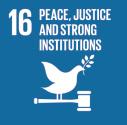


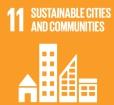
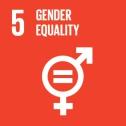
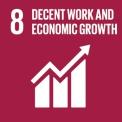

Dr. David Ogong
PatrickAyota CHAIRMAN, BOARD OF DIRECTORS
from 1 September 2024
MANAGING DIRECTOR
Consensus building across the Board, management, and throughout the Fund has been pivotal. We are defining concrete actions and expectations for each department to embed sustainability principles into their operations. Moving forward, our focus is on developing specific goals, initiatives, measurable key performance indicators (KPIs), and timelines aligned with our Vision 2035.This includes a rigorous assessment of risks related to data collection and analysis, critical for mapping out our roadmap and effectively executing our ESG metrics.
Recognising the complexity of our sustainability journey and the limited internal expertise, the Fund appointed an ESGAdvisor The advisor plays a vital role in accelerating our sustainability initiatives plus knowledge pass-over The responsibilities include (but not limited to) policy development, cultural evolution, establishment of a dedicated team, ensuring excellence in execution, and evaluation of our sustainability efforts.

Transition efforts
Fast-tracking our transition in critical environmental areas such as waste management and electricity is imperative.The Fund continues to monitor and assess its early steps in the ESG journey, aiming to recognise staff and departments adhering to these initiatives. Notably, our efforts in paper management and noise pollution management have been commendable.
Accountability permeates all organisational levels, prompting the integration of ESG criteria into departmental remuneration and performance standards. Our contracts now align with ESG metrics and the PPDAAmendmentAct 2021, reflecting our commitment to sustainability
The Fund started preparing for climate action funding opportunities in the past year. Once this is achieved, it could significantly support initiatives like the CarbonAcademy for COP29/30, aligning perfectly with our focus on both environmental and social well-being, particularly lives and livelihoods.
NSSF prioritises improving lives and livelihoods. Securing climate action funding aligns with this focus, potentially supporting impactful corporate social investments directly linked to the Fund's 2035 strategy, particularly the livelihoods programme.This broader commitment to social sustainability also extends to partnerships with organisations like Rotary International, a global institution driving social good in health, education, and livelihoods for over a century In the past year, the Fund made a strategic investment in the foundation of Uganda's economy, agriculture, by establishing the NationalAgricultural Marketing Company (NAMCO). NAMCO will empower farmers by connecting them with new markets and opportunities, driving job creation, food security, and financial inclusion at the household level.This paves the way for stronger families, increased resilience, and a savings culture that will secure a brighter future for generations to come.
As a certified sustainability professional, I collaborate with Board colleagues to enhance awareness and ensure a comprehensive understanding of sustainability. Management is tasked with developing a strategic plan that encompasses sustainability ESG criteria. Once established, this plan will guide our oversight, employing appropriate tools, implementation strategies, and stewardship to accelerate sustainability initiatives.
Awell-defined sustainability policy will provide the Board with a clear roadmap.This roadmap will outline what needs to be assessed, implemented, and delivered by management to achieve our sustainability goals. Once the policy is in place, management will report on sustainability initiatives with full transparency and guidance.
Oversight of sustainability is currently undertaken by ourAudit and Risk Committee. Given current legal constraints, our board charter does not provide for a dedicated sustainability committee.To address this, we are actively pursuing an amendment to the board charter to formalise sustainability governance, which is essential for supporting our 2035 strategy centred on sustainable practices. Failure to establish these structures risks undermining stakeholder confidence in our ability to effectively manage sustainability initiatives.
We recognise the impact our investments have on various stakeholders throughout our value chain. For example, in the case of NAMCO, we will assess whether farmers are practicing sustainable agricultural methods. We will also evaluate if their activities negatively affect the environment or society
Similarly, for our real estate portfolio, we will assess whether suppliers are using sustainable building technologies and the carbon footprint associated with those technologies.
The Public Procurement and Disposal of PublicAssetsAuthority (PPDA) has also emphasised the importance of integrating sustainability into public entity practices. We will adhere to these guidelines in our procurement processes. We have engaged KPMG to provide a historical view of our investments over the last decade.This assessment will analyse the environmental impact of these investments, informing remediation and future investment decisions.
Our employees are the heart of our success.This year, we expanded the Fund's Wellness Programme to prioritise their health and well-being. We also launched a mental health campaign, recognising its importance in overall staff wellness. The positive impact is reflected in employee satisfaction and the Fund's strong performance. We remain committed to ongoing initiatives that promote staff well-being and satisfaction.
The Fund is committed to raising its profile as a champion for sustainability. We will continue to demonstrate the resilience, purpose, and drive that have characterised our work for the past 4-5 years. We will not back down from this challenge; instead, we will build upon our successes and forge new partnerships, both within Uganda and internationally, to champion the need for sustainable social security provision and coverage for all. By putting our members at the centre of everything we do, we believe a secure social security journey is achievable for everyone.
Chairman of the Board,Dr. Peter Kimbowa
“A new day brings with it the promise of a brighter future for Uganda. At NSSF, we see this not just as an opportunity but as a call to action. By embracing inclusivity and fostering a culture of entrepreneurship, we can empower Ugandans to save for the future and unlock their full potential. Together with our strategic partnerships, we are building a more sustainable and prosperous future where the success of the Fund and the well-being of our members, society, and the environment are all inextricably linked. This is the essence of shared value, and it is the foundation upon which we will build a stronger, more resilient Uganda for generations to come.”

This year's Sustainability report reflects our commitment to building a future that benefits the Fund, our members, society, and the environment. We recognise that true sustainability hinges on a holistic approach, where financial success goes hand-in-hand with social responsibility and environmental stewardship.
Our initiatives remain firmly grounded in the UN Sustainable Development Goals (SDGs), particularly SDG 8 (Decent Work and Economic Growth), SDG 1 (No Poverty), and SDG 2 (Zero Hunger). We actively contribute to financial literacy programmes and create economic opportunities, particularly in the agricultural sector.
We acknowledge the potential disconnect between corporate sustainability reporting and the life experiences of the local population. While environmental considerations (SDG 13) are crucial, we prioritise social impact (SDG 8). We do not simply tick boxes; our actions are driven by a genuine commitment to the well-being of our planet, our people, and our communities.
Sustainability as a cornerstone
Everything we do at the Fund is driven by a clear purpose: an unwavering commitment of making saving a way of life while building a strong, prosperous organisation. We recognise the potential for growth in Uganda, and we are committed to using our resources to achieve both financial and social objectives.
Recognising the long-term impact needed to address societal challenges, we are rethinking and innovating our investment approaches.This dedication extends beyond traditional financial strategies. Our groundbreaking Hi-Innovator Programme exemplifies this approach. By directly supporting entrepreneurs, many of whom are working in agriculture, we are making long-term investments in Uganda's future.
Hi-Innovator provides them with the resources and mentorship they need to thrive, fostering economic growth and job creation.The programme's success, with UGX 706 M already generated in contributions, demonstrates the power of this approach. We are not only creating a new generation of business leaders but also empowering individuals to build a secure future and contribute to a more prosperous Uganda.
Our ambitious Vision 2035 targets 15 million members, representing 50% of Uganda's working population. Reaching this goal necessitates a focus on the informal sector, particularly in agriculture. We are dedicated to building a culture of saving within this segment by enhancing financial literacy and boosting earning potential.
Empowering farmers through market access and productivity
Agriculture plays a key role in achieving our goals. Many Ugandan farmers face challenges in accessing markets for their produce, limiting their income, and hindering their ability to save. NSSF is committed to tackling this issue. We will work to:
• Identify and connect farmers with reliable markets, both domestic and international, to ensure they receive fair prices for their crops
• Promote sustainable farming practices that enhance productivity and soil health, ensuring long-term agricultural sustainability
The Otuke Village experiment:Amodel for success
In the village of Otuke, we piloted a programme to empower rural women. We linked saving with opportunity by offering them a chance to acquire new hoes through the discipline of saving in their NSSF accounts. Over 6,306 women participated, exceeding their savings goals and collectively saving UGX 18.92 M.This initiative demonstrates the power of financial inclusion and goal setting in building a culture of saving.
At NSSF, we understand that a healthy workforce is a productive workforce. Our comprehensive wellness programme encourages annual health checkups, provides mental health resources, and promotes healthy lifestyle choices.This investment in our employees not only benefits the Fund but also equips them to be community leaders and agents of positive change.
In this report, we elaborate on our sustainability related ambitions, goals, and metrics, as well as our progress to date. We are actively developing a robust sustainability framework to guide our governance practices and promote regional sustainability initiatives.The Fund's Vision 2035 emphasises a greater commitment to impact partnering, exploring strategic partnerships that further propel our purpose. Our efforts are deliberate and focused on creating a measurable and meaningful impact beyond being just a social security provider but also a partner in our members' journeys.
At the Fund, we believe a brighter future for Uganda is a future where prosperity is shared. By empowering our members, particularly those in the informal sector, we are not only fulfilling our social responsibility but also creating a more sustainable and resilient financial ecosystem for generations to come.
Managing Director,PatrickAyota
At NSSF, sustainability is at the core of our mission. Over the past decade, we have focused on enhancing the value and security of the social security benefits for our 2 million+ members, as evidenced by our recent milestone of UGX 22.13Tn in assets under management (AuM).This achievement has allowed us to consistently deliver a minimum return of 2% above inflation on member savings, a performance validated by an 85% satisfaction rating.
As we transition from our 2015–2025 strategic plan to Vision 2035, financial inclusion will be a central pillar of our strategy. Our goal is to expand our membership coverage from 2 million to 15 million working Ugandans by 2035.This ambitious target will require a unified effort to protect both the business and natural environments, as well as the society we serve, through strong and transparent governance.
Our commitment to sustainability is embodied in our ESG principles, which guide us in integrating sustainability into every aspect of our operations.This approach enables us to champion environmental stewardship, social responsibility, and economic resilience.
NSSF is dedicated to minimising its environmental impact through innovative and proactive measures. We are focused on reducing greenhouse gas emissions, conserving energy, and promoting resource efficiency. Our real estate investments adhere to green building practices, ensuring energy-efficient and environmentally friendly developments.
By incorporating renewable energy sources and sustainable waste management practices, we aim to set a standard in the real estate sector that prioritises biodiversity and respects local ecosystems.
At the heart of our ESG-driven sustainability agenda is our commitment to social well-being. NSSF seeks to create value for both members and the broader community through initiatives that enhance education, health, and economic opportunities. Our Corporate Social Investment (CSI) programmes are designed to uplift vulnerable segments of society by investing in community development projects that provide access to clean water, sanitation, and healthcare.
Our Financial Literacy and Hi-Innovator Programmes support youth development by equipping them with skills for a sustainable future, ultimately fostering employment opportunities and ensuring our relevance and viability as a business. We also prioritise the welfare of our employees by maintaining a diverse, inclusive, and supportive workplace that encourages continuous learning, innovation, and growth.



Our sustainability efforts are overseen by a robust governance structure that ensures guidance, accountability, and transparency in decisions affecting our stakeholders, including members, employees, investors, suppliers, and the broader community
NSSF is committed to high standards of corporate governance. We invest in the skill development of our Board and Executive Management team to enableTrustees to fulfil their fiduciary duties. Our governance structures safeguard independence and prudence in decision-making, supported by experienced employees. We use a balanced scorecard framework to measure value-to-member and value-to-society, linking it to compensation and ethical standards. We exceed regulatory requirements by timely publishing our audited financial statements and subjecting them to public scrutiny during theAnnual Members' Meeting. Member feedback directly influences our governance decisions, ensuring our efforts align with stakeholder benefits.
Our approach to economic resilience emphasises sustainable growth, risk management, and value creation. By diversifying our investment portfolio across various sectors and geographies, we mitigate risks and enhance portfolio stability, ensuring consistent, long-term returns. Over the past decade, our investment portfolio has withstood various challenges, including the Covid-19 pandemic, which led to a significant increase in benefit payouts while maintaining stable returns for our members.


NSSF has prioritised commitment to the following SDGs:
The visual depiction of our strategy on the next page illustrates our approach to ESG and sustainability, which is premised on:
Identifying commercial opportunities to address ESG challenges
Identifying and responding early to ESG-related risks
Leading broader change by using our influence through collaboration across the value chain
The Fund is incorporating reporting frameworks, standards, and protocols into its sustainability strategy and reporting structure through an iterative, interconnected process.To enhance understanding of their interplay, the Fund will follow this process in the following order over the coming years:
By cohesively integrating these elements, we will enhance the credibility, transparency, and impact of our sustainability reporting, driving positive change toward a more sustainable future.
With guidance from our ESG advisor, we will continue to evaluate our current structure and sustainability strategy during FY2024 to ensure they are fit for purpose going forward.This will involve conducting a gap analysis to identify areas needing improvement for compliance with the standards.
We will adopt the recommendations on reporting and progressively implement them over the next few years to ensure our sustainability reporting accurately reflects our strategy and the value we aim to provide to our customers.The next steps are:
1. We will adopt the Integrated Reporting Framework along with the ISSB standards of IFRS S1 and IFRS S2. These standards will guide us in preparing and reporting our sustainability-related financial and climate disclosures.
2. We will conduct a materiality assessment to determine what is material, reassessing materiality judgments at each reporting cycle. This process will help us identify sustainability-related risks and opportunities that could reasonably impact our business model and strategy.
3. We will disclose the process we follow to determine these risks and opportunities, as required by IFRS S1.
Conduct a materiality exercise to link sustainability initiatives with business benefits.This will involve engaging internal and external stakeholders to identify and prioritise issues relevant to the Fund's business.Additionally, collaboration across departments will be essential to achieve bold commitments aligned with the strategy
Select a sustainability reporting framework that aligns with our strategic goals, stakeholder expectations, and industry context.
The Fund has reviewed the ESG consultant's recommendations for the next materiality assessment and is preparing for the upcoming reporting cycle while working collaboratively with its departments.
To date, the following frameworks and standards have been adopted:
• King IV Report on Corporate Governance for SouthAfrica TM (King IV )
• Integrated Reporting Framework
• Global Reporting Initiative (GRI standards)
• Sustainable Development Goals (SDGs)
• International Financial Reporting Standards (IFRS)
• Task Force on Climate-Related Financial Disclosures (TCFD)
Identify the relevant standards, both universal and industryspecific, to capture and report material sustainability issues.
After discussions with the Consultant, the Fund has identified and adopted the relevant reporting standards.Additionally, the Fund will engage with its Regulator and industry stakeholders to initiate discussions on developing industry-specific standards to support the creation of a reporting framework within Uganda.
Implement the appropriate protocols to measure, monitor, and report sustainability performance in alignment with the selected framework and standards.
This is ongoing following the adoption of the IFRS S1 and S2 standards.
In 2023, climate change continued to impact people and ecosystems globally, with extreme weather events affecting Uganda as well. Every business has a role in mitigating risks to both people and the planet. Over the next 24 months, we aim to accelerate our performance, targeting a 13.58% reduction in GHG emissions compared to the 2024 baseline assessment. Climate change presents both material risks and opportunities for us. We utilise theTask Force on ClimateRelated Financial Disclosures (TCFD) methodology to assess and disclose our climate risks and opportunities.

In 2024, we started on baseline external assessment to ascertain the Fund's Net Zero Roadmap (see the next report issue) to set out how we plan to meet our net zero commitment by 2050. Guided by the Roadmap, we shall be transforming our business model to deliver reductions in GHG emissions across all three Scopes of our activities, according to the criteria approved by the Science BasedTargets initiative (SBTi).
Adetailed analysis of our GHG emissions will be published within the next 12 months as part of our baseline assessment. To address our Scope 3 emissions, we will develop a comprehensive strategy focused on reducing carbon emissions from logistics and enhancing collaboration with suppliers, stakeholders, and communities to promote regenerative agricultural practices.
For Scopes 1 and 2, which cover emissions from our own operations, our primary strategy will involve increasing energy efficiency and transitioning to renewable energy sources. We will also establish near- and long-term science-based emissions reduction targets with the SBTi, aligned with our Vision 2035 goals.
Furthermore, we have identified five sustainability drivers which are based on assigning value to the capital assets we depend on for our economy and society to flourish, as they are all interdependent. Our sustainability drivers are embedded in our strategy and are focused on ensuring sustainability for our business, our customers, communities, society, the economy and the environment.

Good corporate governance is implemented in an integrated manner, promoting an
effective control and legitimacy
Customer satisfaction
For the Fund to be sustainable, customer-centricity is at the core of everything we do. Building long-term relationships with our customers is central to our growth strategy and organisational values.
Our approach
To ensure a high-quality customer experience, we focus on three key needs: effective planning, empowering members with choices, and making them feel valued.This approach enables us to offer personalised and high-value services. Every aspect of our operations and initiatives influences our customers' perception, whether it is addressing operational issues, introducing new products, or fulfilling our mandate.To deliver an exceptional customer experience, we work collaboratively across the entire organisation, continuously striving to improve and enhance every step of our customers' journey

Our customer experience policy contributes positively to the Sustainable Development Goals (SDGs) as illustrated in our report.
Strategic objectives
Our key objectives for FY24 included:
•
We create value by building strong connections with our customers and the public, ensuring positive experiences in all interactions to make saving a way of life. We invest in innovations to provide accessible, empathetic, and inclusive services, especially for those facing challenges accessing Fund services or with complex needs.
We engage customers through various channels, including digital solutions, contact centres, branch networks, outreach centres, and Relationship Managers. Our Member Services Section, which includes Customer Experience, Benefits and Data, and Service Quality Units, helps us turn resources into valuable outcomes that meet our strategic goals and benefit our customers.
We focus on different segments to build connections and provide tailored solutions for outstanding customer experiences, generating revenue and building long-term trusted relationships. We are dedicated to:
• Continuously improving our services for higher customer satisfaction and delivering the best experience
• Treating customers fairly, communicating transparently, and providing timely services that respect and reflect their diversity
• Keeping our promise to improve lives by offering simplicity, convenience, speed, safety, accuracy, and clarity
To enhance customer connections and experiences, we conduct regular surveys, analyse complaints, interact directly, and use data from customer transactions. While we are making progress in improving our service levels, we recognise and are always ready to address areas that need improvement to meet our mandate.
Our key material areas to creating value for our customers
Key member and customer concerns
• Simplicity and convenience
• Speed, safety and accuracy
• Benefits that matter
• Clarity of offerings
Material areas
• Offering personalised services and promoting financial literacy
• Automating processes and driving innovation
• Communicating all available options while ensuring KnowYour Customer (KYC) compliance
• Enhancing collaboration between front-end and back-end teams
• Continuously empowering our employees to provide excellent and consistent service
…to achieve the following value
For our customers
• Simple, efficient, and innovative service solutions
• Safe, trustworthy, and accountable provider
• Timely benefits payments
• Competitive returns
• Empowering customers' financial decisions
• Clear offerings through engagement
For our Fund
• Better customer experience and satisfaction
• Higher Net Promoter Score (NPS)
• Better service quality
• Improved service level and efficiency
• Enhanced customer trust and support
• Increased membership
During the year, we embraced fast, effective customer experiences by fostering an environment that encourages curiosity, digital thinking, and continuous improvement. Leveraging innovation and our commitment to delivering high-quality services, we are poised to empower individuals, businesses, and communities across Uganda and internationally. Our improvements and innovations have enhanced both our operations and the customer experience.
TobiasAnok
“ I checked in ✔ at NSSF Headquarters last week, man, I was welcomed like a big person...Those people, from the entrance to your destination and back, are the true definition of public officers. «««««”
Customer education on digital channels and DIY
We emphasised educating our customers about our online platforms and promoting a Do ItYourself (DIY) approach to enhance accessibility and usability. Our "Chap Chap" promotion, launched this year, encouraged customers to use our self-service channels anytime and anywhere. This initiative led to a 55.9% increase in digital channel usage, achieving the following outcomes:

This year, 18,489 (44.8%) customers used our NSSFGo mobile app, web app ( and digital https://nssfgo.app/landing) forms to apply for benefits. We also introduced an Emigration Grant portal for non-Ugandans.The online application system has streamlined verification processes, cutting benefits turnaround time and printing costs.This improvement enhances self-service options for members and speeds up service at walk-in centres.
We continued to enhance our processes and systems to improve efficiency and customer experience.These enhancements include upgraded our NSSFGoApp for easier access to services and stabilised our email and tollfree Interactive Voice Response (IVR) to reduce turnaround times, and cost-saving measures.These improvements support better self-service options for our customers, improving our customer experiences and processes.
Customer testimonial
“Thanks @nssfug, this efficiency is incredible, and there's no need to sign here or there! Online claim application responded to within 48 hours. Let's share this positive performance more often. Well done! “

Customer testimonial




“The NSSFApp is now user-friendly, thanks for the upgrade! “
Since launching our enhanced Whistleblower Portal, we have received reports from 2,650 customers about noncompliant companies.The improved portal, accessible via the NSSF website: and https://whistleblower.nssfug.org/ NSSFGoApp, is interactive and ensures anonymity, allowing easy reporting of non-compliant employers. Of the reports, 35% (928 cases) resulted in audits or demands for payment of employee contributions.The portal tracks and addresses cases until resolution and allows Government Labour Inspectors to report employers failing to remit mandatory contributions. We encourage everyone to use this portal as part of our digitisation strategy for efficient self-service.
In the past year, we processed benefits for 42,901 customers, a decrease from 46,337 the previous year. We disbursed UGX 1.12Tn, with an improved average processing time of 10.1 days, down from 11.9 days. Our benefits payouts improve our customers' quality of life and help them achieve financial stability
We proactively reached out to over 31,558 customers to address their complaints and benefits issues, strengthening connections and relationships. We also enhanced our automation efforts, including employer registrations and 1.37 million contribution reminders.


Pascal Bisimiwa
“Good morning Dear NSSF team. I am back to you to inform that I have received the payment from you.I humbly submit my thanks to all the lovely team for the great work, especially to Lawrence,Aaron, and others that I don't know who contributed for this case to be issued. Thank so much .I can't fail to thank the government of Uganda for whatever it’s doing to and for refugees. Only GOD will pay Uganda and Ugandans for their kindness. Be blessed.”


“ Ahuge positive shout out to @nssfug.The process to withdraw benefits was seamless, painless, efficient and fast!!! #recognizingexcellence.“
To address the growing financial challenges faced by our members, our free Financial Literacy programme offers essential guidance for building financial well-being. We also engaged our customers in partnership with Stanbic Bank, ICEALION Insurance, UAPInsurance, and Jubilee Insurance.
We introduced anAI-driven financial literacy agent at available https://finlit.nssfug.org/, in English, Luganda, and Swahili, and launched ourTikTok channel (@nssfug).
This year, we directly engaged 25,447 customers through initiatives such as the MakeYo Benefits Count campaign, live webinars, and town halls.
Engaging 317,955 users and reaching 3,301,378 through targeted content.
On 25 September 2023, the Fund held an interactiveAnnual Members Meeting (AMM) in line with our commitment to transparency and accountability to NSSF members, stakeholders, and the public.This annual event, a key highlight for the Fund, attracted NSSF partners and contributors.
The meeting featured updates from Fund management on social security trends, operations, and future initiatives, emphasising our mission to make saving a lifestyle.The Board of Directors also presented the Fund's performance and plans for the financial year, engaging with attendees in an interactive forum.
The event was conducted in a hybrid format, accessible via our online platforms, television, and social media channels.

“I received a good response from a good customer service lady this evening on my phone , and I do appreciate your help. Thanks so much! “ Customer testimonial
“How did I miss this important lifestyle discussion? Thank you so much for this valuable information that you never learn from the workplace or school .”

The event generated 82 stories
across Print, Radio, andTelevision, 45% coverage on Radio
We achieved 3,857,963 impressions surpassing our target of 2,000,000
Interest was computed and credited to 2,168,210 member accounts
We recorded 11,365 live views of the event, slightly down from 12,909 the previous year, engaging more than 900,000 customers
We are strategically leveraging members' needs and opportunities presented by the NSSFAct to enhance their lives. By investing in innovations and forging strategic partnerships, we aim to boost members' saving capacity and willingness.
As a responsible corporate citizen, we are committed to creating sustainable value for our members, stakeholders, and society
While we have made notable progress in certain areas, we acknowledge that we still fall short of our goals in some aspects, particularly regarding benefits turnaround time (TAT) and our people. We are actively working to address these challenges and improve our overall customer experience.
Below is an extract from the CSI report about what our members are saying.
Customer testimonial
Thanks so much NSSF for being so transparent this time in what you do. We appreciate you so much! “


Inability to access funds when needed, especially during emergencies, is a source of frustration.
There is a level of uncertainty and concerns about the future performance of NSSF
Delays in accessing survivors benefits of deceased members due to long waiting times can be frustrating.
Need for more flexible terms regarding benefits access, reducing the age or time restrictions for accessing a portion of their savings.
To achieve a 95% customer satisfaction rating by 2025, we have:
• Invested in multi-skilled employee training to enhance service and resolve queries faster, breaking down internal barriers
• Focused on leadership development, including benchmark visits and specialised training, such as culture of excellence for our customer experience teams
• Continuously reviewed and aligned our processes with our digital transformation goals
• Collaborated across various departments - Commercial,Technology, Marketing, Legal, etc. - to identify and address service gaps promptly
• Conducted root cause analyses to resolve recurring customer issues
• Implemented a hybrid work model for our contact centre to offer flexible work arrangements
• Expanded the use of big data to better understand customer needs
• Mapped our KYC journey to improve service request turnaround times
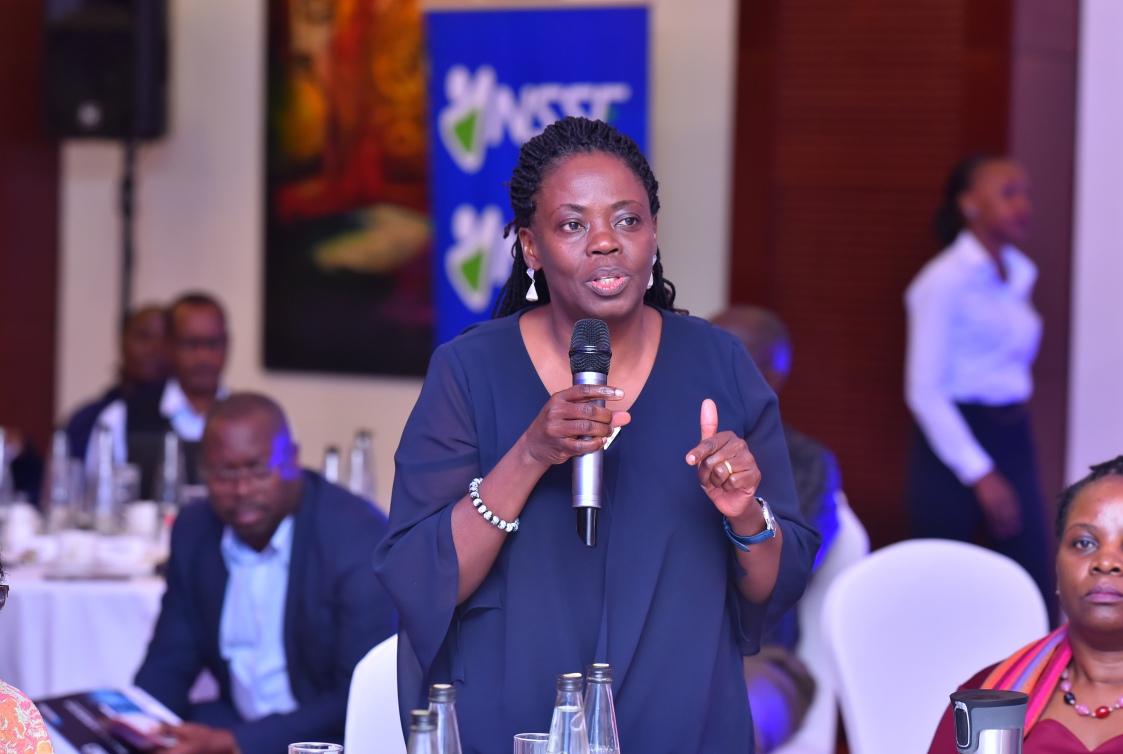
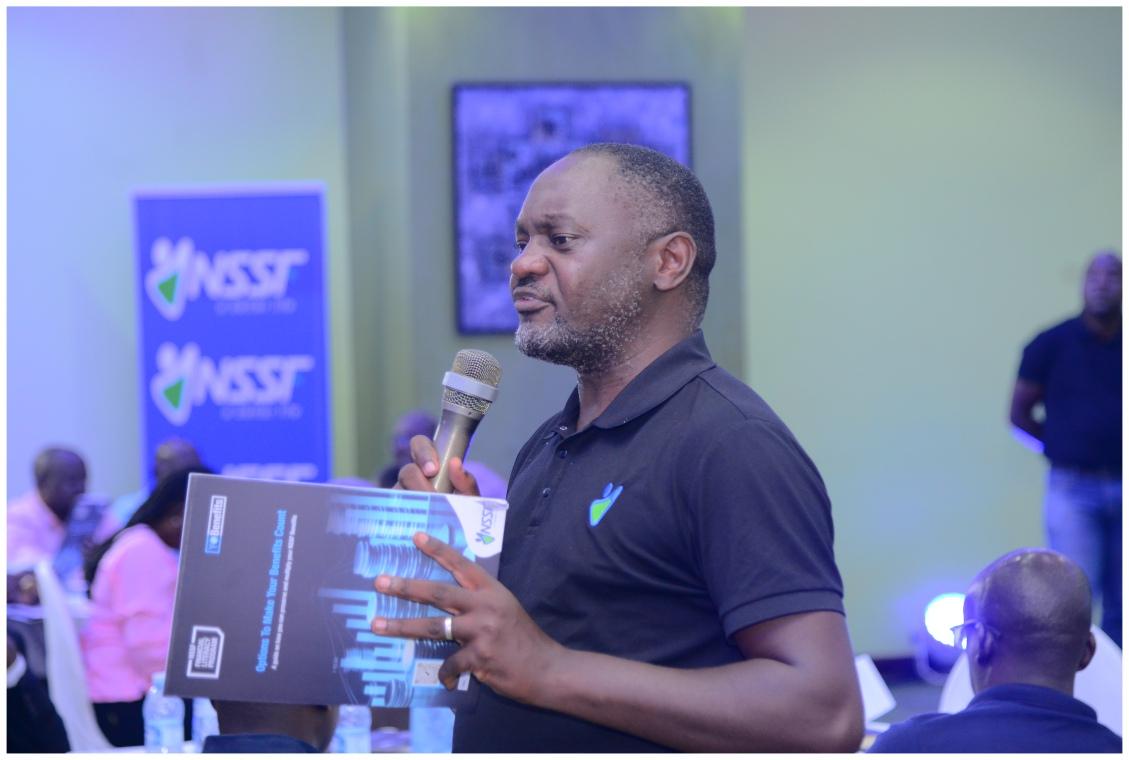
We recognise the need to improve customer satisfaction, service levels, and benefits turnaround times and are actively developing strategies to achieve these goals and enhance the lives of our members.
We understand that customers seek solutions to their problems, not just our products.Therefore, we are committed to developing smarter solutions and connectivity services that deliver real outcomes.
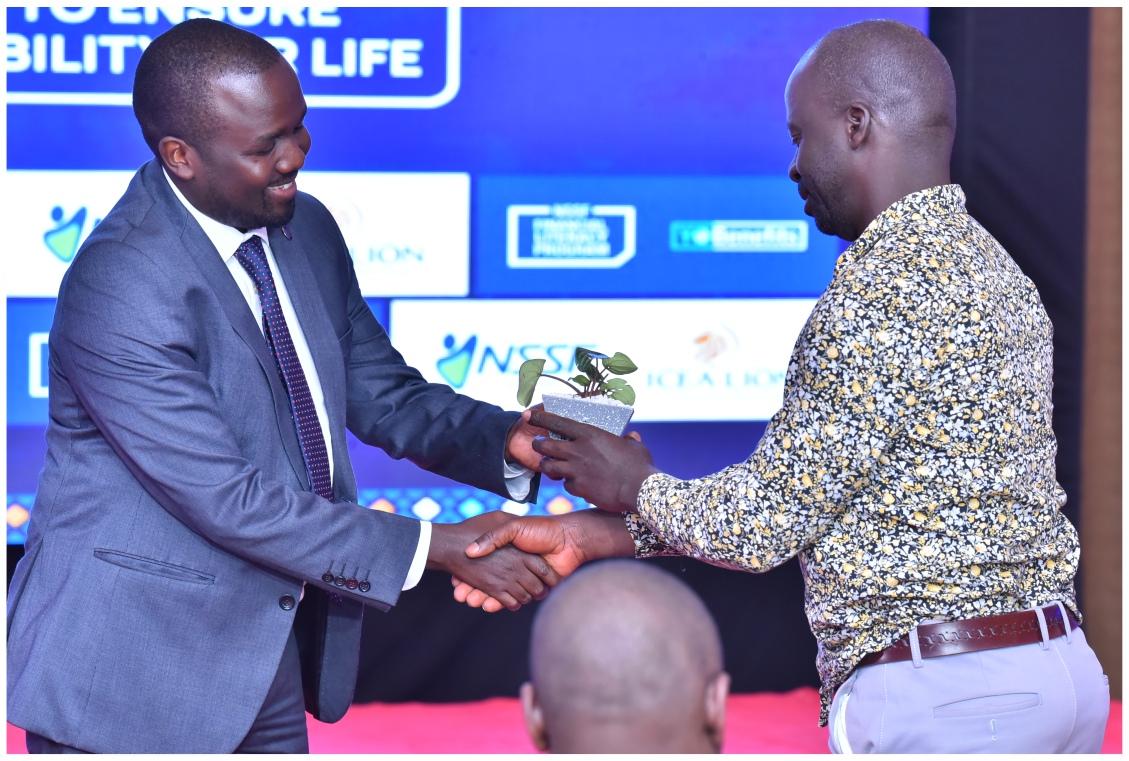

Our focus moving forward includes:
• Maintaining and enhancing customer satisfaction: We will strive to keep experience and satisfaction levels high and continually personalise the customer experience
• Supporting new products and services: In the short to long term, we will focus on rolling out new offerings related to voluntary savings, leveraging customer needs and opportunities from the NSSFAct Cap 230
• Improving processes and promoting digital channels: We will enhance our processes and solutions while encouraging the use of digital channels to improve convenience and interactions
• Conducting a KYC campaign: We will initiate a campaign for customers to update their global identifiers, such as National ID Numbers, refugee, and passport numbers as part of improving service delivery

Leverage opportunities resulting from the new law to develop new products and services for our customers to meet individual needs for both long- and short-term savings, for example, creating a unit trust
Changing the
Our social responsibility focus is the continuous development and well-being of our people and creating an environment conducive within which to thrive and champion our deliberate Corporate Social Investment (CSI) interventions to:
• Reduce poverty
• Increase employment opportunities
• Promote financial literacy
• Improve health and well-being
• Improve access to quality education
Our approach
Our employees are the cornerstone of our success. We are dedicated to creating a workplace where they feel valued, supported, and empowered to contribute meaningfully. Our human capital strategy prioritises the entire employee journey—from attracting top talent to fostering engagement and providing comprehensive support through our total rewards programme.

At NSSF, strong stakeholder relationships are key to sustainable development and business success. We foster collaborative partnerships to seize opportunities, manage risks, and address challenges responsibly
Our commitment to openness and inclusivity ensures that diverse stakeholder perspectives are integrated into our operations, enabling us to deliver exceptional services and maintain long-term resilience. Continuous engagement helps us understand and meet stakeholder needs, enhancing the quality of life in the private sector and strengthening the social security safety net. By prioritising ESG principles, we create sustainable value and ensure transparency and accountability in all our interactions.
NSSF seeks to create value for both members and the broader community through initiatives that enhance education, health, and economic opportunities. Our Corporate Social Investment (CSI) programmes are designed to uplift vulnerable segments of society by investing in community development projects that provide access to clean water, sanitation, and healthcare.
Our Financial Literacy and Hi-Innovator Programmes support youth development by equipping them with skills for a sustainable future, ultimately fostering employment opportunities and ensuring our relevance and viability as a business.
Strategic objectives
Our key objectives for FY24 included:
• Occupational safety and health: Emphasis on safety and health of employees
• Employee well-being: Employee well-being:Target 95% staff satisfaction rate
• Employee wellness: Wellness initiatives to encompass physical and mental well-being of our employees
• Financial literacy training:Target online reach of 12,700
• Improve learning conditions in public schools: Target raise UGX 1Bn for school refurbishment or refurbish 5 number of schools
• Preparing students for the job market: Reach 4,000 number of students or universities through the Career Expo
• Employee retention and succession planning
• Employee training and development

“As we step into a new day at NSSF, our focus is on creating shared value that drives sustainable growth. Our success is deeply intertwined with the overall well-being and engagement of our employees, the backbone of our achievements. This year, we are dedicated to fostering a culture that empowers every individual, ensuring that our workforce is well-equipped to meet the evolving needs of our members and stakeholders.”

Nurturing talent for a brighter future
In line with our vision of shared value, we remain dedicated to the professional development of our employees.The initiatives we have implemented over the past year have set the stage for even more focused programmes designed to enhance functional skills, leadership abilities, and innovation within our teams. Our commitment to continuous learning is not only about fostering individual growth but also about equipping our employees to lead NSSF into the future.
This year, we launched several key initiatives to empower our workforce.These initiatives include manager coaching, cross-functional collaboration through agile projects, HR training for non-HR managers, and strategic partnerships that offer employees opportunities for growth. By investing in our people, we are cultivating a resilient and adaptable workforce, prepared to meet the challenges of today and tomorrow
Strengthening employee engagement
Employee engagement is a top priority as we work to create a workplace where every voice is heard and valued. Our recent satisfaction survey revealed both strengths and areas for improvement, steering our efforts to enhance inclusivity, support, and innovation. By promoting open communication and collaboration, we aim to not only engage but also inspire our employees to contribute to NSSF's long-term success.
Acommitment to shared value
At NSSF, we recognise that creating shared value goes beyond financial metrics, it is about fostering emotional connections and making a positive impact on our employees, members, and the broader community.As we advance, our focus will be on harnessing the strengths of our diverse workforce to drive innovation and sustainable growth. Each day presents an opportunity to make a difference, and together, we are committed to building a brighter future for everyone.
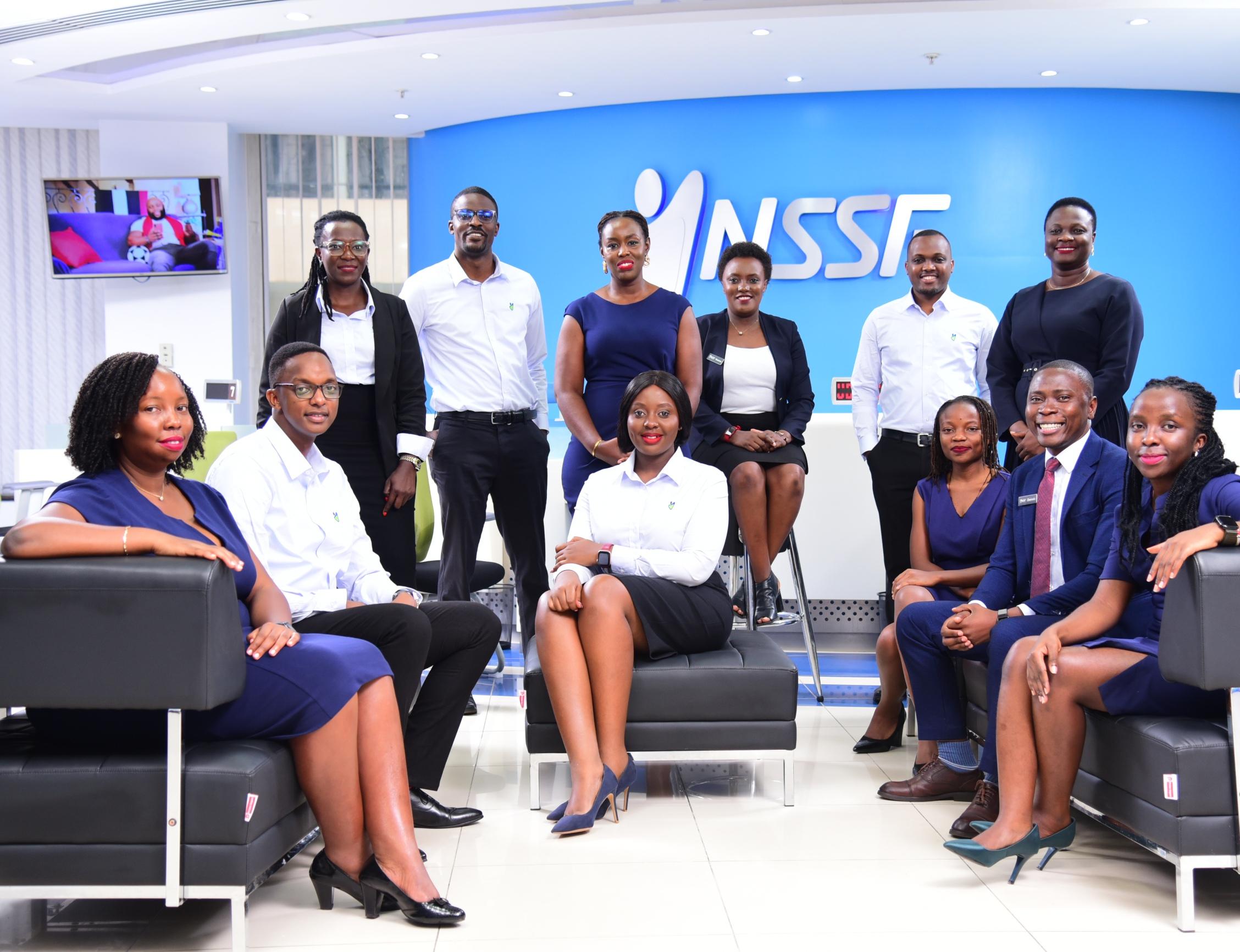
As we progress under the theme “ANew Day - Creating Shared Value for Sustainable Growth,” we remain dedicated to empowering our employees, fostering innovation, and driving sustainable success.The path ahead is rich with opportunities, and with the commitment of our talented workforce, we are confident in our ability to achieve our goals and deliver lasting value for our members and stakeholders.
Our employees are the cornerstone of our success in serving our members.Their creativity, dedication, and integrity form the foundation of our Fund's achievements. We are committed to creating a workplace where our people feel valued, supported, and empowered to make meaningful contributions to our mission. Our work environment is integral to our human capital strategy, which focuses on the entire employee journey— from attracting and retaining top talent to fostering engagement and offering comprehensive support for our employees and their families through our total rewards programme at every stage of life.

In our ongoing commitment to ensuring a safe and secure work environment, the Fund placed significant emphasis on Occupational Safety and Health (OSH) during the year
Key initiatives and outcomes
Defensive driving training:Approximately 600 Fund employees, including members of the Executive Committee (EXCO), participated in defensive driving training fromAutomobileAssociation of Uganda Consultants.
This initiative was launched in response to a concerning increase in accidents involving both Fund and private vehicles. Since the training, we have seen a significant reduction in accidents, highlighting the programme's effectiveness.
Safety measures for branches with lake operations: Our branches near Lake Bunyonyi in Kabale and Lake Victoria in Masaka have each been equipped with two pairs of life jackets.This provision is designed to mitigate the risk of drowning and enhance the safety of our employees working in these locations.
Risk vulnerability assessment: Aprofessional risk vulnerability assessment was conducted by the Uganda Police for all Fund offices and branches.The assessment identified several weaknesses, which we are actively addressing to enhance security and safety
Occupational safety and health audit: Our OSH Champions conducted a comprehensive audit across all Fund work areas, identifying several hazards that require attention. We are actively working to mitigate these risks to enhance workplace safety
At the Fund, we are dedicated to cultivating a wellness culture that prioritises both the physical and mental well-being of our employees. We launched a series of initiatives to promote healthy lifestyle habits during the year These efforts have yielded significant positive outcomes, including improved employee engagement, better health, individual empowerment, increased awareness of healthy living, reduced sick leave and absenteeism, higher productivity, enhanced teamwork, a growing wellness culture, and an overall healthier workforce.
• Step challenge (“Walk to Paris”): From October to December 2023, we organised the "Walk to Paris" step challenge to encourage physical fitness and teamwork.The event saw enthusiastic participation from 85% of our employees, including nine members of the Executive Committee.
• Wellness Champions: We appointed Wellness Champions to lead by example, inspiring their colleagues by sharing pictorials and videos of group workouts. Currently, there are over 40 active Wellness Champions across various departments.
• Fitness and gym encouragement: Employees are encouraged to regularly visit gyms and fitness centres to participate in activities such as gym workouts, swimming, steaming, sauna sessions, and aerobics.This benefit has been highly utilised by our employees.
• Annual health camp: During the annual staff conference, employees received comprehensive health check-ups.These included BMI measurements, blood pressure monitoring, random blood sugar tests, optical and dental exams, voluntary HIV counselling and testing, physiotherapy sessions, and doctor consultations.
• Mental health and counselling support: We actively promoted counselling services and mental health support for employees and their dependents. We held four counselling seminars covering topics such as handling relationships, thriving in marriage, managing children and teenagers, and men's mental health.
• Employee wellness townhalls: Conducted by the company health advisors to promote healthy living habits.
• Healthy meals servings: Provided healthy meals options for employees in the cafeteria.
• Personalised doctor advisory: Personalised health advice for colleagues with high-risk health conditions, delivered by company health advisors.
• Weekly wellness communication: Circulated weekly tips on healthy living, counselling, parenting, and overall well-being.
• Health awareness and celebration of health days: Sensitised staff and celebrated key health days such as World Cancer Month, WorldAIDS Day, World Mental Health Day, World Breastfeeding Week, and others.
• Dependent care support: We provided onsite childcare facilities, supporting 70 babies, and celebrated mothers with a special Mother's Day Dinner at the Protea Hotel.Additionally, we established a resource centre in the crèche for mothers to borrow parenting books and trained employee helpers in first aid to manage emergencies at home.
• Workstation health visits: Our company health advisors conducted visits to all employees at their workstations, offering extensive sensitisation on healthy living.They assessed the quality of staff meals, inspected food providers across the branch network, and evaluated the medical facilities frequently visited by employees.
• Launch of the NSSF WellnessApp: Developed internally by theTechnology team to monitor staff well-being.
• Medical Board initiatives:The Medical Board reviewed and recommended health and wellness solutions to further promote the wellbeing of Fund employees.

Employee engagement and communication
Employee engagement
Our approach to employee engagement focuses on creating an environment where employees feel valued, informed, and connected to our organisational goals. In FY2023/24, we emphasised meaningful involvement and commitment beyond mere job satisfaction.
The annual Employee Engagement Survey is central to our strategy, providing a platform for employees to share their thoughts and feedback.This input guides our leadership in aligning strategies and policies with employee needs and aspirations.
This year, the overall employee satisfaction rate was 89%, an increase from the previous year's 86%.These results reflect a powerful sense of belonging and active participation in the Fund.
Additionally, our management team undergoes a 360-degree review process, enabling employees to offer feedback on leaders, peers, and direct reports.This ensures continuous improvement in management effectiveness.
Our engagement efforts also include various activities designed to build connections, foster open dialogue, and strengthen our sense of community within the Fund.
• Managing Director's Town Halls: Employees are updated on key business issues and given the opportunity to ask questions, promoting transparency and alignment across the Fund.
• Team building activities: Frequent team-building events help employees interact outside their daily routines, strengthening bonds and fostering collaboration.
• Human resource roadshows: Our Human Resource Business Partners periodically visit all branches to connect with employees on a wide range of issues, ensuring that every employee feels heard and supported.
• Annual Staff Conference: Akey event where management communicates essential information to all employees in a collective setting, reinforcing a sense of unity and shared purpose.
Our commitment to a positive work environment is built on trust, transparency, and teamwork. Effective communication is integral to our culture, and we utilise various online platforms to facilitate open dialogue, allowing employees to share insights and concerns.
Our intranet provides daily updates on Fund operations, reinforcing our dedication to valuing every voice and fostering thriving relationships. Our policies are clear, accessible, and reviewed every two years to ensure legal compliance and alignment with our strategies.
Our core philosophy centres on authenticity, valuing every individual, and fostering a sense of belonging. We are committed to building a diverse and inclusive workforce where equity is fundamental.This commitment is evident across all levels of the Fund, providing opportunities for individuals of all backgrounds, including diverse cultures, faiths, ethnicities, abilities, genders, and ages.
Our workforce has grown to 605 employees (up from 579 in FY2022/23) due to new hires, with turnover reduced to 3.4% from 6.5% last year, reflecting stability after our organisational redesign.
At the Fund, equal opportunity and gender equality are actively pursued. Women represent 47% of our workforce, with 25% in managerial roles. Recruitment, promotions, and training are based solely on individual merit, rejecting any form of discrimination.
The Fund offers market-competitive compensation and benefits, guided by principles that ensure equity and effective governance. Our approach emphasises pay-for-performance practices to attract and retain top talent.
Additional benefits include medical and life insurance, leave concessions, gym memberships, and a retirement benefits scheme, among others.
In FY2023/24, no incident of discrimination or violation involving human rights was recorded. In this regard, the Fund has the following policies:
• Anti-sexual harassment policy
• Anti-discrimination policy
At the start of each financial year, we set clear, measurable performance targets at organisational, departmental, and individual levels.These targets align with the Balanced Scorecard perspectives: Financial, Customer, Internal Processes, and Learning and Growth.This alignment helps employees understand expectations and focus on key areas driving success.
The Fund is dedicated to cultivating a culture of performance excellence, ensuring every employee is aligned with our strategic vision and empowered to reach their full potential.
At the Fund, fostering a culture of excellence is key, and talent retention plays a crucial role in this objective. We are committed to attracting, recruiting, and retaining top talent to ensure exceptional service for our members.
For FY2023/24, the average employee tenure has risen to 9.4 years from 8.9 years, reflecting our success in maintaining a stable and experienced team.Additionally, 72% of our employees have been with the Fund for 5 or more years, underscoring the effectiveness of our retention strategies.
We also reward long-term service, exceptional performance, and significant achievements to further encourage loyalty and commitment.

We believe the Fund's growth is closely tied to the development of our employees. Understanding that an organisation can only progress as far as its talent allows, we are committed to nurturing and expanding employee potential.
Our development approach starts with a comprehensiveTraining NeedsAnalysis (TNA) to assess current skills, identify gaps, and align training with our strategic goals.This ensures our programmes are relevant and targeted, addressing both individual and organisational needs.
To support career and performance growth, we offer in-house coaching programmes where employees receive personalised guidance from trained internal coaches.This helps them navigate their career paths, set goals, and enhance performance.
Additionally, we host monthly Pathfinder Career Conversations with industry professionals to provide insights on career and leadership topics.These sessions foster personal and professional growth by exposing employees to diverse perspectives and real-world experiences.
The Pathfinder CatalystAcademy is dedicated to empowering women, offering structured development to enhance leadership skills, build confidence, and impact both the Fund and beyond.This initiative promotes diversity and inclusivity, aligning with our commitment to supporting female employees in their leadership journey.
Our leadership development programmes focus on global best practices and innovative strategies through workshops, seminars, and interactions with international thought leaders.This prepares our leaders to effectively drive the Fund's strategic vision.
Our eLearning platform, Percipio, plays a crucial role by offering personalised learning journeys, professional courses, and various resources, including certification programmes and audiobooks. We encourage employees to utilise Percipio to address skill gaps and stay prepared for future challenges.
While we provide these resources and opportunities, we recognise that the drive to learn and grow must come from everyone. Our role is to offer support and tools, but personal commitment to development is essential.
Social protection systems serve as essential tools in reducing poverty and providing a safety net for vulnerable individuals and communities. By offering support and resources, they promote well-being and contribute to a more equitable society



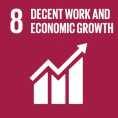
The Fund's CSI interventions revolve around four social security areas, namely:
• Youth: The youth constitute a substantial part of the Fund's current membership and represent most potential future members.This demographic also includes a significant segment of the student population, who are potential future members of the Fund.
• Education: The importance of accessing quality education, particularly for disadvantaged groups in our communities, is paramount. Ensuring the provision of quality education requires a comprehensive approach, allowing us to identify specific areas for targeted focus and improvement.
• Health: The demand for health services has become increasingly urgent as a sizeable number of our members and the communities in which we operate face financial constraints that limit their access to healthcare. Moreover, the existing health facilities and services are insufficient to cater to the growing population's needs.
• Disadvantaged groups: Orphanages, terminally ill, special needs children.
A new day for NSSF signifies an opportunity to identify and leverage existing financial opportunities to improve the quality of coverage that we afford our members, while also acting as agents of societal change.
Achieving this balance is possible through the concept of shared value, where business practices contribute to sustainable development and community well-being. At NSSF, we are making significant strides in this direction, with social impact (SDG 8) embedded in our core business practices. This is driven by robust investment strategies, innovation, corporate governance, and community engagement initiatives that improve the livelihoods of the communities we serve.

Our investment portfolio is designed to ensure sustainable long-term growth, balancing risk and return while contributing to national development.The Fund invests in real estate, fixed income, and equities, with a strong focus on projects that drive economic growth and create jobs. Our financial value proposition to our 2.5 million members has been instrumental in driving the rapid growth of our asset base, which now exceeds 20Tn shillings, solidifying our position as EastAfrica's leading social security provider
Aligned with our Vision 2035, which seeks to expand social security coverage to the working population, we are leveraging opportunities presented by the NSSFAct Cap 230 to develop products targeting the informal sector. Innovation is central to this strategy, driving our efforts to create shared value and improve our value proposition to our members.To achieve this, we put research at the forefront of product development and innovation.
Through comprehensive research, we identify challenges and opportunities to make informed decisions on product innovation.This ensures that we improve our value proposition and sustainable growth to our members through their savings. Research findings are disseminated both externally and internally to our employees.
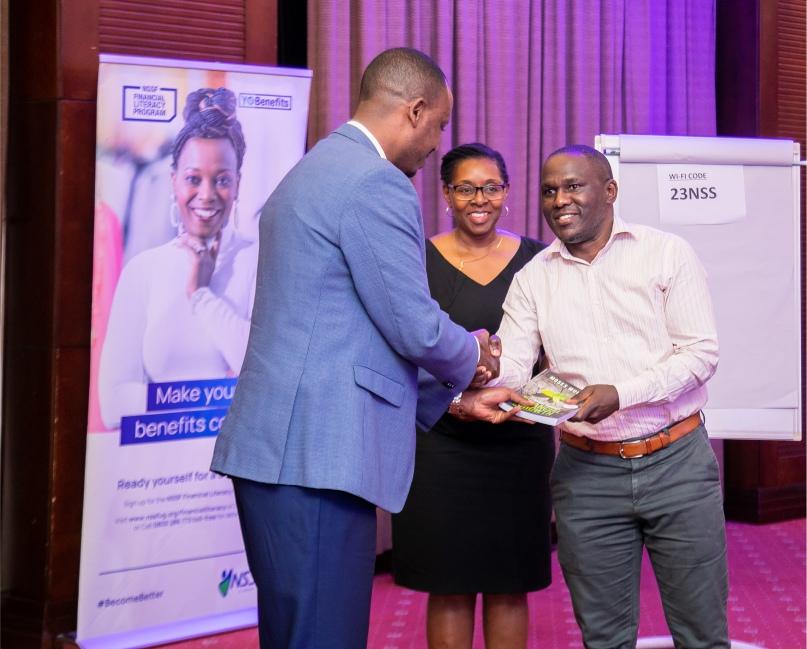
Over the years and building on results from our research findings, we have implemented innovative strategies to address societal challenges and ensure the long-term financial security of our members. Discovering that 80% of NSSF beneficiaries deplete their savings within two years, we introduced the financial literacy training programme to empower both members and non-members with the knowledge needed for informed financial decisions.This programme is executed both physically and virtually for flexibility. Last year, we are proud to note that 25,447 people benefitted from these trainings.To date, 559,092 members have been trained.
Community engagement and social impact
Beyond financial returns, our efforts dedicated to creating a positive social impact focusing on community initiatives in the health and education sectors. Understanding the complexities of corporate social investment as a pension fund, we use strategic partnerships to improve our members' and communities' lives.
Stakeholders are at the heart of our CSI initiatives. We prioritise transparency and integrity in all actions, ensuring our interventions achieve the desired outcomes.
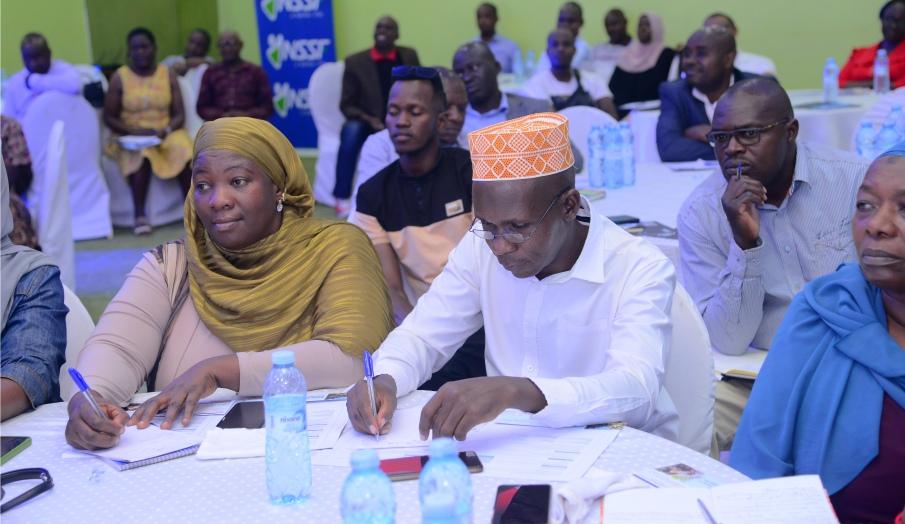
In partnership with Housing Finance Bank and NBS Sport, we hosted the 5th edition of the Kampala Hills Run, our flagship charity event.This annual event, which promotes health and fitness, underscores NSSF's commitment to education, a critical pillar for sustainable development.
The event took place at Kololo grounds and attracted over 7,700 participants.Atotal of UGX 990 M was raised, with UGX 421M in cash.These proceeds were used to refurbish four schools across the country: Kithoma Primary School in Kasese, Oreku Primary School inArua, Wangale Primary School in Butaleja, and Karongo Primary School in Hoima.The success of the event ensured that the benefits extend far and wide, significantly enhancing learning conditions in these public schools.


Over

Participants




Achievements to date
Funds raised in the past were used under the Fund's partner KCCA, in Soroti, Kisoro, and Otuke districts.
These interventions have led to an increase in student enrolment at the beneficiary schools, and a reduction in dropouts in the beneficiary schools.
68 CLASSROOM BLOCKS REFURBISHED
18,629 PUPILS
BENEFITTING EVERYSCHOOLDAY
SANITATION IN
16 SCHOOLS
Outlook
The Fund is committed to supporting more public schools, aiming to provide over 1,000 students with access to education in a safe and conducive environment.
Empowering youth with entrepreneurial skills and growing a savings culture
The 14th NSSF Daily Monitor Career Expo, themed "FindingYour Purpose," aimed to create awareness among students, inspiring and guiding them as they prepare for the job market.This event, a collaboration with Monitor Publications,Absa Bank, 7Up, and Fenon Records, provided career guidance as part of a broader CSI initiative.Atotal of 6,081 students from eight universities participated, with 18 securing internship positions at the Fund, offering them valuable hands-on experience.
Achievements for 2024
Successfully engaged 6,081 students across 8 institutions of higher learning.This exceeded our target of 500 students per institution, demonstrating the growing success of the Career Expo programme.
Achievements to date
161,081 students were reached at various universities
Outlook for FY2025
170 MILLION Shs SPENT
We aim to engage 120,000 student youths across 14 institutions of higher learning.
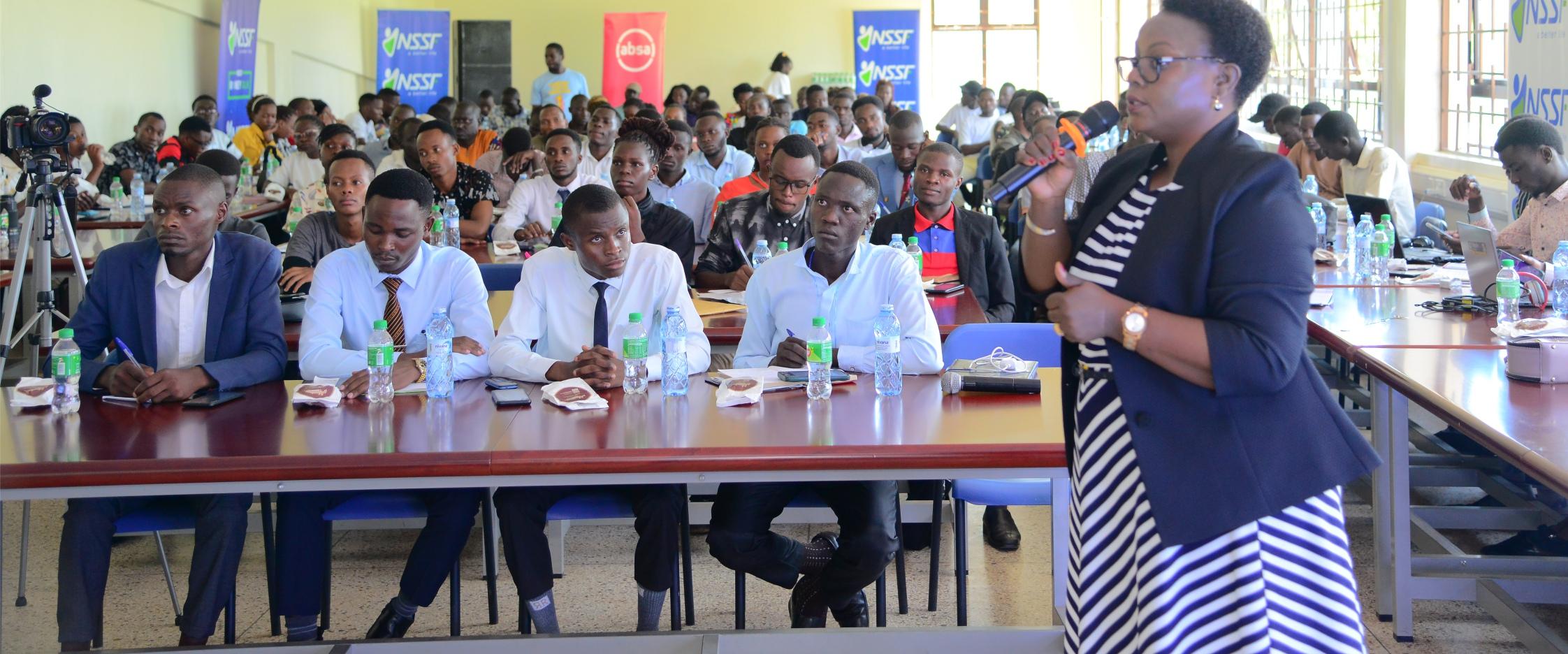
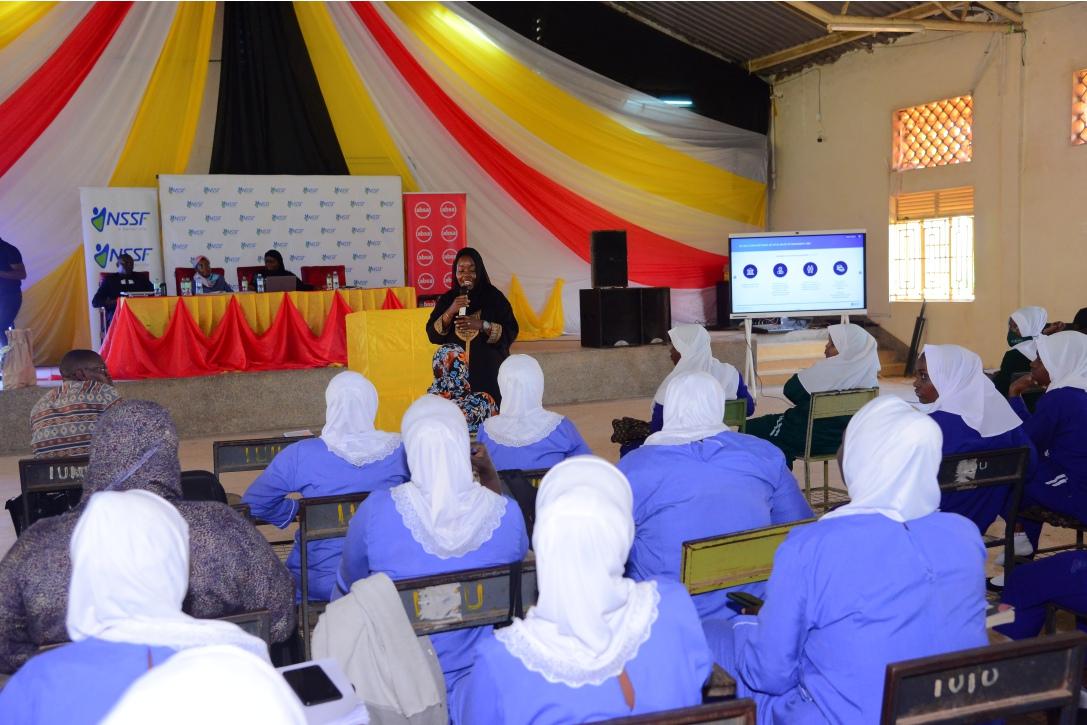
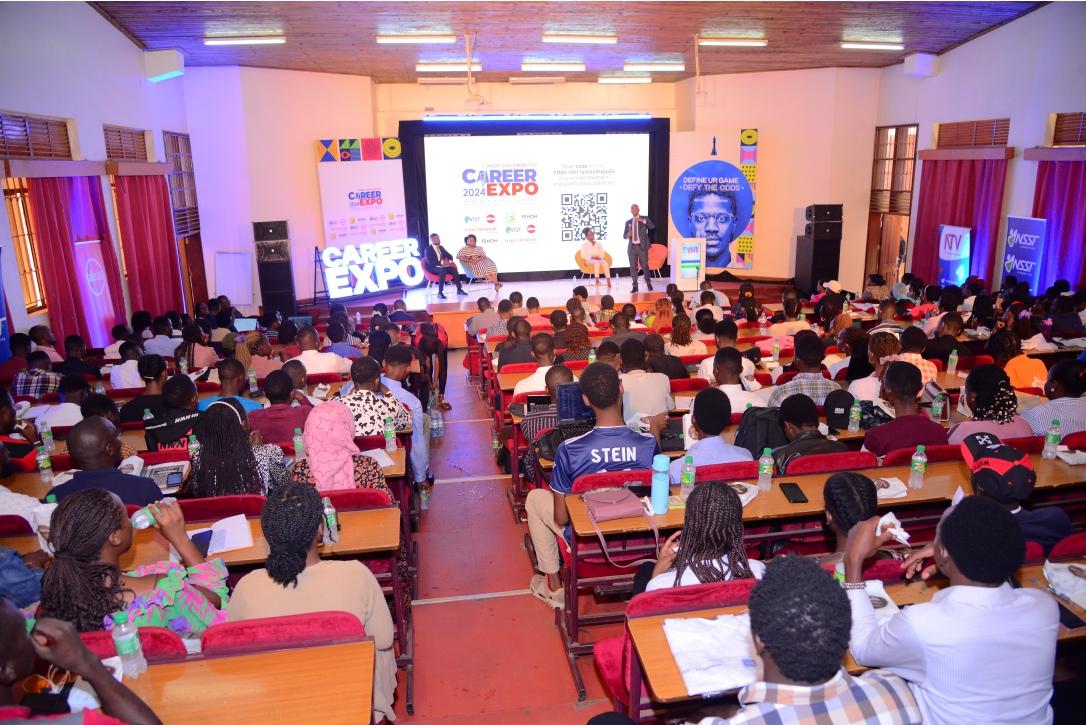
As we look to the future, the doctrine of creating shared value will continue to guide our strategy. By aligning business objectives with societal needs, the Fund is well-positioned to drive sustainable growth, ensuring it remains a trusted partner in Uganda's development journey
Our total budget spend for the financial year was Shs 450M for the Financial Literacy Programme
FY2022/2023
FY2023/2024
spent on csi activities
Coordinate execution and organisation for the Fund's CSI activities and draft respective activity reports.
Identification and evaluation of viable projects that fit within the Fund's CSI policy.
Identify and engage potential partners to support the Fund's CSI projects.
Outlook for FY2024
The Financial Literacy team will focus on training and engaging mass market groups within the informal sector during the upcoming FY24/25.
Critical success factors for CSI
• Become the employer of choice that attracts, builds and retains the right people to support our vision and execute our strategy
• Continue to develop our employees and provide them with the required skills and competencies required for the future world of work
• Commitment of our resources to drive social responsibility initiatives
Every new day signifies our commitment to expanding social security coverage and providing sustainable value to our members, stakeholders, and society.The Fund achieves this through prudent investing, innovations and forming strategic partnerships that shall improve our members' economic ability hence their willingness to save. Continuous reflection on our dedication to sustainable social security growth drives the level of engagement with our respective stakeholders.



At NSSF, our stakeholder relationships are crucial for driving sustainable development and business success. By building collaborative partnerships, we can seize opportunities, manage risks, and address business challenges responsibly
We are committed to openness and inclusivity, integrating diverse stakeholder interests into our operations.This exchange of knowledge and resources helps us deliver exceptional services to our members and ensures long-term resilience. We hold ourselves accountable and maintain transparency with our stakeholders about our progress.
Our success depends on understanding and addressing stakeholder needs and expectations. We continuously engage with our stakeholders, aiming to develop solutions that enhance the quality of life in the private sector, including nongovernmental organizations, and provide a social security safety net.
As a responsible corporate citizen, we create sustainable value by prioritising ESG principles. We actively engage stakeholders to gain insights, share our strategy and performance, and ensure mutual understanding.
Our reputation and performance are shaped by stakeholder perceptions. We engage with stakeholders across all operations, utilising diverse communication channels.
Our stakeholders include oversight bodies, government entities, trade unions, media, professional associations, individual members, service providers, and our management and employees.Through broad engagement, we foster a collaborative environment that supports our strategic goals and enhances our impact.
ABoard-approved Stakeholder Engagement/Management Policy guides stakeholder management and governance, in line with the Fund's overall business objectives.
The Board, through the Staff and CorporateAffairs Committee, handles our stakeholder engagement.
We measure the quality of stakeholder relationships through defined metrics to monitor satisfaction levels on an ongoing basis. Overall, for the period under review, we believe that through focused engagement with our stakeholders, the Fund has maintained healthy and mutually rewarding relationships.
Below, we demonstrate our commitment, engagement, and quality of our relationships with key stakeholders through the value we have delivered.
We serve a diverse range of customers, from individuals to employers, each with unique needs. Engaging with them is essential to understand their current and future requirements. Needs and
Our customers expect excellent service, timely payouts, competitive returns, post-retirement support, efficient engagement, and products for both long-term and short-term savings.
How we engage
• Our walk-in service centres, contact centre, online channels, relationship managers, and employees engage directly with customers to understand and address their needs
• The Service Quality and Business Performance teams utilise research and data to gain insights into customer needs
• Customers provide feedback on our products and services, helping us improve


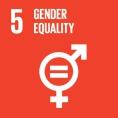
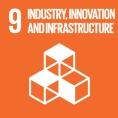

To deliver value, we conduct customer surveys, refine systems for better turnaround times, build strong relationships through engagement channels, support members with financial literacy and entrepreneurial guidance, and run awareness campaigns to boost compliance and saving.
• The Executive Committee and Board monitor customer experiences by regularly reviewing metrics such as Net Promoter Score (NPS) and Customer Satisfaction Index (CSI)
• Our Chief Executive, Executive Committee, senior leaders, and frontline employees regularly review and discuss customer complaints to ensure continuous improvement
To create a culture where our employees can excel and contribute to our purpose, strategy, and accomplishments, employee engagement is essential. We must provide work environments that foster growth, offer flexible and agile work options, deliver outstanding training, development, and career opportunities, and reward performance with fair and competitive pay and benefits.
Employees seek recognition, rewards, and benefits, along with diversity and inclusion, job security, safety and well-being.They also desire growth, learning, and development opportunities, enabling tools, and better communication and engagement.
How we engage
• Our Board receives regular updates from the Managing Director (MD) and Chief People and Culture Officer Topics range from people strategy initiatives to culture and overall sentiment in the Fund
• Board, management and MD quarterly and annual engagements with employees


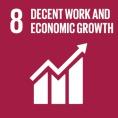

Aligning employees with the 2025-2035 strategy, ongoing employee surveys to measure engagement and identify areas for improvement. We strive to create a thriving work environment, implement training and development opportunities like the Pathfinder CatalystAcademy, and continue adopting reward and recognition best practices.
• Our Managing Director regional employee workshops on 2025-2035 strategy awareness
• Broadcast HR (Human Resources) policy, Legal Inquiries and Risk nuggets to staff
• Conduct monthly online Pathfinder engagements
• Employee surveys
• Customer satisfaction index 87% (2023: 87.5%)
• Mystery shopper score 90% (2023: 88%)
• Turnaround time for payment of benefits 10.1 days (2023: 11.9 days)
• Increased awareness on online channels (E-channels to walk-in ratio 91 to 9)
• 199,980 new customers and 8,374 companies registered
• Designed and tested solutions to support voluntary savings products roll out
• Inability to engage and educate members and the public on opportunities to save as per the NSSFAct Cap 230
• Inability to meet short-term and long-term savings needs
• Develop and deepen the concept for KYC and 360-degree view of our members
• Build partnerships and mobilise formal and informal sectors to save
• Implement Voice of the Customer Led Designs and continuously improve our processes, systems, and channels to improve turnaround times
• Rollout convenient products and services to increase coverage
• Employee engagement score 89% (2023: 86%)
• Graduated over 30 female employees (2023: 30) from Pathfinder Academy
• Holistic health and wellness programme for employees and their families
• Implemented policies on human rights, equal opportunities, labour conditions, ethical conduct, and environmental protection in the workplace to include work and safety training
• Launched and started the Ignite project to redefine our Fund culture
• Engaged employees, especially men on mental health best practices
• Engaged more than 370 employees via the Pathfinder monthly talk shows
• Continued involvement in innovation initiatives, including the internal Hi-Innovator Programme and the deployment ofAI tools
• Inability to attract, retain and motivate staff could impact negatively on service delivery, thereby leading to negative reputation
• Promote and grow the Pathfinder CatalystAcademy
• Increase employee satisfaction
• Improve our talent development and management practices
• Commitment to equal opportunities
Our relationship with the government supports our strategic pillars and enables us to contribute to policies and initiatives that yield the best results for stakeholders. Regulation helps protect our customers and promotes healthy competition.
The Fund prioritises superior performance against strategy, ensuring robust management, profitability growth potential, and competitive annual interest rates. We uphold ethical standards, regulatory compliance, and ESG considerations, while actively contributing to policy, offering technical input, and sharing information.
Contribution to SDGs





The Fund proactively engages with regulators on compliance with legislative frameworks like the NSSFAct (CAP) 230, PPDA, and URBRA. We enforce strong corporate governance for transparency and accountability. Our dedication to sustainable business practices and stakeholder management aims to create lasting organisational value.
How we engage
• We keep an open dialogue with government especially MoGLSD and MoFPED through our Chairman, Managing Director and, Executive Committee members and senior leaders – as well as through consultation responses and cross-industry initiatives
• Liaised openly and constructively with various regulators, including conducting ongoing discussions in support of our corporate governance and operations strategy
• Continued to design solutions and regulations contributing to expanding social security coverage and enriching the range of benefits available to savers
• Continued to realign the Fund's organisational structure to take advantage of the opportunities presented by NSSFAct
• Support realisation of ESG good practice and prioritised SDGs
• Continued discussions and engagements with PPDA, URA, URBRA, NEMAandAttorney General on issues of investment, procurement, taxes, and policy
• Trained District Labour officers on compliance enforcement of NSSF mandate
• At a working level we regularly engage with other regulators through industry consultations and information requests
Good supplier relationships are essential for our success.They help us deliver the solutions and propositions that create customer value.
The Fund prioritises responsible purchasing, supports local suppliers, maintains prompt payment schedules, and upholds ethical and transparent business practices. We ensure fair terms of trade and sustainable sourcing.
How we engage
Contribution to SDGs




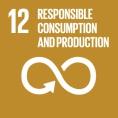

Continual procurement efficiency and performance assessments, enhanced supplier engagements, competitive supplier promotion, and ensuring prompt, uninterrupted delivery of materials and services.
We need to know who we are doing business with and who is acting on our behalf.Therefore, we:
• Select suppliers based on principles of ethical and responsible conduct
• Conduct due diligence on suppliers before and after signing a contract
• Ensure the products we purchase are made, delivered, and disposed of in a socially and environmentally responsible manner
• Utilisation of the electronic Government Procurement (eGP) system
• Measure suppliers' rating, and collaborate with them for continuous improvement
• Conduct theAnnual Supplier's Forum to foster communication and partnership
•Apply preferences to promote local content and ensure that special groups, such as women, youth, and persons with disabilities, are included in our procurement processes
• Lack of awareness of the legal and regulatory changes leading to an inability to meet regulatory requirements, compliance, and potential damage to reputation
• Work with various ministries to include Ministry of Gender and Labour to expand awareness and coverage of social security as per NSSFAct
• Constantly monitor evaluate, and audit our corporate governance practices, legal and regulatory requirements
• Work with Ministry of Finance to promote investments and innovation
• Mobilise partners to support social security coverage
• Directly served 150 suppliers, 84% of these were local suppliers
• Awarded more than UGX 59.5Bn in strategic procurement contracts
• Registered a procurement performance rating of 84.6% by Public Procurement and Disposal of PublicAssetsAuthority (PPDA)
• Our procurement efficiency was 96% (2023: 93%)
• Conducted theAnnual Supplier Forum inApril 2024 and registered a Supplier Satisfaction rating of 98%
• Trained 40 of our procurement champions on revised PPDA regulations and practices
• Promoted local content and special groups of people such as women, youth, and persons with disabilities to participate in procurements
• Our supplier approach is shaped by our Sustainable Procurement Charter and incorporation of technology and digitisation in the procurement and disposal processes
• Continued to build a more resilient supply chain by adding a supplier management risk framework (including internal controls) into our wider key controls framework
• Sustainable procurement efficiency, supplier satisfaction and experience
• Improve contract management practices
• Engaging and enlisting unscrupulous suppliers could lead to conflicts of interest, bribery and poor service delivery impacting negatively on our reputation
The media plays a critical role as a contact point with external stakeholders, keeping them informed of facts, business developments, new products, services, and the impact of our business operations. Contribution
The media expects timely and accurate information to report on business developments, products, services, and corporate impacts. They need transparency, accessibility to company representatives for interviews, and clear communication to convey stories effectively




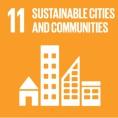

The Fund ensures that the media are consistently updated on key business activities and offerings. We prioritise transparency and accountability, providing clear and timely communication about changes and new products and services. By actively engaging with the media, we help them convey accurate and relevant information to the public, fostering an informed and positive narrative about our business.
Communities
We make a substantial economic contribution to the communities we serve, acting as a vital connector within them. This role is essential to achieving our growth plans and fulfilling our purpose: to make savings a way of life.
In response to the needs and expectations of communities, NSSF brings value through purposeful CSI activities and addresses local community factors, including ESG considerations.


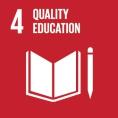




The Fund implements various CSI initiatives, including the KAVC, school renovations, University Career Expo, and student internships. We conduct Financial Literacy training for customers and continue to provide seed funding for small and growing businesses through the Hi-Innovator Programme in partnership with the Mastercard Foundation.Additionally we have piloted initiatives to support skills and livelihoods development.
How we engage
• Media releases and product- related publicity
• Roundtables
• Product and service launches
• Face-to-face and telephonic engagements
• Interviews with the CEO and key executives
How we engage
• We provide support through walk-in and outreaches
• Our Hi-Innovator Programme brings entrepreneurial skills training and funding to growing and small businesses
• The real estate portfolio we are developing, including Solana Residences,Temangalo and PensionTowers promote development and employment opportunities
• By actively engaging with the media, who play a critical role as the contact point with external stakeholders, we help them convey accurate and relevant information to the public
• Kept our customers and stakeholders informed of the facts, business developments, new products, services, and the impact of our business operations
• Positively reported on Fund investments, Hi-Innovator Programme, 2035 strategy among others
• AddedTikTok-@nssfug as our new channel, gaining a reach of 3,301,378 and 317,955 engagements
• Registered more than 2,113,318 engagements on our social media channels
• Identify and continue working with media to positively impact our customers, stakeholders, regulators, communities, and support in expanding social security coverage
• We continued to renovate public primary schools, with over UGX 940M raised from partners, individuals, and communities via the NSSF Kampala Seven Hills Run
• The University Career Expo 2024 was attended by 21,555 students an increase from 16,000 in 2023). Over the past 12 years, the Expo has registered 44,000 students as Fund members, and contributed over UGX 36.4Bn.The Expo aims to prepare students for the workplace and enhance their job prospects
• Engaged and impacted 2,376,471 people on financial wellness via our Financial Literacy initiatives
• We provided $20,000 each to 102 (2023: 155) small and growing businesses through our Hi-Innovator Programme, in partnership with the Mastercard Foundation.To date, this programme has created 183,110 jobs
• Our scalable activities continue to provide great content for our media channels and improve public perception of our Fund
• We use customer surveys and reputation tracking to understand community perceptions of us and inform our focus areas and targets
• Our online social media channels bring our brand to local and global communities and we track feedback and performance through dashboards
• Continue to
• Rapid advances in social media andAI with associated stakeholder scrutiny on misinformation
• The inability to create a positive and sustainable impact on the communities within which we operate has a negative impact on the sustainability of our operations and the economy at large
Business partners and industry associations are key interfaces with our customers.They are custodians of our brand and reputation, playing a critical role in ensuring the delivery of our strategy
The Fund collaborates to stay current with key developments and standards, advocates for
and
and
How we engage
• One-on-one and hybrid business meetings




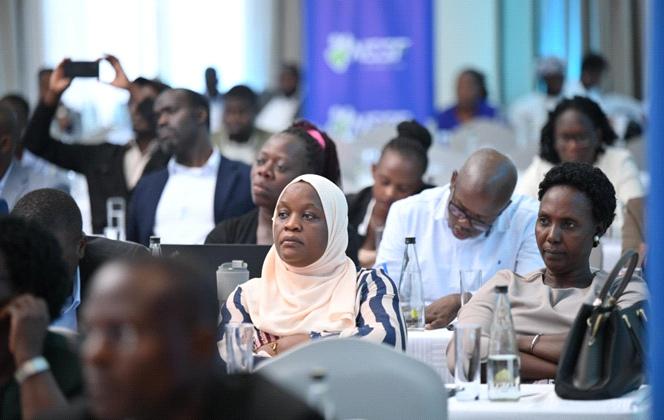
Fund participates in industry-led initiatives related to policy and law, engages in business and sector forums, and undertakes capacity-building initiatives.
• Training, conference sessions on products, services and best practices
• Collaborated with our partners such as NIRA, URA, URSB, OPM on specific solutions that required a multi-partner approach
• Conducted workshops and collaborated with the Uganda National RoadsAuthority Ministry of ICT, and UNOC regarding contractors' compliance with NSSF
• On course together with Mastercard Foundation, to give seed funding of $20,000 each to 5,000 small and growing businesses via the Hi-Innovator Programme
• We partnered with innovations accelerators such as Outbox, Stanbic Business Incubator, Mkazipreneur and MUBS Ent'ship Innovations
• Worked with Banks in supporting our collections, benefits payments and financial market operations
• Opened and hosting the Liaison Office to manage International Social Security Association (ISSA) activities across EastAfrica
• Participated in key international and regional engagements on social security protection and financial literacy
• Lack of engagements leading to inability to meet regulatory requirements, compliance, and damage to reputation
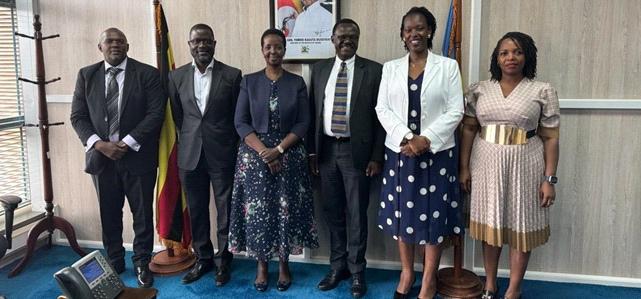
• Provide platforms for broader actions on market expansion and social security coverage and development
• Identify and increase partnerships to support increase in coverage and best practices
• Address social security-related developments, concerns, and initiatives and sharing lessons and best practice
• Support realisation of ESG practices and prioritised SDGs
• Foster relations between ISSA, ILO, and social security schemes in the EastAfrican region and globally
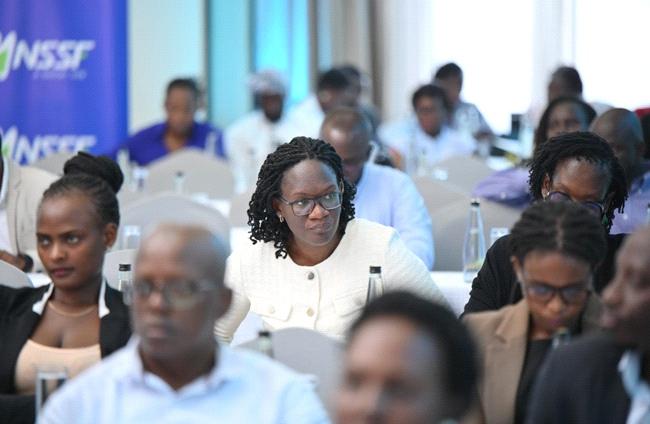


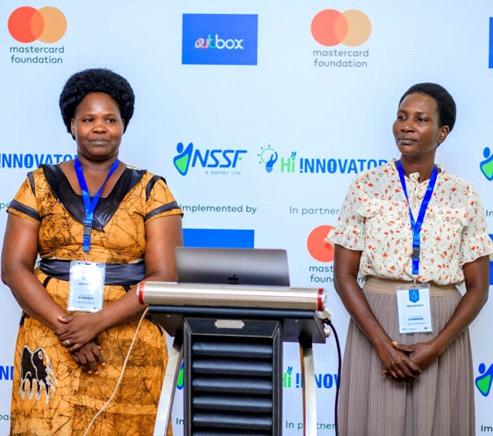
Financial resilience
The Fund remains committed to achieving long-term economic resilience, which is crucial for strengthening social security in Uganda. ESG issues are increasingly integrated into our strategy, addressing their growing importance as both risks and opportunities.Aligning ESG considerations with financial resilience has enabled the Fund to ensure sustainable, profitable growth amid uncertainty and the transition to a more sustainable economic model.


Prudent investment is central to our strategy, and integrating ESG metrics into our investment assessment framework is essential for long-term sustainability and financial performance.The Fund continues to align its unique investment risk exposures with the overarching Vision 2035. Our portfolio investment decisions are increasingly guided by how companies impact the environment and communities.This approach reflects our commitment to ESG principles and their integration into our investment processes.
In an era of constant transformation and uncertainty, adaptability and resilience are key. Corporate sustainability now encompasses financial resilience—the ability to withstand economic shocks and sustain long-term growth. Therefore, driving meaningful and lasting change requires not just a healthy balance sheet but also a deep understanding of financial dynamics with a focus on long-term sustainability rather than short-term gains.
The role of transformation in financial resilience
The Fund's financial resilience is profoundly influenced by its transformational vision, supported by effective management and committed employees.Aligned with Vision 2035, the Fund's growth-oriented belief system has significantly affected its financial outcomes.
This belief system has been a key driver of the Fund's resilience, evident in several ways:
1. Increased employee engagement: Our employees, empowered by the Fund's vision, have become more engaged, leading to increased productivity and morale.This heightened engagement is reflected in our ability to achieve the 2025 targets ahead of schedule.
2. Improved risk tolerance:The growth-oriented belief system has cultivated a positive relationship with risk, enabling innovation and sustained growth.
3. Long-term sustainability:The Fund's strategy, guided by its vision, remains focused on long-term sustainability, ensuring that our approach is aligned with enduring success rather than short-term gains.
The Fund's impact on Uganda's economic landscape is both significant and extensive. Our investments create substantial opportunities for Ugandans, both directly and indirectly As the largest investor in Uganda's bond and equity markets and with a substantial presence in real estate, we exert considerable influence across various sectors.
Our contribution is particularly notable in the commercial banking sector, where we hold 14% of all deposits, thereby supporting credit financing.Additionally, our investments in stocks and bonds issued by the Central Bank represent 40% of government debt.The returns from these investments enhance Uganda's fiscal revenue through taxes and interest payments to members. Moreover, our activities support a wide range of stakeholders, including employees, suppliers, and communities.
The Fund achieved UGX 22.13Tn in assets this financial year and has set an ambitious goal of reaching UGX 50Tn by 2035.This target aligns with evolving environmental and social finance criteria, guided by emerging external social security standards. By integrating sustainable finance principles, we are positioned to offer products that provide both environmental and social benefits to our members.
Strategic objectives
Our key objectives for FY24 included:
• Increase the Fund'sAsset Base:Targeted a FundAsset size of UGX 21.10Tn
• Minimise the expense ratio:Target 1.07%
• Increase the return on investment:Target 11%
• Increase contribution collections:Target UGX 160Bn
Our ongoing innovation in financial offerings equips our members with essential tools to save, reduce debt, and manage their finances effectively, preparing them for long-term financial challenges.
The NSSFAct Cap 230, has introduced significant changes to our business model. It expands social security coverage to all Ugandans and provides mid-term access to their social security funds.This represents a crucial step toward corporate sustainability, intertwining financial resilience with enhanced support for our members.
Our value-added statement
Our value-added statement reflects, at an elevated level, the wealth created by the Fund and how it was distributed among our key stakeholders: members, government, and employees.
Impact
five years
Other income (loss)
Net increase in value of investments
Less expenses (excluding staff costs and depreciation)
Wealth created
Distribution of wealth created to stakeholders (amounts)
Members (interest credited to accounts)
Employee salaries, wages and other benefits
Government direct tax
Retained earnings for future growth
Distribution of wealth created to stakeholders (percentage)
Members (interest credited to accounts)
Employee salaries, wages and other benefits
Government direct tax
Retained earnings for future growth
The Fund achieved a robust financial performance, reaching the targeted UGX 20Tn in total assets by the third quarter of FY2024.The financial year concluded on a positive note, with businesses showing signs of recovery despite ongoing regional and international geopolitical uncertainties. Domestic inflation saw a moderate increase by the end of June 2024.
Total revenue for the year exceeded budget expectations by 30.1%, driven by unrealised gains totalling UGX 525Bn.This includes foreign currency gains of UGX 255Bn and capital gains of UGX 270Bn.
In terms of inflation, Uganda maintained one of the lowest rates in the region, averaging 3.2% over the twelve months to May 2024. However, annual headline inflation rose to 3.6% in May 2024 from 3.2% inApril 2024, with core inflation increasing to 3.7% from 3.5%.This uptick in inflation was mainly attributed to rising costs in healthcare, education, and transportation services, as well as higher prices for solid and liquid fuels. Nonetheless, tight monetary conditions, a decline in global inflation, and a favourable domestic food supply have somewhat mitigated these inflationary pressures.
Critical success factors for financial resilience
• Far-sighted investment strategy
• Restraint of operating costs
• Leverage on digital transformation that drives cost-effective services

Our inclusivity agenda aims to unlock the potential of Ugandan entrepreneurs through collaboration.Through our entrepreneur programme, we aim to expand new work opportunities, particularly focusing on women and youth.
Our approach
By proactively supporting SMME development and entrepreneurship, we will be able to ensure a measurable and meaningful socio-economic impact, aiding progress towards sustainable and inclusive economic growth.
In addition, inclusivity also pertains to gender equality and the promotion of equal opportunities within the Fund.
Strategic objectives
Our key objectives for FY24 included:

• Creating employment opportunities and stimulating economic growth through the Hi-Innovator Programme: Create and sustain an additional 70,000 jobs
• Provide training to entrepreneurs:Target 10,000
• Provide financial support to small and growing businesses: Seed-fund 180 SGBs
• Empowering women-led businesses through the Hi-Innovator WomenAccelerator: Of the SGBs supported, 70% of these must be women-led
The Fund has always been deeply committed to giving back to the community it serves.To solidify its role as the preferred social security provider, the Fund focuses on empowering its customers' lives. By using both internal and external talent, the Fund aims to cultivate an innovative ecosystem that generates new value for itself and its stakeholders.
One visionary initiative, the Hi-Innovator Programme, was launched to uncover new opportunities that bring significant benefits to the Fund, its members, and the public.This programme is a collaborative effort that brings together the Fund's dedicated employees and dynamic implementing partners.
It encompasses two distinct but interconnected sides:
Internal innovation, which focuses on nurturing the visionary concepts of the Fund's own employees that align with the overall strategy and are poised to shape the Fund's future.
External innovation, where the Fund actively seeks partnerships with external entities to infuse fresh energy and ideas into the entrepreneurial ecosystem; and
The Hi-Innovator Programme stands as a symbol of collaborative innovation. Driven by a shared desire to unlock untapped potential, the Fund, its staff, and partners embarked on a journey where creativity knows no bounds.The momentum behind these two dimensions of innovation is outlined below
In often overlooked parts of the country or city, skilled workers (artisans) have honed their crafts primarily through on-the-job training.These artisans, including builders, carpenters, electricians, mechanics, painters, plumbers, and welders, possess remarkable talents but often struggle with financial uncertainty and lack the knowledge to manage their earnings effectively
Recognising the artisans' passion and potential, the Fund introduced financial advisory services to this close-knit community Through one of its innovation initiatives, Black Swan, the Fund partnered with a digital platform, Uncle Bob, designed to revolutionise how artisans access work opportunities and engage with customers.
The Fund understood that a unique and empathetic approach was necessary for this endeavour. Instead of conventional financial lectures, the Fund envisioned a tailored mindset shift approach through another innovation initiative,Trailblazers.This approach gently guided artisans towards understanding the true value of saving and exploring diverse options for securing a better future.
With a determination to combine the two innovation initiatives, Black Swan andTrailblazers, the Fund organised interactive "financial mindset shift workshops."These workshops invited artisans to share their hopes and dreams and envision their desired futures.The sessions blended storytelling with practical financial advice, creating a powerful and engaging learning experience.


The pathway to unleashing the potential of artisans was not through intricate financial terms or complicated strategies, but through a customised approach that shifts their mindset. By changing how artisans viewed money, they could be inspired to build a better and more secure future for not only themselves but also their families.
Together with Uncle Bob, the Fund sought to address the objectives below:
• Accelerating artisans' visibility – enabling the artisans to display their skills, expertise and past projects through the Uncle Bob platform thereby increasing their exposure to potential customers and job opportunities.
• Ensuring financial deepening and career growth –providing opportunities for artisans to expand their existing customer base, increase their earning potential and advance their careers accordingly This creates a digital financial footprint for the artisans which in turn makes them bankable and hence giving them access to some financial services like micro credit products.
• Promoting transparency and fairness – facilitating clear communication, pricing transparency and fair treatment for both the artisans and customers.This helps to mitigate issues such as underpayment, exploitation, and disputes commonly encountered in traditional work arrangements.



With these goals in mind, the Fund tested its new “financial mindset shift” approach, sparking a transformation that extended beyond finances.Artisans embraced their newfound financial knowledge, discovering a steadfast belief in their own potential and the resilience to overcome future challenges.
The workshops became a vibrant tapestry of ideas, where artisans exchanged stories and gained insights from their peers. Guided by the Fund, they embraced the power of financial planning.The artisans learned to invest their hard-earned money prudently, understanding that safeguarding tomorrow needs nurturing today's earnings.Those once hesitant about saving, began setting aside some of their earnings with a newfound sense of purpose. Some dreamed of expanding their businesses, others of exploring untapped markets, and a few even aspired to educate their children in the finest institutions.

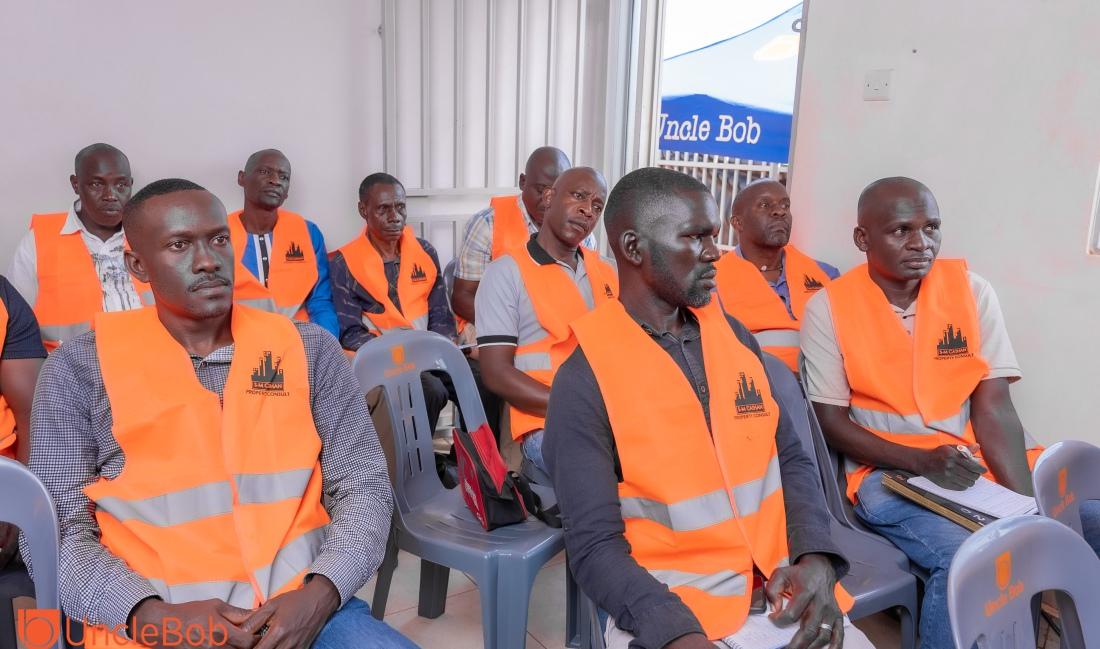
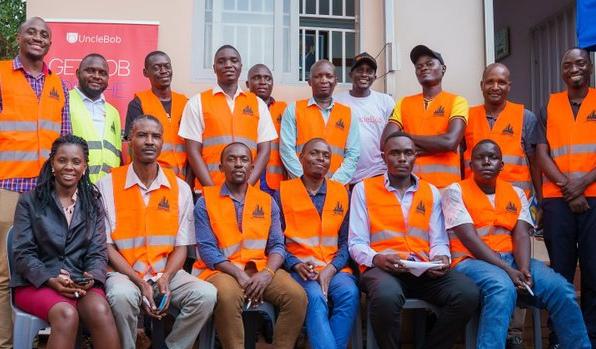


Some success stories for artisans are highlighted below:
Artisan
• Age: 26-year-old male
• Date Joined: 10April 2022
• Initial Capital: UGX 600,000
• Current Capital: Over UGX 1,000,000 per month
• Age: 24-year-old male
• Date Joined: 21 September 2022
• Initial Capital: UGX 200,000
• Current Capital: UGX 400,000 per month
• Inconsistence in available opportunities • Some customers delaying payments • Untrustworthy customers
• Low predictability of opportunities • Fewer opportunities
• Increased business opportunities
The Hi-Innovator Programme, launched inAugust 2020, aims to catalyse the entrepreneurship ecosystem in Uganda. This 5-year programme is designed to create dignified and fulfilling work opportunities for youth by unlocking new economic opportunities for entrepreneurs in small and growing businesses (SGBs).The programme, in collaboration with the Mastercard Foundation and Outbox, focuses on businesses often overlooked by traditional investors, providing them with the necessary financing and technical support for growth.
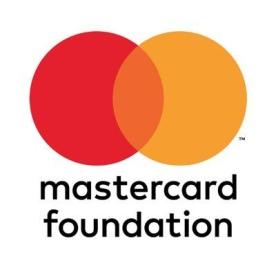
The Mastercard Foundation is looking to unlock opportunities for youth for dignified and fulfilling work
NSSF is looking to support small businesses that have potential to scale and bring new economic opportunities for Uganda

This journey with theArtisans serves as a timeless reminder that sometimes, a tailored mindset shift can unlock the most extraordinary possibilities.Through the Fund's partnership with Uncle Bob and the artisans' willingness to embrace change, they not only recognised the true value of saving but also unlocked the key to building a better life – step by step. Their journey towards a brighter future continues, a testament to the power of dreams, innovation, and the unity in their community.

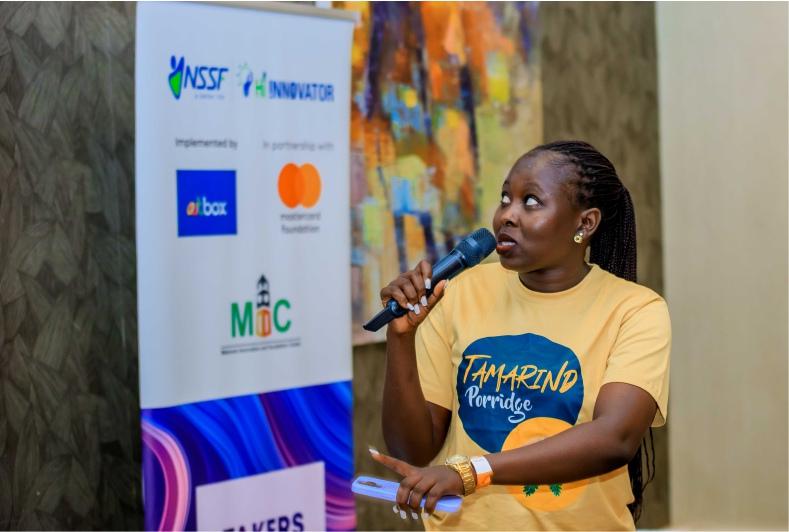
Outbox is the programme's trusted implementation partner, enabling the programme to explore opportunities to bridge entrepreneurs with partners that can support business growth
The Hi-Innovator Programme aims to:
• Strengthen the entrepreneurship ecosystem: Build the capacity of 20 Enterprise Support Organisations (ESOs) across Uganda to offer high-quality services to SGBs
• Support SGBs: Provide catalytic funding and technical assistance to at least 500 SGBs, helping at least 100 scale their operations
• Entrepreneurship training:Train 75,000 entrepreneurs in best practices to foster a culture of entrepreneurship
• Job creation: Create and sustain dignified work opportunities for 132,000 young people, with 70% of these opportunities targeted at women and youth
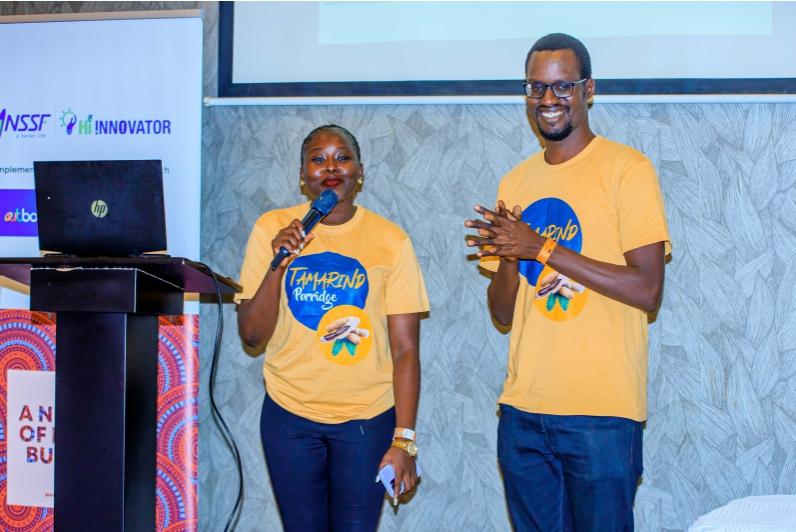
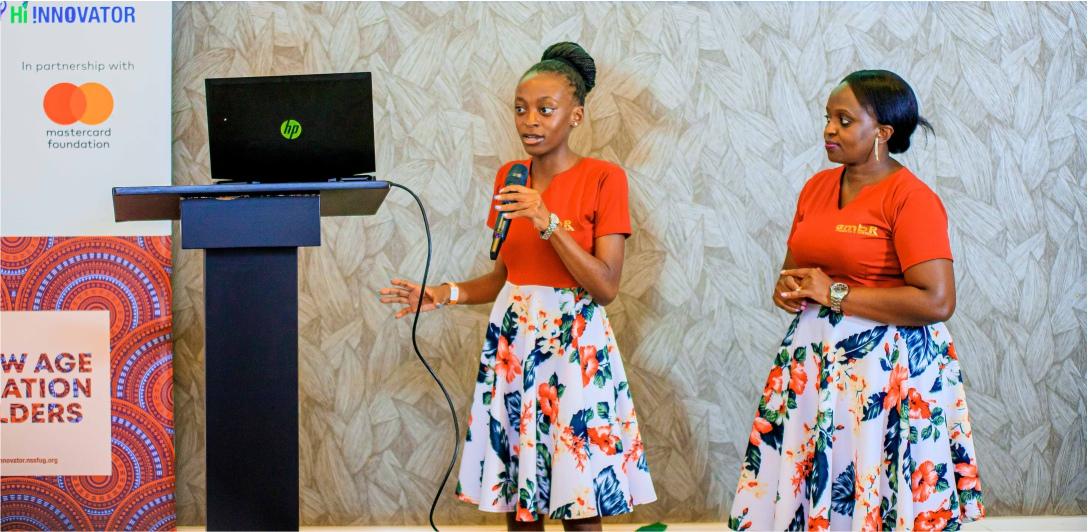

Hi-Innovator Women Accelerator
The Hi-Innovator WomenAccelerator is a specialised part of the broader initiative, aimed at empowering women-led businesses in Uganda.This segment was developed in response to challenges like low participation, lack of confidence, gender stereotypes, time constraints, and fear of failure among women entrepreneurs.
Participants in the Hi-Innovator Programme and the WomenAccelerator receive:
• Financial support:Access to catalytic funding for business growth
• Technical assistance: Expert guidance in areas such as business planning, marketing, and financial management
• Networking opportunities: Connections with mentors, investors, and other entrepreneurs
• Market access: Support in connecting with potential customers and partners
The eligibility criteria for participation in the Hi-Innovator Programme have evolved to ensure inclusivity and impact.The updated criteria include:
1. The business must be at least 50% female owned.
2. It must be legally registered and operational in Uganda with at least two founders.
3. At least one founder must have completed the NSSF Hi-Innovator Foundation course.
4. The business should have at least five full-time staff, with 50% youth and 70% Ugandan owned.
5. It should have a minimum annual revenue of UGX 10M per annum for at least two years and should not have raised more than UGX 1Bn in grants, convertible grants, debt, or private equity
6. The business must be NSSF compliant.
7. The business should be willing to provide a 6% equity stake ownership to NSSF.
Conclusion
The Hi-Innovator Programme is a transformative initiative aimed at fostering entrepreneurship and economic growth in Uganda by providing critical support to SGBs, especially those led by women.Through its comprehensive approach, the programme is creating a more inclusive and vibrant entrepreneurial ecosystem that drives sustainable development.
In FY2023/24, the programme supported 38 women-led businesses under the third WomenAccelerator Cohort.To date, out of 368 SGBs supported, 230 are owned by women, and 55 are jointly owned by males and females. Of the 183,110 jobs created and sustained (both directly and indirectly), 90,251 are held by women.
Business Academy

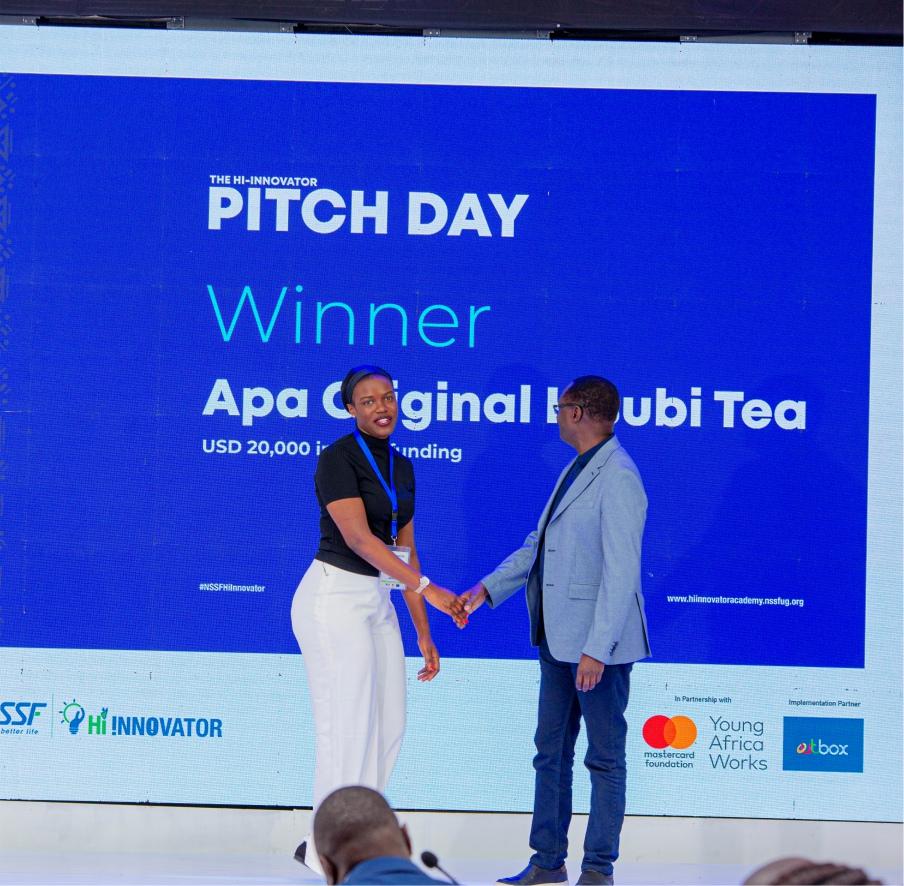
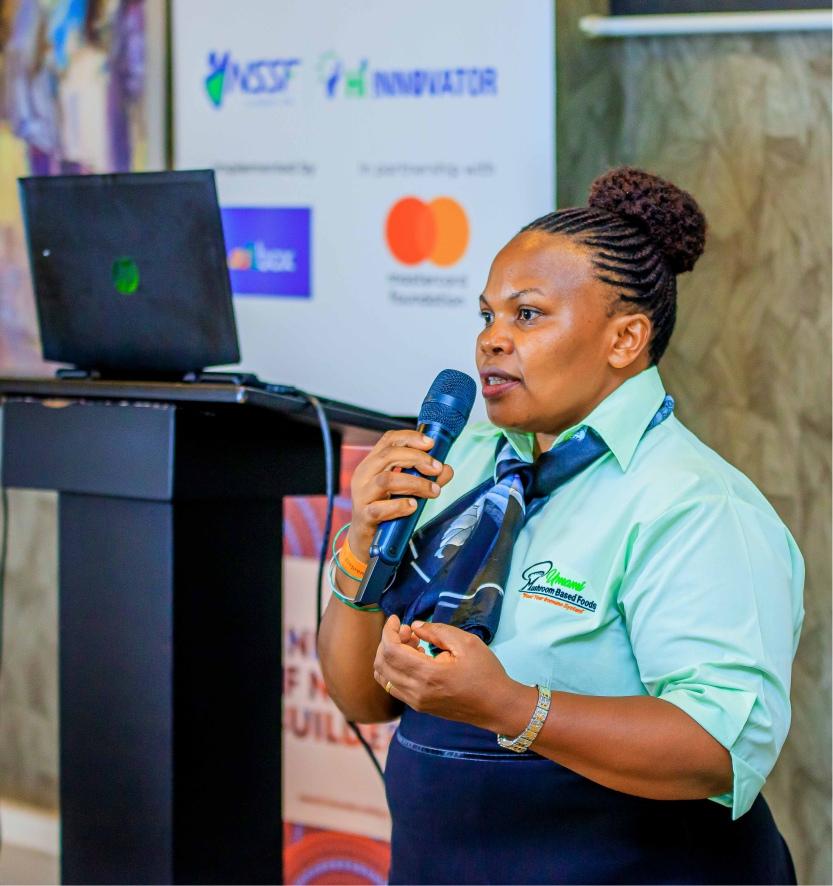
Important to note, of the network of Enterprise Support Organisations (ESOs) three are led and owned by women.These include Mkazipreneur, Zimba Women and WITU (Women inTechnology Uganda).
In FY2024, the businesses we supported remitted over UGX 300M in social security contributions from their employees. To date, these supported SGBs have contributed just over UGX 700M.
FY2020/2021 Outcomes
FY2021/2022 Outcomes
• Trained 2,216 entrepreneurs
• Onboarded a total of 7 hubs
• Did not track jobs as we did not seed fund any entrepreneurs
• Seed funded 27 businesses
• Trained an additional 6,000 entrepreneurs, bringing the total to 8,216
• Onboarded 3 new hubs, bringing the total to 10
• Created and sustained 20,950 jobs
• Seed funded an additional 225 businesses
• Trained an additional 8,504 entrepreneurs
• Onboarded an additional 3 hubs
FY2022/2023 Outcomes
• Created and sustained an additional 69,004 jobs
• Created 1,800 new contributors to the Fund
• 61% women participation in the initiative and seed funded 160 women-led/women-owned businesses
• Seed funded more 102 SGBs
• Trained 19,267 entrepreneurs on the learning platform
FY2023/2024 Outcomes
FY2024/2025 Targets
• The selection of 5 ESOs was done up to 75%. Only site visits to the 7 selected ESO were left pending
• Created and sustained a total of 87,718 jobs, including positions for both youths and nonyouths, as tracked by the Fund. Of these, 59,848 were specifically for young people, as tracked by the Foundation
• Collected more than UGX 300M in NSSF contributions with an improved compliance rate of 55%
• Extend Seeding funding and technical support to 500 Small and Growing Businesses, and support 100 to scale
• Train 75,000 entrepreneurs with basic entrepreneurship knowledge
• Onboard and capacity build 20 hubs to continue support of entrepreneurs in the ecosystem
• Create and sustain 132,000 jobs with a deliberate effort to extend opportunities to 70% of women in this portfolio
Achievements against performance measures
Created and sustained 128,852 jobs for young people against a target of 132,000 for FY2025
Annual budget for Hi-Innovator Programme
Description
Overall, Seed Funding of 443 businesses $20,000 each Programme Support
Overall Expenditure (Seed funds + Programme support)
86% utilisation of allocated funds FY2023/2024
Mkazipreneur-building a community of empowered women
Mkazipreneur trainers empowering women in one of their sessions
Watch the video here
Stitching dreams: how Mtindo trains youth and women in tailoring
Mtindo studio academy located in Gulu-Suzan Namirimu (proprietor) trains youth and women in tailoring
Watch the video here
Sweet Success with Fruit Popsicles:Akol Lynnete's Hi-Innovator story
Akol Lynnete women accelerator participant and proprietor of Ice-popsicles
Watch the video here
• Increase the percentage of women on our Board and in senior positions



• Identify more small and growing businesses to receive help from the Hi-Innovator Programme
• Equipping entrepreneurs with the required skills and knowledge for long-term business success
Environmental protection
Environment and social responsibility are at the heart of the Fund's strategy. Climate change is an integral part of our ESG agenda and is a key factor in the Fund's annual risk assessment.This assessment evaluates the potential impact of climate changes on the Fund's assets, projects, and liabilities.
Our approach
Our ambition is to harness technological innovation and digital prowess to drive decarbonisation. We are committed to reducing the consumption of natural resources across all our business operations. Our efforts include combating climate change, adopting sustainable waste management practices, and minimising the use of water and energy resources.
Our Water and Energy Management Policy, aligned with the international standard ISO 14001:04, aims to ensure efficient resource use by monitoring and controlling environmental issues.This policy contributes positively to the Sustainable Development Goals (SDGs) as illustrated in our report.
Strategic objectives
Our key environmental objectives for FY24 included:
• Achieving a 15% reduction in energy consumption
• Minimising the environmental impacts of our physical real estate projects
• Implementing green procurement in line with new PPDAregulations

The Fund implemented the following initiatives on its projects to reduce emissions as much as possible:
• Reducing fossil energy demand by using solar power for lighting
• Decreasing the demand for virgin materials (raw materials that have not been previously used or processed)
• Employing noise-suppression techniques to minimise the impact of temporary construction noise at project sites
• Addressing air pollution by routinely sprinkling water during construction

Sustainable transport management and minimising global carbon footprint
During the year, the Fund implemented initiatives to contribute to the global agenda of minimising global warming to 1.5°C by 2050.
Issue
How we control emissions and fuel for Fund vehicles
• Providing seed funding to organisations that contribute to reducing the global carbon footprint
• Transitioning to a paperless office
• Achieving net zero carbon emissions on our Fund's investment projects, considering lifecycle impacts of construction, including materials extraction and transport to the sites
• Reducing paper consumption
• Providing seed funding to organisations contributing to minimising the global carbon footprint
• Subjecting all procurement and disposal activities to scrutiny for Environmental, Social, and Health Safeguards (ESHS) in line with PPDAregulations
Responsible use of natural capital and mitigating the impact of climate change
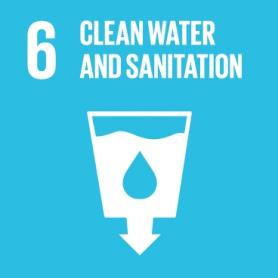
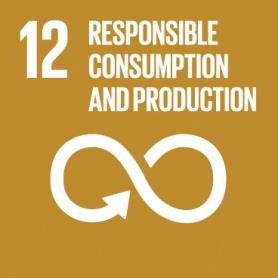

How we ensure noise control in Fund vehicles
Response
• Minimising unnecessary vehicle usage by discouraging avoidable trips or consolidating routes to improve efficiency
• Purchasing brand new vehicles from authorised dealers by the manufacturers
• Maintaining a fleet with smaller engines of 2200cc, with only three vehicles having engines of 3000–3600cc
• Ensuring prompt maintenance and servicing of our fleet with the suppliers of the vehicles or vetted genuine garages through the procurement process
• Procuring fuel from petroleum dealers selected through a competitive procurement process
• Performing prompt routine service and repair of the fleet
• Enforcing a transport management policy that prohibits employees from overloading vehicles
• Conducting monthly routine inspections of the fleet to detect defects promptly
• Ensuring the use of genuine parts from authorised dealers
How we ensure vehicle safety
• Procuring the latest models with advanced technology to proactively warn and signal mechanical defects
• Parking vehicles overnight only at authorised locations or police stations
• Allowing only authorised employees to drive Fund vehicles
• Implementing geo-fencing for the fleet, with alerts sent to the Logistics Supervisor and Regional Managers if there is an attempt to cross into unauthorised zones, especially across geographical borders
• Maintaining comprehensive insurance for the fleet against risks and uncertainties
In Uganda, annual waste generation exceeds 3,000,000 tons, with only 8% being recycled. Most of the waste ends up in the environment, leading to pollution and emissions.To address this issue, the Fund collaborated with Waste Watch Initiatives Uganda Limited.This partnership involves working with waste plastic pickers and schools to collect mixed waste plastic, pay per kilogram collected, and transport it to the recycling plant of Waste Watch Initiatives Uganda Limited (also a beneficially of Hi-Innovator).This initiative aims to significantly reduce pollution, contribute to minimising the global carbon footprint, and eventually foster a green economy
We have implemented multiple steps to enhance efficiency in our operations, showing our commitment to energy management performance. This includes preventing energy wastage and adhering to local and national energy regulations. Electricity, primarily supplied through UMEME distribution feeders, is the main energy source for the Fund's buildings, supplemented by standby diesel generators. Our goal is continual improvement in energy management to ensure sustainability and compliance with energy-related regulations.

The Fund implemented the following activities during the year to ensure energy efficiency:
• Increased use of daylight: Maximising natural light in our buildings to reduce the need for artificial lighting
• Encouraged LED lighting: All tenants were encouraged to replace fluorescent lights with Light Emitting Diodes (LEDs) that use less power
• Installation of timers:Timers were installed for security lights to work based on specific requirements, ensuring efficient usage
• Enhanced lighting controls: Improved lighting controls such as occupancy sensors and daylight level sensors were installed to optimise lighting usage
• Lift optimisation software: Implemented software to ensure efficient use of lifts
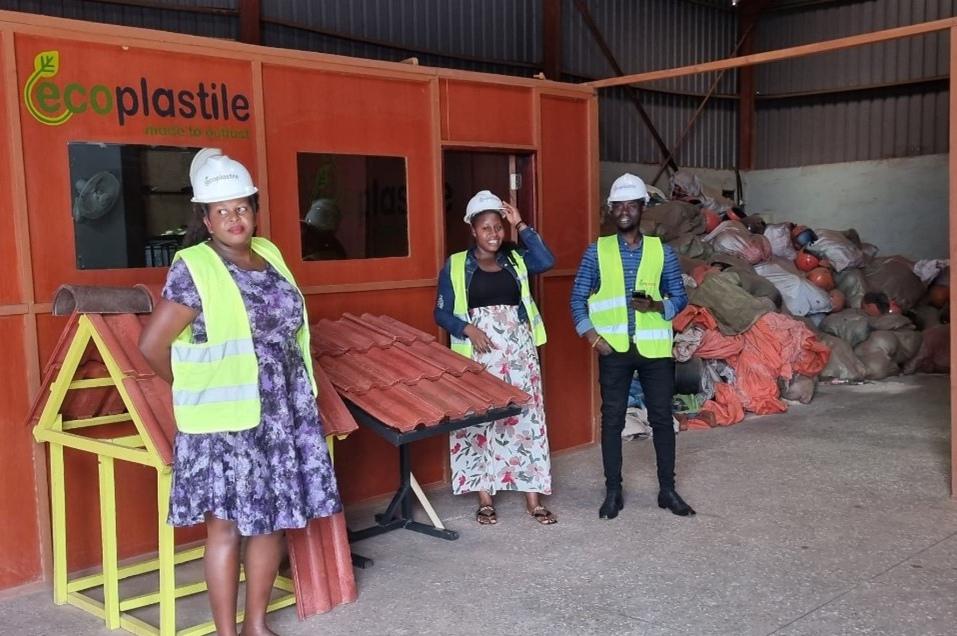

During the year, NEMAconducted an environmental impact assessment on all the Fund's construction projects in compliance with Regulation 37 of the EnvironmentalAssessment Regulations, Statutory Instrument No. 13 of 1998.This assessment enabled the Fund to identify key environmental indicators and establish legally acceptable thresholds for environmental standards, including air, noise, water, soil quality, and the protection of sensitive ecosystems. It also covered standards for waste management, land use guidelines, and socio-economic issues.
As a result, the Fund implemented the following controls to mitigate the identified potential environmental impacts, ensuring compliance and promoting sustainable development.
Demolition and construction phase
Potential impact
Noise and vibrations
Air quality impacts
Construction solid waste disposal impacts
Operations are conducted with minimal noise and vibration disturbances to the surrounding environment. Demolitions are scheduled during normal working hours to reduce the impact on the community.
Demolitions are scheduled during periods of low winds to decrease dust emissions.
Waste soil is reused for backfilling where necessary and during landscaping after construction.
Contractors undertake waste segregation at source to separate hazardous from nonhazardous waste.
Workers are sensitised in the use of proper waste management practices.
Geology and soils impacts
Movement of heavy machinery is restricted to approved areas.
Direct zones of impact are confined to minimise run-offs.
Demolition wastes impacts
All recyclable wastes, including iron bars, metals and plastics are properly collected for eventual recycling.
Demolition wastes such as concrete and bricks are reused as backfill material.
Operation phase
Increased water demand
Sewage disposal impacts
There is a borehole on the site to provide an alternative source of water
All hazardous wastes are stored, labelled, and transported per NEMAand the Hazardous Waste Handling and Management Regulation (2001).
Unregulated or controlled noise often interrupts performance or communication thus predisposing a person to a risk of accidents, injuries, dangerous occurrences, stress, anxiety, illnesses such as noise induced hearing loss.
Our noise reduction objectives
The Fund is committed to minimising noise pollution and creating healthy living and working environments.To achieve this, we have established noise level targets for different project types and time periods.
Impact over 5 years
Description Energy consumption
Operation of the facility
During the year, the Fund conducted a sample noise measurement at one of the Fund projects and the results revealed that the activities within the project area comply with average maximum permissible noise limits threshold level of 75 as shown below
0448675
019475
0448617 E 019614
N 0448830 E 019594
N 0444862 E 019507
N 0448924 E 019595
N 0448744 E 019594
N 0448830 E 019594
N 0448866 E 019497
N 0448700 E 019560 N 0448785 E 019621
FY24 Outcomes
Increase in energy consumption was due to the increase in the occupancy rate for the two buildings.
Our future plans on energy savings:
• Regular maintenance: Service transformers, stabilizers, and HVAC systems to ensure optimal efficiency
• Solar energy: Explore the installation of solar panels in the parking tower
• Smart lighting: Install timer systems for security lights to ensure they operate only as needed and are not left on during the day

consumption
Water consumption increased by 26.95% primarily attributed to a 10% tariff increase imposed by NWSC in July 2023 and a rise in occupancy rates across both buildings.
Our future plans for water savings:
• Plumbing maintenance: Ensure a consistent supply of plumbing consumables to promptly address and repair leaks, minimising water loss
• Isolation valves: Install isolation valves on each floor to allow maintenance on the sprinkler system without draining the entire system, targeting only the affected floor


to ensure that 100% of the waste from our buildings is diverted to KCCA pipelines in accordance with the City Council Solid Waste Management Ordinance of 2000

“I am pleased to present our Corporate Governance report for the FY2023/24, which has been the final year of the 12th Board in office. I take this opportunity to congratulate my fellow Board members for successfully completing their term. I commend the Board and Management for their great leadership in upholding good governance and ensuring that the Board's mandate is delivered.”
Dr. Peter Kimbowa, Chairman, Board of Directors


On behalf of the Board, I commend the Management and staff for the recovery and resilience demonstrated after the disruptions of the Fund operations by six probes over an eight months' period.The Fund continues to exceed the key performance targets in terms of portfolio growth, member satisfaction, efficiency in its processes and staff satisfaction. Sustainability and ESG are part of components of the Vision 2035 and the Board will continue to promote this agenda through creation of awareness, strategic planning and policy formulation, provision of oversight and guidance.
Our corporate governance structure and practices have enabled us to create value for the Fund, our members and all our stakeholders in this ever-changing environment.
Our governance report sets out our robust approach to sound corporate governance and alignment to King IV principles, our mandate as the Board, together with reports from each Board Committee and activities executed in the FY2023/2024 financial year
The Board, being the overall custodian of good corporate governance, together with the ManagementTeam, promotes and upholds the core fundamental principles of governance; accountability, fairness, transparency, and social responsibility in the way we conduct business and in all our processes.
Our integrated report discloses our performance to our members, our stakeholders, and the public as a commitment to our accountability and transparency
The Fund held anAnnual Members' Meeting on 26 September 2023, where the financial performance, the audited financial accounts, the Integrated Report, and the inaugural ESG/Sustainability report were presented to our members and all stakeholders.
The Board's approach is to ensure that corporate governance is embedded into the strategic objectives, operations, and internal processes of the Fund's business.The Board is committed to keeping abreast with new corporate governance trends from an international, regional, and local perspective in the fulfilment of its vision to become the social security provider of choice to its members and generate tangible sustainable returns.
The Board continues to
• Inspire and rebuild trust within the Fund and the public.
• Clarify on the Fund business purpose.
• Provide a culture of constant measurement through feedback and reinforcement.
• Harness team-based approaches within the Fund.
Finally, I express immense gratitude to the supervising ministries, fellow agencies, the outgoing Board, the Management team, and staff for the unwavering support exhibited during this tenure.
The Fund's governance approach is based on the main principles and provisions set out in the UK Corporate Governance Code and the King IV Code on Corporate Governance.
The Fund adheres to and ensures full compliance with the provisions of the National Social SecurityAct Cap 230 that regulates the Fund's activities.The Board also adhered to all other laws that affect the regulatory environment of the Fund's operations and supported management in ensuring full compliance.
The Board is also governed by the Board charter which stipulates the parameters within which the Board operates and ensures the application of the principles of good corporate governance in all its dealings.The charter sets out the roles and responsibilities of the Board, its committees, and individual Directors, including its composition and relevant procedures of the Board.The charter is aligned with the provisions of the UK Code and King IV Code on Corporate Governance.The Board charter was reviewed to align with emerging trends in good governance.
The way we have continued to apply these governance principles is demonstrated throughout the report.The Board confirms that the Fund, throughout the period under review, complied with all applicable laws and regulations.
• Implementation of the provisions of the NSSFAct 230 and support to the formulation of the regulations to operationalise the amendments.The implementation of mid-term access and the livelihood programme have been key during the current tenure
• Board dynamics.The Board is constituent based and the dynamics within have been well maintained
• Productive navigation and corroborative definition of our agenda between the various stakeholders, especially among the two principal supervisors
• Digital transformation within the Fund
• Launch of Vision 2035
• Integrating the Fund strategy into the National Development Plan (NDP3) to make the Fund more visible and economically useful to Uganda's development
• Support to the Management team to implement agile roadmaps
We were delighted to report that the Fund received special recognition for good Corporate Governance Reporting at the Financial Reporting (FiRe)Awards 2023.
This result reflects the focus and commitment by the Board and Management upholding the core fundamental principles of corporate governance.

• Achieved and exceeded the targeted assets under management of UGX 20Tn ahead of time
• Evaluation of the Board performance.The Board and each member achieved a good performance rating
• Information architecture in the Fund.The Board has continued to receive accurate and complete information in a timely manner that has facilitated decision making
• Creation and scale up of various projects such as Hi-Innovator Programme and the proposed National Marketing Company (NAMCO) among others
• Introduced executive coaching for senior leaders of the Fund especially in management and performance enhancement
• Embedded digital and analytics to grow legacy businesses and create new ones
• Reshaping the balance sheet and cost structures through successful budgeting
• Implementation of the NSSFAgency model to enhance service delivery and accessibility for members
Challenges during the FY2023/24
• Multiplicity of probes/ investigative inquiries which brought disruptions and affected morale of employees
• The emergence of unprecedented risks due to the ever-changing global landscape
• Land challenges which stemmed from double titling by the Ministry of Lands, Housing and Urban Development in 2019
• Board Dynamics. Creating and maintaining a cohesive, focused, and dynamic team at the Board
• Whistleblowers. Managing the multiplicity and complexity of authorised and non-authorised information
Technology The Board working with Management would like to drive the Fund as a technology company guided by data and algorithms for decision making and processes.There is need to upskill, reskill and attain new skill to enable the Fund to achieve a cutting edge for tech driven strategies.
Human Capital Development Continuous learning agenda for staff. Putting people at the centre of the corporate purpose.
Innovation Drive innovation hubs in the Fund.
Diversification Emphasis should be to diversify the Fund's investments across various asset classes, sectors, and regions. Explore opportunities in alternative investments.
Collaborative Partnerships Collaboratively determining the next value working with others in partnership.
Knowledge Data driven knowledge. Decisions and analysis should be supported by data.
Ethical Standards Integrity of our processes.
Resilience The Fund should be able to withstand pressure from the external environment.
Sustainability Broaden and deepen the footprint in sustainability.

“The Legal and Board Affairs Department of the National Social Security Fund continues to evolve into a business value creator. The Department being an approved Law Chamber operates on private legal practice norms in delivering its mandate.“
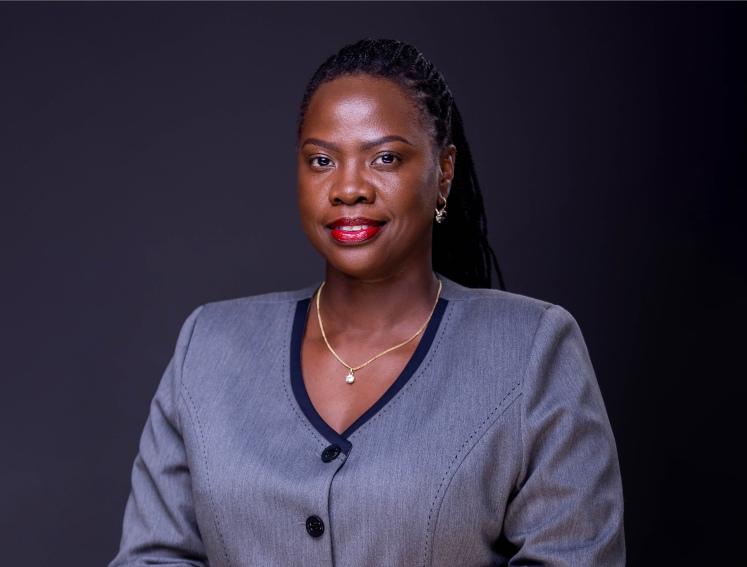

During the year in review, together with the relevant stakeholders, we conducted legal aid clinics on laws pertaining to employment law, financial fraud awareness, intellectual property rights and artificial intelligence.The legal aid clinics have enabled us focus on building long term partnerships with our stakeholders and to also jointly address social and environmental issues.
The Department has worked closely with the Board to ensure that we adhere to ethical business processes and enhance the Fund's reputation.Together, we have advocated for clear and transparent governance practices to build trust with our members and stakeholders for long term sustainable growth.
The Legal Department provides independent legal advice to all functions across the organisation by ensuring that they comply with all laws and regulations that are in place thereby avoiding legal risks and ensuring long term sustainability. In driving sustainable growth, the Department ensures that in all contracts that are executed, sustainability clauses are embedded, and sustainability practices are adhered to. In drafting and reviewing our policies, we ensure that they comply and are aligned with laws promoting diversity, equity, and inclusion.
Proactive legal risk management
Legal risk management has also remained key on the Department's agenda which has enabled us to proactively address legal risks which could impact on the Fund's business and minimise the litigation against the Fund.As a department, remittances of the members contributions are key on our agenda and during the year under review, we were able to collect close to UGX 8Bn of unremitted contributions through our recovery processes that are aligned to the strategic goals of the Fund.
Following the amendment of the NSSFAct, we have supported the various Departments in ensuring that the new provisions are implemented seamlessly without any disruptions to the Fund's Business, members, and all stakeholders.The amendment of the NSSF Act has made it possible to extend the Fund's coverage to the informal sector, we are therefore working with several stakeholders to render support in the formulation of voluntary regulations to deliver value to both the members and our stakeholders for long term sustainable growth.

“Anew day” has given us the opportunity as a department to evolve and devise solutions that will offer long-term value to our members and stakeholders without compromising the regulatory environment in which we operate.
We shall continue to leverage on strategic partnerships in the coming year to continuously improve our processes, sensitise the internal staff, our members, and key stakeholders on the provisions of the NSSFAct and emerging trends in laws that impact our business and operations.
We shall continue to support the business in the development of new benefits and products for our members sustainable growth. We shall continue to re-skill our staff on legal aspects of sustainability and evolve to automate our processes to improve our service delivery

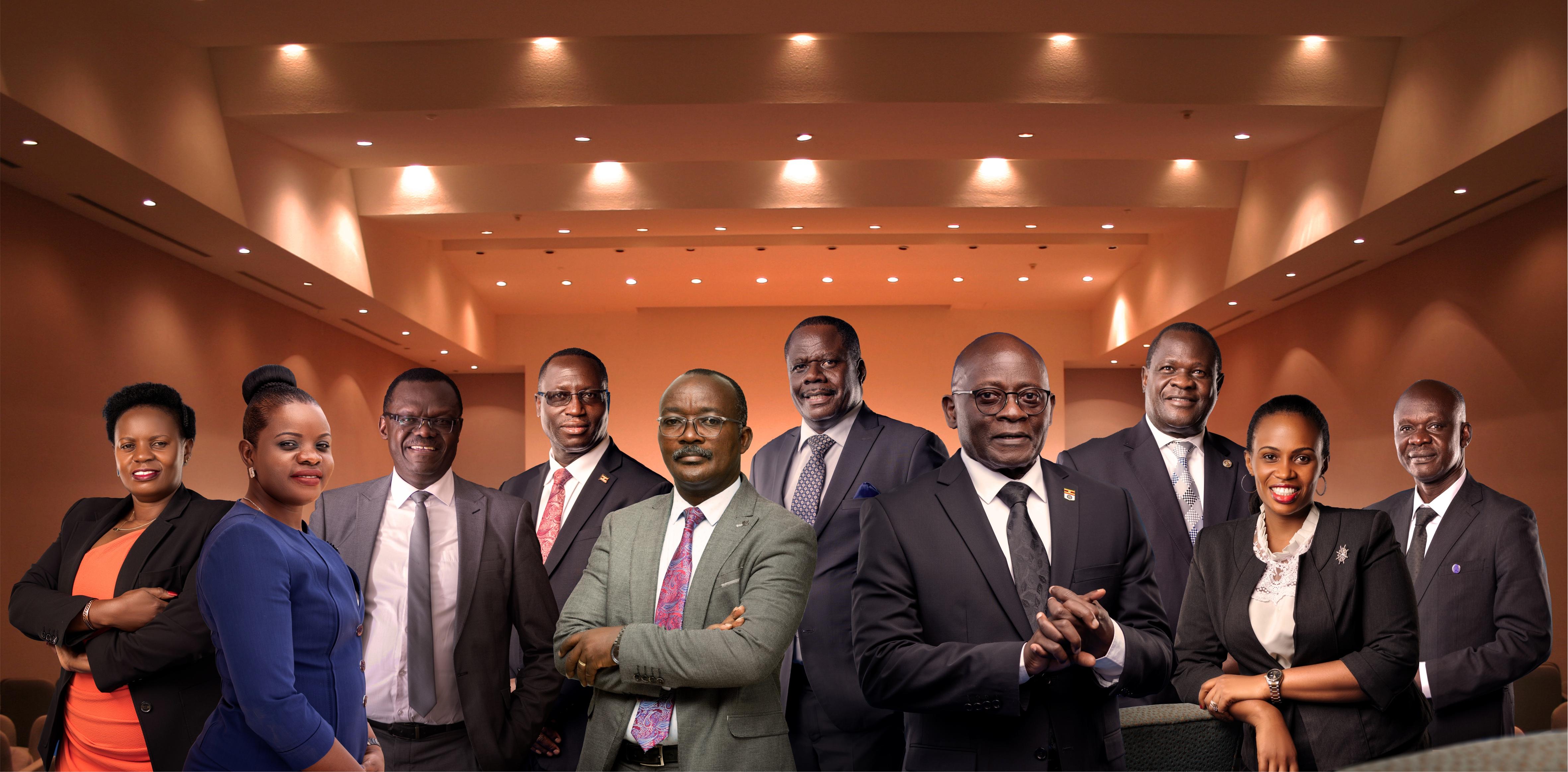
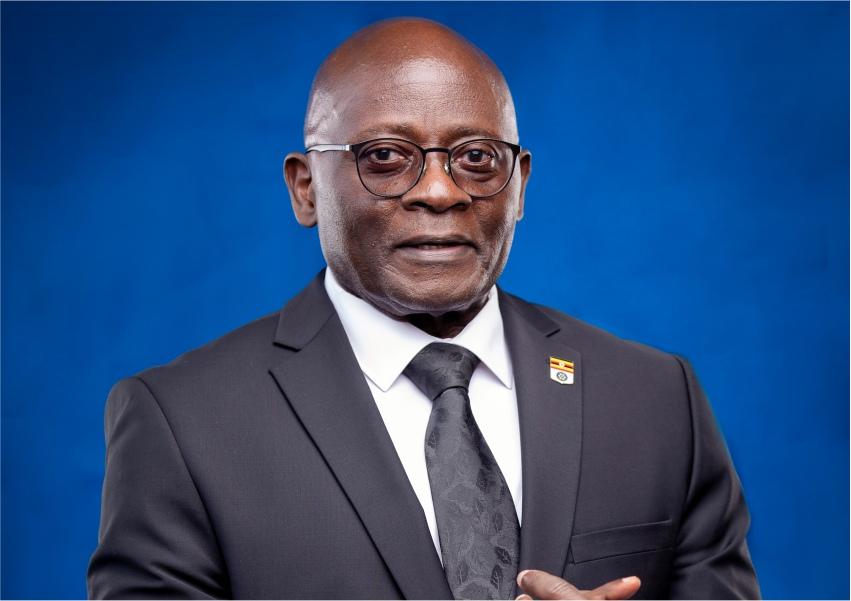
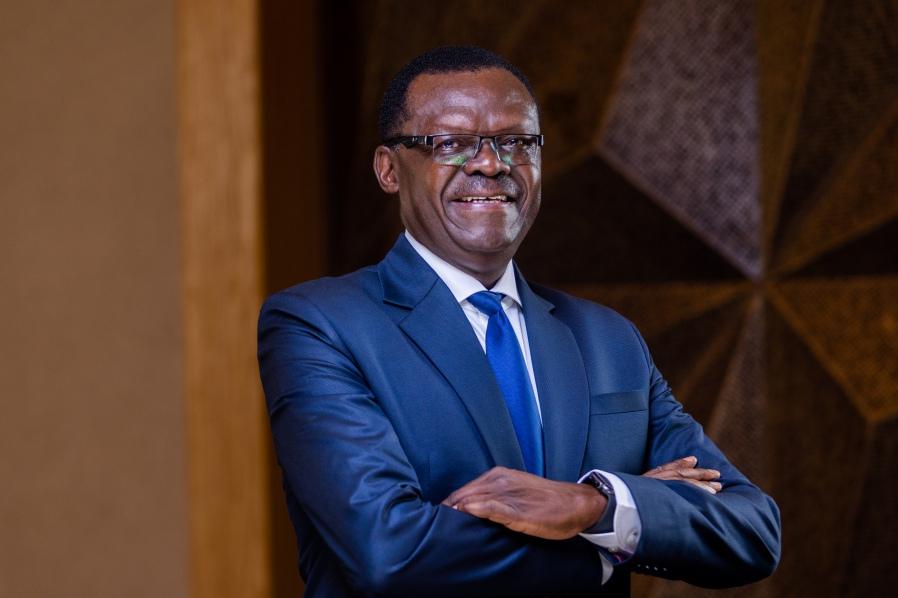
Mr PatrickAyota Managing Director
Appointed December 2022
Tenure 1 year 7 months (on the Board)
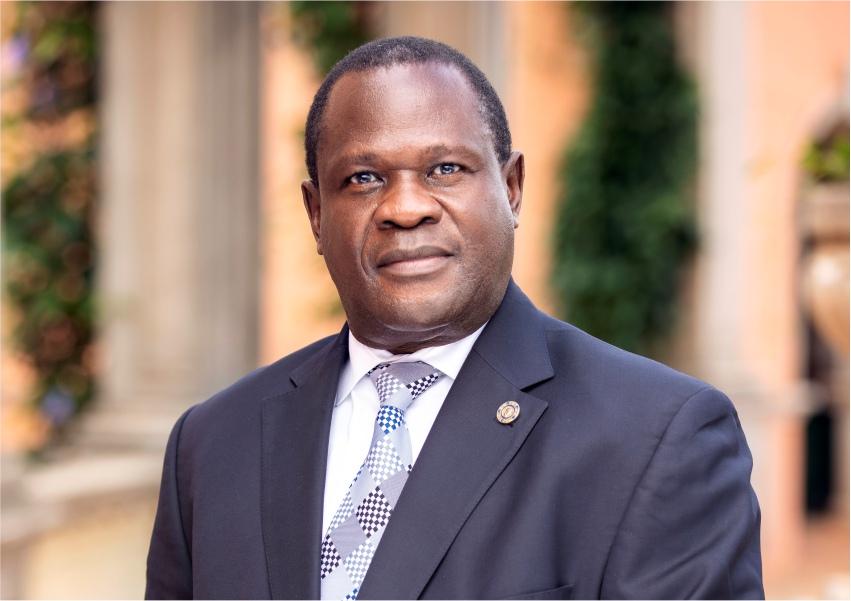
Mr. Patrick Ocailap
Non-Executive Director Government Representative from the Ministry of Finance Planning and Economic Development (MOFPED)
Appointed December 20213 Tenure 11 years 7 months
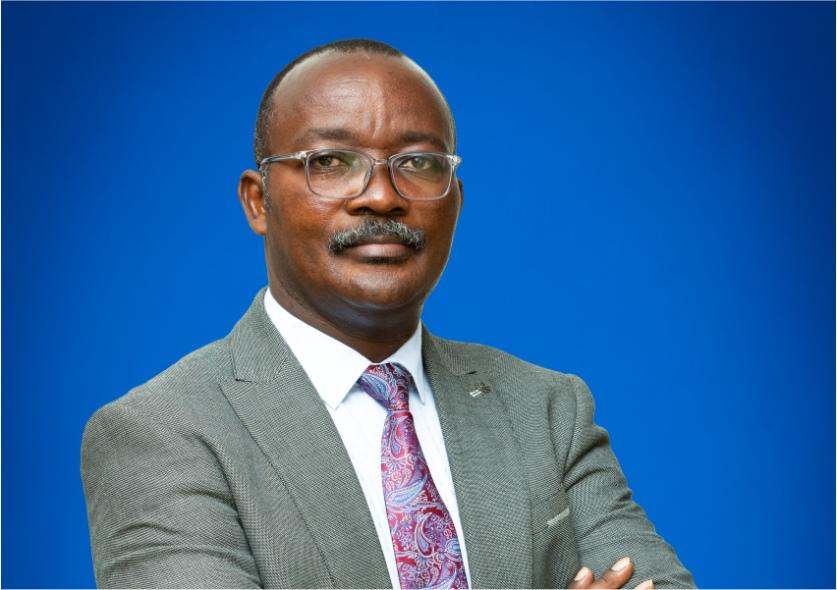
Qualifications
• Ph.D. in Engineering and Economics and Management from Makerere University – Uganda in Collaboration with PURCUniversity of Florida, USA
• MSc. Sanitary Engineering (Sector Utility Management)- IHE Delft-Netherlands
• BSc. Civil Engineering- Makerere University-Uganda
Other qualifications
• Fellow of the International Water Association and Sense Research School of the Netherlands
Qualifications
• Ph.D.- Commonwealth University/ London Graduate School
MBA (Strategy) -Maastricht/ ESAMI
Internationally Certified Coach – Cert. No. 12322 by International Coach Federation (ICF)
Certified member - American Management Association
Certified member- Harvard Business Review
Certified member – Association and McKinsey Global Internationally Accredited Clarity 4D Trainer
Business Partner Strathmore Business School (SBS)
Expertise
• Governance
Global Leadership Catalyst
Organizational and Transformational work Learning from the future
Sustainability Projects
Current Board Memberships
• Chairman of the Board NSSF
Chairman and Trustee CEO Summit Uganda ESKOM
Jubilee Allianz
League of East African Directors
Investment Advisor- Uganda Red Cross Society
Founder and Chairman of the Sustainability Center
Private Sector Foundation
Qualifications
• CPA(U) - Certified Public Accountant of Uganda
• MBA - University of South Carolina, USA
• Bachelor of Science Degree in Finance - Liberty University, Virginia, USA
• CPA - Georgia USA
Expertise
• Strategy formation and execution
• Innovation
• Financial reporting and accounting
• Taxation
• Leadership
• Project management
• Financial Analytics
Board Memberships
• Chairman of the Board of New Vision Group
• Non-Executive Director of Housing Finance Bank
• Board member ICPAU, (Quality Assurance)
Other Memberships
• League of East African Directors (LEAD)
• President ISSA focal liaison office East and Central Africa
Qualifications
• Master's Degree in Development Economics- William College, Massachusetts (USA)
• Bachelor of Commerce Degree (Finance)-Makerere University (Uganda)
• Certified Public Private Partnerships (PPP) Member from the Institute of Public Private Partnerships -IP3 (USA)
• Certificates in Public Finance, Tax Policy Statistics and Administration, Management, Strategy, and Leadership
Other Trainings
• Master Trustee Certification from Johannesburg School of Finance, South Africa
Expertise
• Development Economics
• Public Policy and Financial Management
• Strategy formation and execution
• Financial reporting, accounting, and taxation
• Risk Management
• Project management
• Governance and Compliance
Current Board Memberships
• Member of the Board of Trustees NSSF
• NSSF (Chairman of the Investments and Projects Monitoring Committee (IPMC)
• Uganda Airlines Company Ltd. Member of the Audit and Risk Assurance Committee – (ARC)
• National Housing and Construction Company Ltd
• Certificate in Public - Private Partnerships - 'Contractualisation in WSS - World Bank Institute, USA/AfWA
• Certificate in Corporate Governance: Enhancing Board Effectiveness - Institute of Corporate Governance of Uganda
• Certificate in Private Sector Participation - Catalyst2 - UK
• Certificate in Private Sector Participation - Stone & Webster Consultants - UK
• Certificate in Result Oriented Change Management - African Management Development Centre
• Certificate in Private Sector Participation and Financing - Technical University of Berlin - Germany
• Certificate in Utility Regulation and Strategy PURC-University of Florida, USA
Expertise
• Organisational development
• Business process re-engineering
• Capacity development, networking and partnerships development
• Performance development planning and implementation
• Project management, negotiations and financing
• Strategic management and enterprise reforms
• Performance monitoring and regulation
• Human resources development and productivity analysis
• Performance incentives design and benchmarking
• Cost-benefit analysis
• Hydraulic structures and design
• Management of Water supply and sanitation systems
• Public-Private Partnerships
• Operations research and industrial organization
• Stakeholder mapping and buy-in
Current Board Membership
• Member of the Board of Trustees NSSF
• President, African Water and Sanitation Association
• Chairman, Federation of Uganda Employers
• Chairman, Uganda Business and Technical Examinations Board
• Chairman, Governing Council of Uganda Technical College, Bushenyi
• Member Board of National Water and Sewerage Corporation
• Vice Head of Laity, Mbarara Archdiocese
• Member Umeme Limited
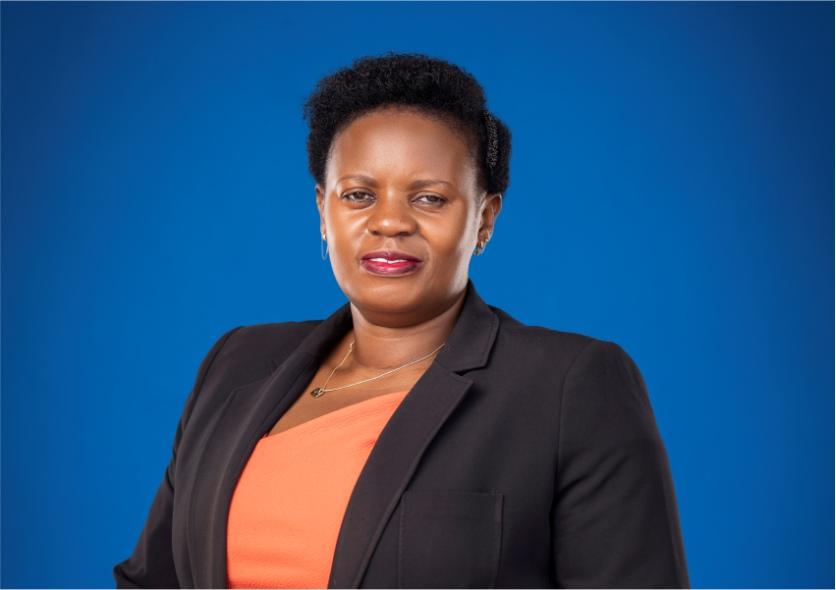
Qualifications
Ms.Annet Nakawunde Mulindwa Non-Executive
Director
Representative Federation of Uganda Employers
Appointed February 2022 Tenure 2 years 4 months
• Master's in Business Administration majoring in Finance - Makerere University Kampala. (2006 to 2009)
• Postgraduate Diploma in Financial Management - Uganda Management Institute. (2006 to 2009)
• Bachelor's Degree in Arts - Makerere University Kampala (1995 – 1998)
• Strategic Leadership in Inclusive Finance - Harvard Business School (USA).
• Business Continuity Management - Certificate in ISO 22301 Foundation.
• Balanced Scorecard Professional (BSP) - George Washington College of Professional Studies (USA) (September 2011)
• Advanced Leadership Training - Wharton Business School, University of Pennsylvania (USA).
Other qualifications
• Boardvisory Audit & Risk Training – South Africa (15th to 17th April 2024)
• Board Trustee Certification in Mauritius (11th to 15th December 2023)
• Corporate Governance, Risk & Ethics Management for Board Members – Dubai (30th October to 3rd November 2023)
• SACA Training – Mombasa (9th October 2023 to 14th October 2023)
• Financial Risk Management - London School of Economics
• Advanced Management Programme - Strathmore University Business School
• Coaching Programme for Mission, Leadership & Performance - Creative Metier Oxford (England) (June 2009 to December 2009)
• Strategic Management Course for Microfinance Practioners by The Microfinance Association UK-Washington DC (24th to 28th September 2018)
• Africa Board Fellowship by ACCION/ Centre for Financial Inclusion – Cape Town, South Africa (9th April to 11th 2018)
• Micro, SME & Housing Finance Summer Academy by the Frankfurt School of Finance & Management - Germany [July 2017]
• Strategic Response to Risk in Microfinance Markets by Boulder Institute of Microfinance and International Finance Corporation (IFC) [December 2016]
• Board and Audit Committee Workshop – Corporate Governance by The Institute of Internal Auditors Uganda [2014]
• Corporate Governance Training by Institute of Corporate Governance in Uganda [2013]
• Coaching Programme for Mission, Leadership and Performance by Creative Metier Oxford, England [June 2009 to December 2009]
• Training in Balance Scorecard by Ernst and Young [April 2009]
• Women in Leadership - Women's World Banking & Center for Microfinance Leadership (July 2008)
• (New York), awarded Financial Women Association's 'Financial Woman of the Year 2008'
• Basic banking by Institute of Bankers – Uganda
• Banking
Leadership
• Women Development
• Coaching • Asset-Liability Management
• Audit and Risk Management
• Corporate Governance
• Strategic Planning and Performance Management Awards and Achievements
Current Board Memberships
• Member of the Board and Chairperson Audit and Risk Assurance Committee NSSF
• Member of the Board Finance Trust Bank (FTB)
• Member of the Board Agent Banking Company Limited (ABC)
• Member of the Uganda Revenue Authority Tax Agents' Registration Committee (TARC)
• Deputy Chairperson - Federation of Uganda Employers (FUE)
• Member of the Board Private Sector Foundation Uganda (PSFU)
• Member of the Board Buganda Heritage Culture and Tourism
• EXCO Member of the Uganda Banker's Association
• “Financial Woman of the Year 2008” by Women's World Banking, New York, USA, 2008
• “Appreciation Award” by The Lions Club of Entebbe, Uganda. (2015)
• “Honorary Fellow Award” by Uganda Institute of Banking and Financial Services. (2015)
Previous Board Memberships
• Board Member and Chair Audit Committee Rural Electrification Agency (2018 to 2020)
• Chairperson of the Microfinance CEO Working Group Uganda, [October 2016 to 2018)
• Member of the Board of Trustees, The Insurance Institute of Uganda (IIU) [December 2016 t0 2020]
• Vice President, Association of Microfinance Institutions in Uganda (AMFIU) [September 2016]
• EXCO Member of the Uganda Banker's Association as Honorable Auditor [2015 to May 2018]
• Member of the Board, Association of Microfinance Institutions in Uganda (AMFIU). [2015 to August 2016]
• Member of the Board of Network of African Business Women in Uganda (NABWU) [2014 to 2015]
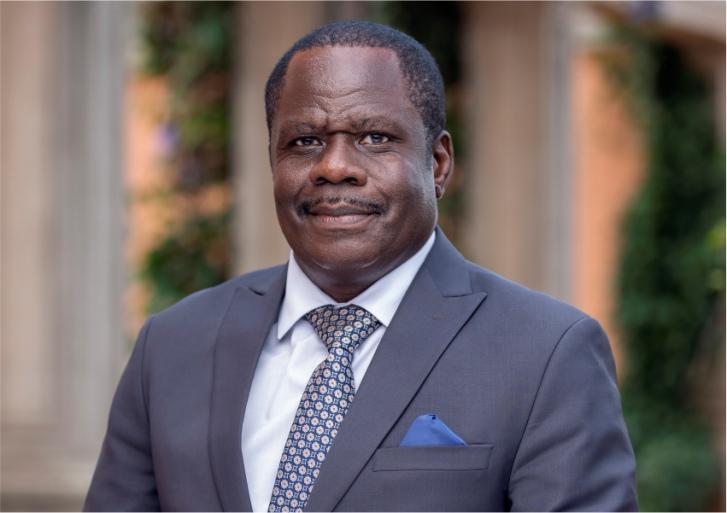
Qualifications
• Bachelor of Medicine and Bachelor of Surgery Makerere University Uganda
• Master of Business Administration
• Master of Science in Community Health
• Master of Public Administration and Management
• OakSeed Executive Leadership Course of the Institute of National Transformation (INT), USA
• Leadership Training Programme on Servant Leadership of the Sundoulos African Leaders' Training (SALT) Programme in Partnership with Development Associates International, USA
• Course in Key Labour Market Issues in Africa of the World Bank Institute, Global Development Learning Network Centre, Uganda Management Institute
Other training
Executive Training from various institutions like ESAMI in:
• Leadership
• Corporate governance
• Accounting
• Project management
• Social security
• Financial analysis
• Labour and human resource management and workers education
• Advanced auditing
• Proactive management
• Investments
• Accredited Master Trustee training by Johannesburg School of Finance, South Africa
Expertise
• Medicine and public health
• Occupational health and safety
• Human resource management and public administration
• Leadership
• Legislation and representation
• Social security and health insurance
• Business administration
• Human rights, labour rights and labour markets
• Stakeholder and people management
• Strategic and proactive management
• Lobbying and critical thinking
Board Memberships
• Member of the Board of Trustees NSSF
• Secretary General of the Central Organisation of Free Trade Unions (COFTU)
• Social Security Sector Coordination Committee
• Labour Advisory Board
• Hosanna Uganda
• Lodoi Development Fund
• Uganda Medical Association
• Workers Ministries
• Various ILO and international labour movement Tripartite Technical Panels and committees
• General Secretary of the National Union of Lawyers, Judicial Officers and Allied Workers Union (NULJAW)
• Deputy Secretary General Central Organization of Free Trade Unions (COFTU)
Other Memberships
• League of East African Directors (LEAD)

Qualifications
• Master of Laws (Makerere University (Uganda)
Appointed September 2015
• Post Graduate Diploma in Legal Practice -Law Development Centre
• Bachelor of Laws-Uganda Christian University
Other Trainings
• Post-graduate training on National Governance of Occupational Safety and Health from International Training Centre – Geneva
• Mediation Training by Justice Centers – Uganda
• Corporate Governance Training by Euromoney Learning Solutions
• Corporate Governance and Risk Management Training by Global Focus Training Group
• World Bank Pension Core Course, 28th April 2018 intake by World Bank, Washington, DC, USA
• Accredited Master Trustee training by Johannesburg School of Finance, South Africa
• Strategic approach to investment by Public Administration International, London, United Kingdom
• Trustee trainings by Uganda Retirement Benefits Regulatory Authority
• The effective director training by Strathmore Business School, Nairobi
• Corporate Governance and Human Resource by Public Administration International (PAI) London, UK
• Master Trustee Certification from Johannesburg School of Finance, South Africa
• Certification on Pension Funds by World Bank, Washington DC
• Investments Training, Public Administration International (PAI) Expertise
• Legal Expertise
• Labour Law and Arbitration
• Human Resource Management and Development
• Corporate Governance
• Employment Advisory
• Commercial Law
• Dispute Resolution
• Taxation
Current Board
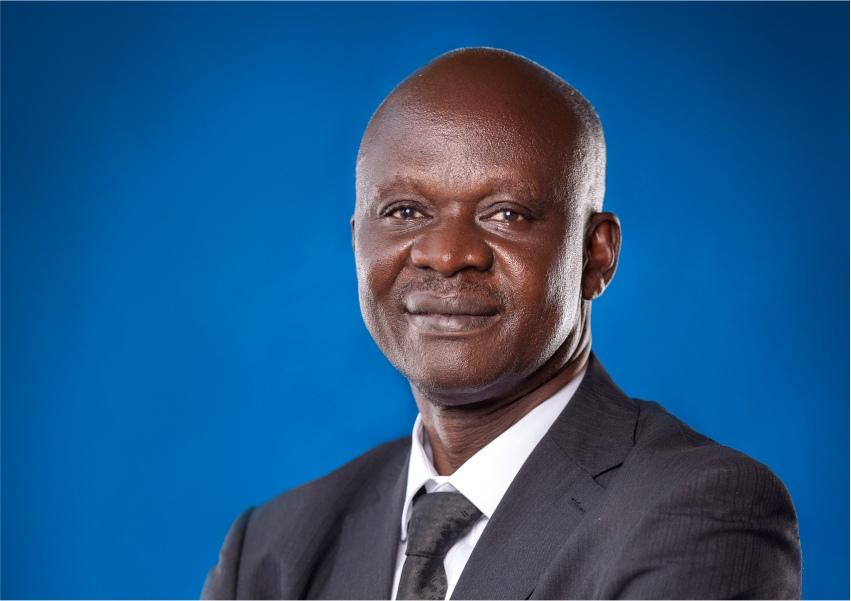
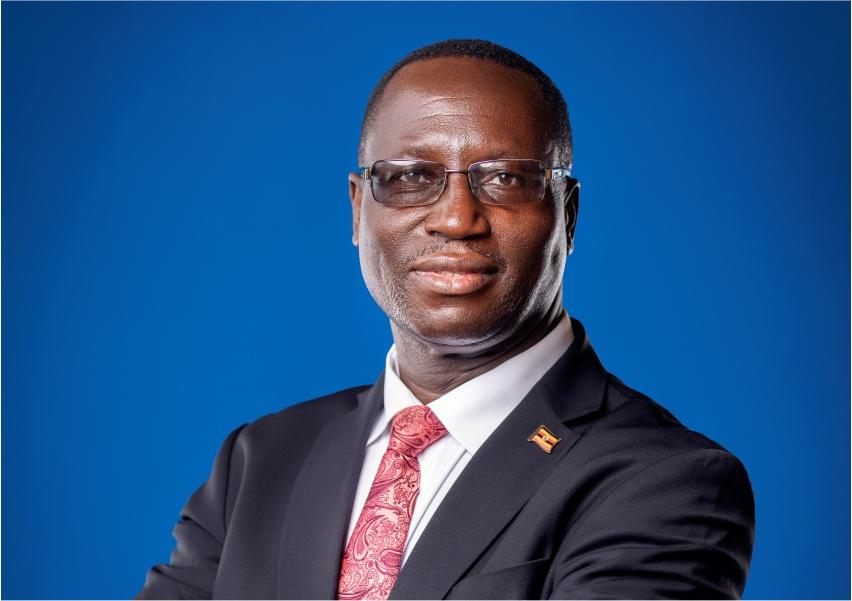

Qualifications
• Masters in Management Studies
Appointed September 2021
Tenure 2 years 10 months
Qualifications
• Bachelor of Laws Degree from Cavendish University Uganda (CUU)
• National Diploma in purchasing and supplies management from Nakawa Institute of Business Studies (NIBS)
Expertise
• Law
• Procurement
• Labour rights
• Organizational Management
• Negotiation skills & Alternative Dispute Settlement skills (ADR)
Current Board Memberships
• Member of the Board of Trustees NSSF
Appointed November 2020
Tenure 3 years 8 months
Qualifications
• Master of Public Administration and Management Makerere University Kampala
• Bachelor of Education-Makerere University
• Diploma in Education- National Teachers' College, Kakoba
• International Advanced Trustee Professional Development Course from the Johannesburg School of Finance 12th to 16th February 2024 Zanzibar, Tanzania
Expertise
• Education
• Leadership
• Strategy formation and execution
• Risk Management
• Project Management
• Public Policy
• Business Development
• Governance and Compliance
• Project Management
Current Board Memberships
• Member of the Board of Trustees NSSF
• Member of the Board Organisation of African First Ladies for Development, Uganda
Ms. Annet Birungi Non-Executive Director, Workers Representative (National Organisation for Trade Unions)
Appointed February 2022
2 years 4 months
• Post Graduate Diploma in Hospital and Health Care Management from Uganda Management Institute
• Bachelor of Science Degree in Nursing Science from International Health Science University
• Certificate in Registered Nursing from Mulago School of Nursing and Midwifery
• Certificate in Enrolled Nursing from Kabale School of Nursing and Midwifery
Other Trainings
• Proactive Management Programme by ESAMI, Arusha Tanzania
• Advanced Auditing Programme
• Retirement Fund Trusteeship Programme
• Corporate Governance, Risk & Ethics Management
• Investment Management and Finance Accounting Programme
• Finance and Accounting (Advanced Auditing)
• Boardvisory International Board Excellence Programme
• Proactive Management
• Water Management & Climate Resilience Training
Expertise
• Professional nurse
• Lobbying and Advocacy skills
• Labour laws and international labour standards
• Strong leadership and teamwork skills
• Strategy formulation and direction
• Interpersonal, motivational, Counseling and guidance skills
• Report writing skills
• Investment Management skills
• Monitoring and evaluation skills
• Analytical skills
• Risk management and Prevention skills
• Retirement management and trust ship skills
Current Board Membership
• Member of the Board of Trustees NSSF
• Member of National Organization of Trade Unions Executive Board
• Member of Central Executive Committee of Uganda Nurses and Midwives Union as a General Secretary



The Board comprises Directors with a wide variety of skills and experience to effectively lead the strategic direction of the Fund.The 12th Board is diverse and balanced.
The Stakeholder Board is headed by the Chairman and consists of:
• Ten Directors appointed for a three-year term renewable once in line with Section 3 of the NSSFAct Cap 230
• Directors represent each of the key stakeholder groups of members, employees, employers, and Government, and include:
- One Executive Director (ex-officio); and
- Nine Non-Executive Directors
As of 30 June 2024, eight of the Non-Executive Directors were independent as defined in the governance codes and our Board Charter, which represents 88% of the Board.
Directors are considered by the Board to be independent of Management and free from any business relationship or other circumstance that could materially interfere with objectivity, unfettered or independent judgement.The independence of each Director is assessed annually by the Board as part of its annual Board Effectiveness Review and in conducting its current assessment, it was concluded that all Directors continue to bring strong independent oversight and demonstrate those qualities and behaviours it regards essential to be considered independent as set out in their terms of reference and Board Charter.
The Chairman is independent and in line with best practice, his roles are separate from those of the Chief Executive Office.
The Minister responsible for Social Security, currently the Minister of Gender Labour and Social Development, appoints Directors for a three-year term renewable once.The MD is recommended by the Board and appointed by the Minister Under section 3(4) of the NSSFAct Cap 230, a Director may, by writing in his/her hand a letter addressed to the Minister of Gender, resign his/her office.
During the year under review, Mr. Patrick MichealAyota was appointed to the Board as an Executive Director following his appointment as the Managing Director of NSSF on 18thAugust 2023.
The term of office for Dr Peter Kimbowa, Mr Patrick Ocailap and Mr Lwabayi Mudiba Hassan ended on 31August 2024.
On 1 September 2024 Dr David Ogong was appointed as the new Chairman. On the same day, Mr Ramathan Ggoobi and Mr Richard Bigirwa were appointed as new members of the Board.
The Board appoints the Fund's senior management/Executive Committee.The Board is responsible for succession planning for key management roles. During the year under review, the Board considered and approved the appointment of Rhona Kyomuhendo asActing Head of Procurement and Disposal Unit.
The Board further reviewed the management composition and succession planning to ensure that the successors for key roles, including that of the MD and Deputy MD, are identified and their performance assessed.
The Board considers that the development of industry and Fund knowledge is a continuous and ongoing process. Upon joining the Fund, each Director undertakes an induction programme to further their understanding of the nature of the Fund, its business, and the environment in which it operates, and enhance their knowledge of the Fund's operations and staff.The induction programme is tailored to each new director, depending on individual experience and background.
The Corporation Secretary maintains the Directors' annual training records for regular review by the Board.
In addition to Directors' attendance at meetings and review of relevant materials provided by Management during the year, they attended professional training to enhance their skills and knowledge.
The programme was designed to support the NSSF board of directors in managing their risks and practicing good corporate governance.This provides a competitive advantage, as they consciously take risk management into account, anticipate adverse changes, hedge, and protect themselves from such changes, thereby reducing negative financial outflows.
The programme equipped the NSSF Board members with the essential legal, investment and related knowledge required to become effective trustees and oversee their fund's activities with confidence.
The training for the Investments and Project Monitoring Committee members was designed to equip them with an understanding of investment policy portfolio management, and asset diversification. It also enhanced their knowledge of governance in the context of aTrustee Board and the legislative requirements for investing scheme assets.Additionally, the training covered the management of different asset types, including equities, bonds, real estate, and alternative assets such as private equity and hedge funds.
The training for theAudit and Risk Committee members was designed to enhance their understanding of cybersecurity, compliance, and audit functions. It also focused on improving financial reporting, risk management, fraud prevention, and ESG governance.Additionally, it aimed to equip members with the skills to develop and execute an effectiveARC workplan.
The training was aimed at equipping the Finance Committee members with skills to effectively manage and oversee financial operations, ensure compliance with legal and regulatory requirements, and enhance their ability to mitigate and manage financial risks.
At the International Labour Conference, delegates addressed topics such as protection against biological hazards, fundamental rights at work, and the care economy The Conference also elected the Governing Body for the 2024-27 term.
The training focused on rebuilding trust and teamwork within the NSSF Board and EXCO after a period of external scrutiny and probes from Parliament.The programme aimed to restore the organisation's morale and performance by addressing relational challenges, fostering a people-centric culture, and preparing the NSSF to better withstand future shocks.
As part of the Continuous Professional Development Programme, the Board members from time to time receive presentations from senior executives in the Fund on significant matters.The Fund also arranges appropriate regional branch visits and seminars covering the Fund's operations, the industry and governance matters for the Directors to facilitate their understanding of the Fund business and risks associated with the Fund's operations.
The Board and Management also periodically meet to discuss the strategy of the Fund and how best it can be aligned to the needs of the members.
Continuous development of the Board and Management remains a key area in a bid to improve corporate governance. In the year under review, the Board, EXCO together with the InternalAudit, Risk and Legal and BoardAffairs Department were trained in Integrated Reporting and CombinedAssurance.
This has enhanced the level of reporting by Management to the Board, thus strengthening leadership capability and focusing on strategic issues.
TheAssurance Departments have also devised a work plan to strengthen collaboration of the assurance functions in executing their assurance roles, but at the same time not impairing their independence.
The Chairman shall preside at all meetings of the Board, but in his absence any member appointed on his behalf by the members present shall preside.The Board shall meet for the discharge of its functions at least once every three months at such time and place as the Chairman may appoint or upon the request of most of the Board members.
Asimple majority of the members present shall take decisions of the Board and voting, with the person presiding having a casting vote.
Section 5 (5) NSSF of theAct empowers the Board to invite or co-opt any person to attend any Board meeting or be consulted as an independent advisor, but such a person shall not be entitled to vote on any matter being decided by the Board at that meeting.The Board shall determine the area or field where professional advice is required. Management follows the PPDArules and regulations to engage the advisors so required. Management therefore co-opted the services of Engineer Kenneth Ssemwogerere and Mr. Felix Okoboi as Investment and Project Monitoring CommitteeAdvisors together with Mr Albert Richards Otete as theAudit and RiskAssurance CommitteeAdvisor
Dr. Peter Kimbowa
Mr. Patrick Ocailap
Mr Aggrey Kibenge
Dr. Silver Mugisha
Dr. Sam Lyomoki
Ms.Annet Birungi
Ms. PeninnahTukamwesiga
Ms.Annet Nakawunde Mulindwa
Mr. Lwabayi Hassan Mudiba
Mr. PatrickAyota
The Fund's governance structure is illustrated in the NSSF Governance Structure diagram and shows the interaction between the members and the Board, demonstrating how the Board Committee structure facilitates the relationship between the Board and the MD and indicates the flow of delegation from members. We have robust processes in place to ensure that the delegation flows through the Board and its Committees to the MD and EXCO into the organisation.At the same time, accountability flows upwards from the Fund to its members.This process helps to ensure alignment and open communication with our members and all our stakeholders. Governance structure

The Board is governed by an internal Board Charter which stipulates the parameters within which the Board operates and ensures the application of the principles of good corporate governance in all its dealings.The Charter sets out the roles and responsibilities of the Board, its committees, and individual Directors, including its composition and relevant procedures of the Board.The Charter is aligned with the provisions of the UK Code and King IV Code on Corporate Governance.
As the custodian of good governance, the Board Charter is reviewed annually and provides minimum standards and guidelines for the Board in the execution of their duties.

The Board of Directors are responsible for the Fund's vision, strategic direction, its values, and governance by providing effective leadership towards:
1. Ensuring good governance of the Fund by enhancing its long-term sustainable success.
2. Determining the Fund's strategic objectives and organisational values.
3. Setting up appropriate governance structures for the management of the Fund's business operations.
4. Setting responsibilities, performance targets and evaluating management performance.
5. Ensuring that human resources are in place and oversees succession planning for senior management to meet its objectives.
6. Establishing policies and processes to guide the legal compliance and delivery of services.
7. Monitoring the management and implementation of plans and strategies quarterly.
8. Carrying out a review of internal control policies, risk management and procedures, and ensures their effectiveness.
9. Approving and monitoring the progress of major investments in line with S.31 of the NSSFAct Cap 230.
10. Approving and monitoring major contracts, acquisitions, and disposals.
11. Advising the Minister of Finance, Planning and Economic Development on the appropriate rate of interest to be declared on members' accounts.
12. Ensuring ethical behaviour and compliance with the laws and regulations.
The responsibility of the Directors is to exercise their independent judgement in the best interest of the Fund and its members, by:
• Participating in all Board meetings to bring an independent judgement on strategic issues of the Fund
• Taking the lead where potential conflicts of interests arise
• Scrutinising and monitoring the Fund and Management's performance in achieving agreed corporate goals
• Making a positive contribution to the development of the Fund's strategy and policies through independent, ethical, and informed decisions
• Engaging with senior management and other relevant parties, such as professional advisors, external or internal auditors and the Fund's legal department, to ensure that it appropriately addressed the various concerns and issues

The Non-Executive Directors meet separately as and when is needed. During the year of review, they met to discuss the transition of management at the Fund and relevant succession planning.
For period ending 30 June 2023:
Finance Committee reviewed and discussed:
• The Financial report
• Commercial report
• Operations report
• IT report
• Procurement and Disposal Unit report
ARC reviewed:
• The Legal and Board Affairs report
• Internal Audit report
• Risk Management report
IPM reviewed:
• The Investments Implemented report
• Quarterly Investments report
• The update on Property Management
• The update on Real Estate projects
SACA reviewed:
• Staf updates.
• Marketing and Communications report
• People and Culture report
• Long Service Award update
Extra ordinary full Board meeting to consider the appointment of the Managing Director
Extra ordinary Board Meeting to consider the report from Japheth Kato consulting (JK) on the review of the Board Charter 2020 for adoption
ARC considered and recommended the contract renewal of Head of Internal Audit
Finance Committee considered the update on the approval of the NSSF budget 2023/2024
The ARC and Finance Committee had a combined meeting to consider the proposed interest declaration rate
SACA reviewed and considered:
• Renewal for three senior managers
• Recruitment of Head Procurement and Disposal Unit
• Staff appraisals, salary review proposals
• Performance bonus for FY 2022/2023
Ordinary full Board meeting to review of the draft NSSF Audited Financial Accounts FY 2022/2023:
• Consideration of interest rate proposed for FY2022/2023
• Received and reviewed the Management Letter
• Submission of proposed interest rate FY2022/2023.
• Staff appraisal moderation
Finance Committee reviewed and discussed:
• Financial report
• Business report
• Operations report
• IT report
• Procurement report
ARC reviewed:
• Legal and Board Affairs report
• Internal Audit report
• Risk Management report
• The update on Property Management
SACA reviewed and considered:
• Managing Director's update of the Fund's performance as at 30th September 2023
• Marketing and Corporate Affairs report
• People and Culture report
• Proposed Executive Committee Succession plan
• Critical key staff/talent
IPM reviewed:
• The Investments Implemented report
• Quarterly Investments report
• The update on Property Management
IPM also considered:
• Update of the investment performance of UMEME from Initial Public Offering to date
• The update on Real Estate projects
• NSSF Real Estate projects
• Contracts of IPMC consultants
• Paper on interest declaration on closing balance approach and prospects of an NSSF annuity approach
• Update on the sale of Murram at Temangalo
Ordinary Board meeting to consider:
• Director's nominations to investee companies
• The Board ratified the circular resolution to approve the Airtel Uganda Ltd Initial Public Offering in Q1
• The training reports for the Board development activities undertaken
The Board undertook a training on Board Corporate Governance Ethics and Risk Management
The Board action plan for FY2024/2025 will cover the following areas:
• Achieving a technology-driven strategy in a balanced portfolio of pragmatic investments
• Ensuring that the Fund achieves a stable but agile culture
The Full Board undertook a training on Board Trustee Certification
• Operationalising the NSSFAct Cap 230 to ensure that members' needs in terms of new products and easy access to benefits is enhanced
• Diversifying the Fund's investment portfolio
• Broaden and deepen the footprints into sustainability
SACA reviewed and considered:
• Updates on the Deputy Managing Director and Head Procurement and Disposal Unit functions
• Marketing and Communications report
• People and Culture report
• Two senior manager appointments
Finance Committee reviewed and considered:
• The NSSF financial performance report for quarter 2 ending 31st December 2023
• Commercial report for quarter 2
• Technology and Enterprise Solutions report for quarter 2
• Procurement and Disposal Unit report for quarter 2
• Opening new bank accounts for the Smart Life products operationalisation
ARC reviewed:
• The Legal and Board Affairs quarterly report
• The Internal Audit quarterly report
• Risk Management quarterly report
• The Liquidity stress report
• The Foreign Exchange report
• Proposed revised Board Charter
IPM reviewed and considered:
• Quarterly Investment report
• Real Estate projects quarterly report
• Property Management quarterly report
• Proposed changes to the Investments and Procedures Manual
Non-Executive Directors Meeting to review the 12th Board’s performance from September 2021 to February 2024
Ordinary full Board meeting to consider:
• Quarter 2 Management reports from the various Committee reports for the period ending 31 December 2023
• The training reports for the Board Development activities undertaken (Board Trustee Training)
No activities undertaken
Joint Board and Executive Committee Strategy Workshop to consider Management Workplans for FY2024/2025
SACA reviewed and considered:
• Marketing and Communications report
• People and Culture report
• The draft NSSF organisation structure
• Update on the Brand Policy
• Medical Scheme
• Budgets for Marketing and Communications Department for FY2024/2025
• Budget for People and Culture Department for FY2024/2025
The ARC undertook customised training
IPM reviewed and considered:
• Update on the economy and implications for the Fund's Investment programme
• Quarterly Investment report
• Real Estate projects quarterly report
• Property Management quarterly report
and approval of the final NSSF organisation structure design
Finance Committee reviewed and considered:
• The NSSF Budget for FY 2024/2025
• Quarterly Financial Performance report
• Quarterly Commercial report
• Quarterly Technology and Enterprise Solutions report
• Quarterly Procurement and Disposal Unit
• Quarterly Strategy report
• Consideration of budget highlights for the Finance, Commercial, Technology and Enterprise Solutions, Procurement and Disposal Unit, and Strategy Departments for the FY2024/2025
ARC reviewed:
• The Legal and Board Affairs quarterly report
• The Internal Audit quarterly report
• Enterprise Risk Management quarterly report
• Information Technology insights report
• Update on various Fund matters
• Terms of Reference for the procurement of an IT Risk advisor to the Board
• Budget highlights for the Legal and Board Affairs, Enterprise Risk Management, and Internal Audit departments for the FY2024/2025
IPM reviewed and considered:
• Investment department budget 2024/2025
SACA reviewed and considered:
• Final NSSF organisation structure
• Marketing and Corporate Affairs budget FY2024/2025
• People and Culture budget FY2024/2025
• Update of the Brand Policy
Ordinary Board Meeting to consider:
• The proposed Fund budget for FY2024/2025
• Committee reports for quarter 3 ending 31 March 2024
The Fund's governance structure enables interaction between Management, members, and the Board.
The Board is supported by four standing Committees: StaffAdministration and CorporateAffairs Committee, Finance Committee, Investments and Project Monitoring Committee and theAudit and Risk Committee.
Discussions are still ongoing regarding the establishment of an independent Governance Committee to oversee succession planning of the Board and ESG issues.
Audit and RiskAssurance Committee (ARC)
Chairperson
Members of committee (period 1 July 2023 to 30 June 2024)
ProfessionalAdvisors
Committee purpose and how it contributes to value creation Declaration
The Committee is satisfied that it has fulfilled its mandate as set out in the Committee's terms of reference and work plan as required in the Board Charter during the period under review
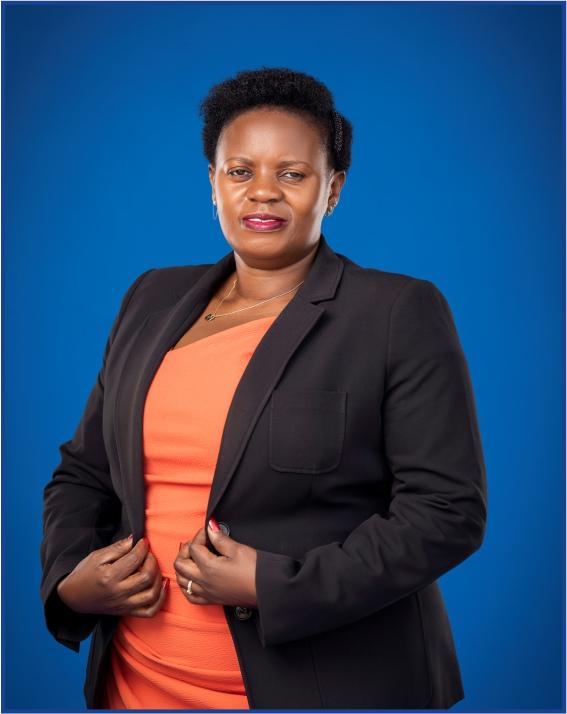
The Committee is made up of only Non-Executive Directors and the MD only attends by invitation.The Head of InternalAudit reports directly into this committee which ensures independence of the InternalAudit function.The Corporation Secretary is the secretary of the Committee, the Head of Enterprise Risk Management and Head of InternalAudit may attend meetings upon request as ex-officio members.
The Committee helps the Board to effectively discharge its oversight responsibilities for financial reporting, risk management, internal controls, internal and external audit, regulatory compliance, and governance.
TheARC, on behalf of the Board, undertakes detailed monitoring of internal controls through the InternalAudit function.The Board has reviewed the system of internal control, including financial controls, for the year under review up to the date of approval of this Integrated Report.
Each of the standing Committees has formal and approved terms of reference stipulated in the Board Charter.
The Committees' functions are for purposes of review, oversight, and monitoring.Their duties include investigating and analysing the relevant information and reporting back with recommendations to enable the Board to make appropriate decisions.
These Committees have delegated responsibility to assist in specific specialist matters on a collaborative basis and provide reports of their activities and recommendations to the Board on a quarterly basis or as often as is necessary
The constitution, focus, activities, and outlook for each of the Board Committees are outlined below:
KeyARC Milestones in the FY2023/2024:
• Considered the InternalAudit reports and evaluated the extent of implementation of corrective actions by Management. Most of the audit recommendations had been resolved by the end of FY2023/24
• Considered the significant issues raised by InternalAudit including issues raised through investigations, whistleblower cases, management requests and risk-based audit processes
• Enhanced the independence of the internal audit and positioning of the enterprise risk management functions.The level of assurance and quality of reporting has improved through independent views, insights and challenges faced by the Fund
• Enhanced risk management through promotion of culture of risk awareness, understanding risk appetite and adequate risk response and management of strategic risks
ARC Committee's key activities in FY2023/2024 included oversight, review, and consideration of:
• The quarterly reports of the InternalAudit, Enterprise Risk Management, Legal and BoardAffairs departments
• The quarterly risk and insight reports onTechnology and Enterprise Solutions department
• The draftAudited FinancialAccounts, ExternalAudit conclusion report and Management letter FY2022/2023
• Proposed Interest Rate for FY2022/23
• The proposed changes to the Board Charter 2020
• The external audit plan for FY2023/24 and the related scope of work
• The InternalAuditAnnual Plan and Balanced Scorecard (BSC) for FY 2024/2025
• The departmental budget highlights for the FY2024/25 for the InternalAudit, Legal and BoardAffairs, and Enterprise Risk Management
• The extension of theARCAdvisor's contract
• The liquidity stress test and foreign exchange risk reports
• The contract renewal of the Head InternalAudit
• Update on various Fund land matters
• ARC training report on the Committee Development activities
Key engagements and considerations:
• Engagements were held between Members of theARC and the Head of InternalAudit in confidence to appraise themselves on key audit matters
• The Committee met with the external auditors at the beginning of the audit and discussed the scope of their work, assessment of their independence, audit plan, findings, and recommendations of the previous audit
• The Committee undertook a customised training programme where key action points on theARC mandate were adopted for implementation
• The Committee co-opted theTechnology Enterprise Solutions Officer in the quarterly meetings to provide an understanding and awareness of the InformationTechnology risks especially cyber security risks
• The Committee engaged the litigation section to appraise themselves with the litigation risks faced by the Fund, especially the land related matters
Key focus for the following year FY2024/2025:
• Emphasise risk culture in the decision-making processes through continuous awareness and training on risk management
• Enhance due diligence processes during the acquisition and/or procurement of investments to ensure that risks are highlighted and mitigants put in place
• Provide oversight over information technology risks especially the stability of the core system and new innovations in the areas ofArtificial Intelligence and machine learning
• Emphasise the review of management financial performance reporting to assure compliance with the international financial reporting standards and accounting practices
The Investments and Project Monitoring Committee of the Board complied with its mandate for the year under review All scheduled meetings were held.
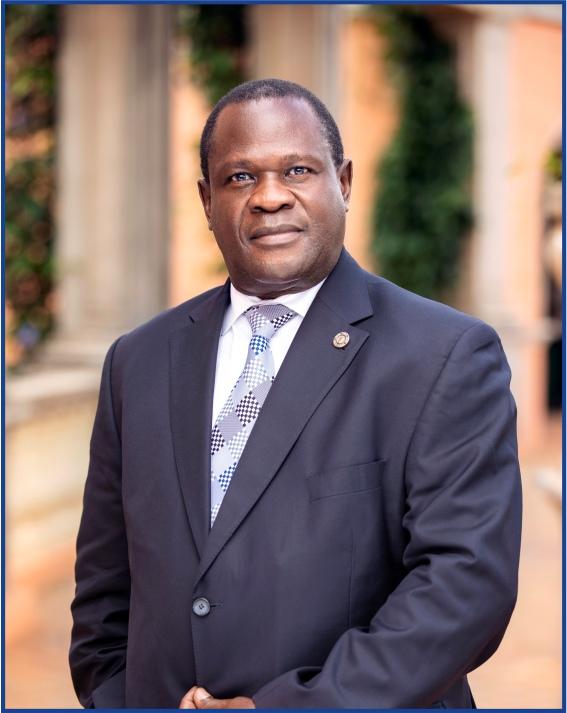
The Investments and Project Monitoring Committee (IPMC) of the Board is responsible for assisting the Board to fulfil its oversight responsibility as provided under Section 31 of the NSSFAct Cap 230, which states:
“All monies in the Fund, including the reserve account, which are not for the time being required to be applied for the purpose of the Fund shall be invested in such investments as may be determined by the Board in consultation with the Minister.”
The main responsibilities of the Committee include:
• Providing a deeper understanding of investment activities to the Board
• Reviewing, analysing and recommending all investment proposals to the Board for consideration
• Recommending an investment strategy, policies, and guidelines to the Board for approval
• Reviewing and recommending investments in equities, fixed income and real estate and the associated budgets to the Board
• Reviewing and recommending investment design concepts and master plans to the Board or changes thereto
• Reviewing performance of real estate projects, equities, and fixed income quarterly, in line with set targets and recommending to the Board
IPMC's key milestones in the FY2023/24:
• There was tremendous growth in the investment returns over the past year, especially in the fixed income portfolio
• Increased membership arising from the amendment of the NSSFAct availed increased contributions for investment purposes
• Recovery from the significant unrealised foreign exchange losses suffered during the FY2022/23
• Maintained the investment levels within the real estate portfolio
IPMC Committee's key activities in FY2023/2024 included review, analyse, monitor and recommend to the Board:
• The proposed changes to the Investment Policy Statement (IPS) and Investments Manual
• Consideration of the Project and Change Management Policy
• The quarterly updates on the investments implemented, the Real Estate Projects, Property Management, and the Hi-Innovator Programme
• The review of the economies in the Fund's investment universe and implications for investments
• Updates on the exchange and equity losses and the impact on performance
• The integration of the Fund strategy into the National Development Plan 4 (NDP4)
• Review of external fund management
• The proposed Investment departmental budget FY2024/25
• Consideration of the contracts for the IPMC consultants
Challenges and key lessons learned during FY2023/2024:
• Multiplicity of investigations and the resultant need to stabilise the Management of the Fund
• Delayed regulations to operationalise the amendments to the NSSF Act affecting the rollout of new products
Key highlights during the current tenure 2021-24:
• Achievement of the StrategicAssets Under Management (AUM) target of UGX 20 trillion ahead of the planned period
• Consistently made investments that were informed by thorough economic and legal considerations
• Continued to pay incremental returns on members' savings
• The investment portfolio streams remained valid
• Support formulation of the voluntary regulations to tap into voluntary savings space
• Position the Fund to rally and encourage savings mobilisation to support other Government programmes
• Actively pursue Private Public Partnerships (PPP) in the mobilisation of funds or finances to undertake real estate projects. In addition, the Fund will actively participate in the formulation of the proposed Real Estate law The Fund shall also endeavour to free all encumbered land and continue to explore affordable housing options
• Urgently put in place and publish the Fund's allowable investments areas with clear boundaries



Patrick Ocailap
Aggrey David Kibenge
Lwabayi Mudiba Hassan
PatrickAyota
The Finance Committee of the Board complied with its mandate for the year under review and all scheduled meetings were held.

The role of the Finance Committee of the Board is to assist the Board to fulfil its oversight responsibility and mandate in the following key areas:
• Determination of the annual and supplementary budget involves making and submitting to the Minister, for approval, estimates of the Fund's income, its capital recurrent, and other expenditures likely to be incurred for the ensuing year
• Review and approval of the audited financial statements prepared by management
• Review provision of proper books of accounts and records with respect to the Fund's financial transactions, assets, and liabilities
• Recommendation of the interest rate for declaration depending on the Fund's realised income
• Effective financial management of the Fund and its assets
• Review of the Fund's accounting policies and principles
• Reviews of allocated departmental policies and strategies
The Departments the Committee has oversight of are Finance, Commercial,Technology and Enterprise Solutions, and Procurement and Disposal.
Key activities in FY2023/2024 included review, monitoring, and recommendation of:
• The proposed interest for FY2022/2023
• The financial performance for the FY2023/2024
• The NSSF Budget for the FY2024/2025
• The strategic targets for the Fund and alignment of performance measurements
• The integrity of the financial statements and other information to be provided to the members to ensure that they represent a clear and accurate assessment of the Fund's position and performance
• The Fund's procurement contracts
• Quarterly department updates
• The commercial department's policy update in line with amendment of the NSSFAct
Key achievements:
• Contained costs within budget
• Met and exceeded income targets
• Met and exceeded contributions targets
• Conducted all meetings with sufficient collaboration
• Ensured smooth operations between the board and management
• Streamlined procurements, easing the board's oversight function
• Conducted training sessions as a finance committee, equipping members with skills to improve oversight functions
Challenges during FY2022/2023:
• Continuing to deal with the aftermath of the probes/inquiries by different Government agencies
• Economic volatility in the economies where the Fund holds investments, affecting returns
• Disruptions in the real estate portfolio due to persistent land ownership disputes which have slowed down project implementation
Key learnings from FY2023/2024:
• Need for closer collaboration between the Finance Committee and IPMC
• Need for closer collaboration between the Finance Committee and theARC Committee, as budget outcomes are influenced by how the Finance Committee manages risks
• Continuous skills improvement is necessary; the Finance Committee oversees several departments, requiring a diverse knowledge base and skills for prudent conduct, necessitating continuous training
• Monitor the economic outlook to manage the foreign exchange risk exposure of the Fund
• Manage costs and maximise income through focusing on risk mitigation measures and conducting stress testing of various parameters
• Develop a succession planning strategy for 2025/2035; the Fund's maturing membership base poses a risk of declining growth, so the committee will focus on regulations that increase flexibility for creating new products
• Focus on service delivery to ensure customer satisfaction levels are maintained and improved
• Focus on internal development of software by the internal ITteam



Chairperson Members of committee (period 1 July 2023 to 30 June 2024)
PeninnahTukamwesiga
Annet Nakawunde Mulindwa
Aggrey David Kibenge
PatrickAyota
The StaffAdministration and CorporateAffairs Committee of the Board complied with its mandate for the year under review All the scheduled meetings were held.
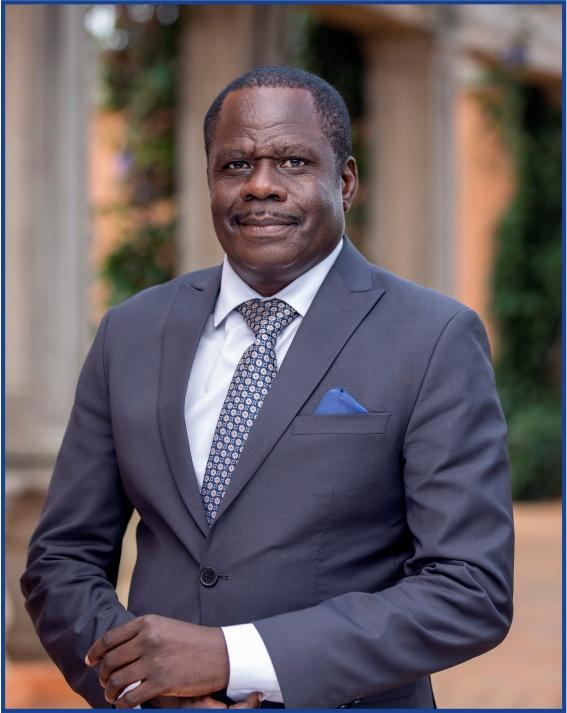
The StaffAdministration and CorporateAffairs Committee (SACA) of the Board is responsible for the following key areas:
• Overseeing the effective and efficient administration and management of the Fund by establishing appropriate policies regarding staff, administration, and corporate affairs
• Reviewing and recommending an appropriate organisational structure and staff establishment to ensure that it is resourced by competent and well-motivated staff to execute strategy
• Overseeing the management of corporate services such as marketing, public relations, transport, and records
During the FY2023/2024, SACAheld meetings where they considered several activities for recommendation to the Board.
SACACommittee's key activities in FY2023/2024 included the following:
• Recommendation to appoint the new substantive Managing Director and Deputy Managing Director
• Improved media tonality to 92% from 79% in the last FinancialYear
• Conducted a review of staff appraisals, salary reviews, and performance bonus recommendations
• Monitoring the organisational re-design implementation, roll-out and aligned it to the 2030 vision
• Contract renewals for senior managers, service awards and recruitment of the Head of Procurement and Disposal Unit
• Review and approval of the Brand and Donations Policy
• Reviewed departmental balance scorecards
• Monitoring of staff wellbeing and promotion of equality
• Talent management and reskilling of staff
• Product development and research such as the Fund's Smart Life project
• Promoted Digital Channels through communications campaigns
• Monitoring the Fund's communication through Financial Literacy awareness campaigns
• Monitoring customer satisfaction and experience
• Monitoring the marketing and branding of the Fund
• Reviewing quarterly updates received from Management
• Employee engagement improved from 86% to 89%
• Reviewed budgets for People and Culture and Marketing and CorporateAffairs FY2024/2025
• Review the proposed Executive Committee succession plan and the critical staff
Challenges during FY2023/2024:
• Anxiety among staff and stakeholders resulting from the organisational redesign process
• Negative tonality because of investigation by various Government agencies such as the Parliament of Uganda, IGG and the Uganda Police
Key focus for the following year FY2024/2025:
• Focus on the 10-year strategy Vision 2035 (50:50:95)
• Focus on redefining the Fund culture
• Building the right partnerships to enforce the provisions of the NSSFAct
• Strengthen job shadowing, secondment, and upskilling of staff to give staff more opportunities for growth
• Strengthen gender diversity at top management and senior management level through the Pathfinder programme
• Deliberate effort to develop women
• Reconstituting the new Enterprise and Growth Department with the right skills
• Monitoring and overseeing the new structural changes following the organisational redesign
• Completion of upskilling of staff because of the amendments in the NSSFAct Cap 230 and the new structure requirements
• Oversight of talent management updating the Fund's talent management and retention strategy
• Continue embedding aggressive talent managing and succession planning strategies at all levels to ensure we have strong successors for all critical roles
• Maintaining elevated levels of employee engagement
• Redefine the funds culture
• Explore new areas of investment
• Reskilling and re-aligning staff towards the 2030 vision



In aligning to King IV principles, the Fund considered the formalisation of a Governance and Nomination Committee during the reporting period, and it is confident that the current governance structures have sufficient oversight of the following responsibilities:
NSSF Board Committee oversight
Staff and CorporateAffairs Committee
Audit and RiskAssurance Committee
Audit and RiskAssurance Committee
Investments and Project Monitoring Committee
Staff and CorporateAffairs Committee
Staff and CorporateAffairs Committee
Responsibilities
Social and economic development
• Anti-corruption and bribery
• Staff wellness
• Human rights
• Promotion of equality
• Anti-money laundering
Ethics
• Monitoring of reported ethics cases and investigations
Environment
• Responsible consumption
• Impact of Fund operations on the environment
• Impact of investee companies on the environment
Stakeholder engagement and management
• Relationships with key stakeholders both internal and external
Sustainability and community development
• Development of communities through CSI activities
The Board is committed to continuous improvement and evaluates its performance.The Charter stipulates that the Board of Directors will conduct evaluations to determine whether the Board, its committees and members are functioning effectively in terms of discharging their mandate as per the Board Charter and in line with leading practices on corporate governance.The Board evaluates its performance through a combination of both internal peer and external facilitated assessments.
In the year under review, the Board evaluation was conducted by the ICGU Institute of Corporate Governance and internally, performance reviews were conducted by the Board Chairperson and Committee Chairpersons.The evaluation report highlighted the Fund's robust governance framework, effective corporate flow and communication, visionary leadership by the Board, and a strong understanding of the Fund's vision, mission, and values, as well as proper meeting management procedures.The evaluators recommended the following areas for improvement:
Recommendation
Succession planning should be reviewed periodically and should provide both succession in emergency situations and succession over the long term.
The Board to institute a code of ethics and policy to address violation of the code.
The need for periodic evaluation at least twice in a board tenure and addressing shortfalls identified.
There is need for a solid meeting between the InternalAuditor and theAudit and RiskAssurance Committee without management.
Need for a Governance and Nominations Committee.
Status
An external consultant has been appointed to advise further requirements over and above what management are proposing.
Done.
Evaluations will be undertaken at least once every year
Implemented.
Discussions are still ongoing regarding establishment of an independent Governance Committee to oversee succession planning of the Board and ESG issues.
Management, led by the MD, has the authority to manage and control the day-to-day affairs of the Fund in relation to matters other than those reserved for the Board.
We have robust processes in place to ensure that the delegation flows through the Board and its Committees to the MD and EXCO into the organisation.At the same time, accountability flows upwards from the Fund to its members.This process helps to ensure alignment and open communication with our members and all our stakeholders.
The Chairman, Dr. Peter Kimbowa, is an Independent Non-Executive Director and was appointed on 1 September 2021. His term ended on 31August 2024. The Chairman's role includes:
• Leading the Board and ensuring overall effectiveness, operating to the highest governance standards
• Encouraging a culture of openness and debate to foster a high-performing and collegial team
• Ensuring strategic issues, members and relevant stakeholder views are regularly reviewed, understood and responded to
• Facilitating the relationship between the Board and the MD and providing oversight, guidance, advice and leadership
• Ensuring control over the quality and timeliness of information flow between the Board and Management
• Setting agendas for meetings of the Board that focus on the strategic direction and performance of the Fund's business
• Ensuring that adequate time is available for discussion on all agenda items
• Leading the Board and individual Director PerformanceAssessments
• Speaking and acting for the Board and representing the Board to members
The MD is the Chief Executive Officer of the Fund and is subject to the NSSFAct (amended) and to the general control of the Board on matters of policy, responsibility for running the day-to-day business of the Fund, general management, administration, and organisation of the Fund. He also ensures the strategies and policies set by the Board are implemented.The MD, PatrickAyota, is the only Executive Director (ex officio member) on the Board and has been a Board member since December 2022.

The Corporation Secretary, Ms.AgnesTibayeita Isharaza was appointed in the role since 1April 2019.Appointment of the Secretary to the Fund is exercised in line with Section 42 of the NSSFAct a. In addition to any other functions conferred upon her by the Minister and the Board, the Corporation Secretary has the custody of the seal of the Fund and is responsible for:
• Ensuring crucial information flows within the Board and its Board Committees and between Management and the Board
• Facilitating the orientation and professional development required by the Board
• Taking minutes of the meetings of the Board and any of its Committees and Subcommittees
• Keeping the records of all transactions of the Fund
• The provision of legal advice on all Fund activities
• Advising the Board on all governance matters
• Keeping the Board aware of relevant changes in legislation and corporate governance best practice
As of 1 July 2022, the title of the Corporation Secretary changed to Chief Legal Officer/Corporation Secretary. Responsibilities and accountabilities remain the same.
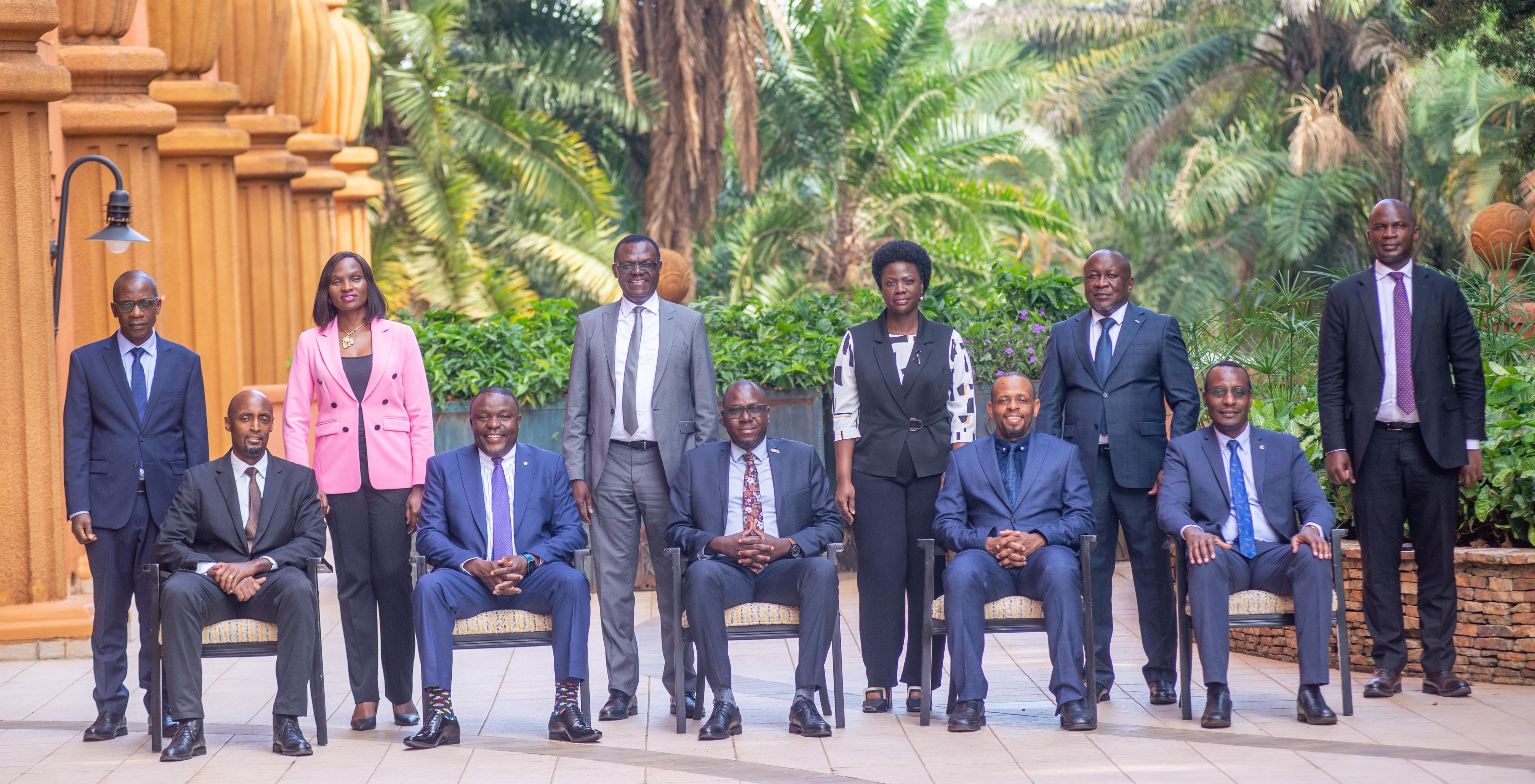
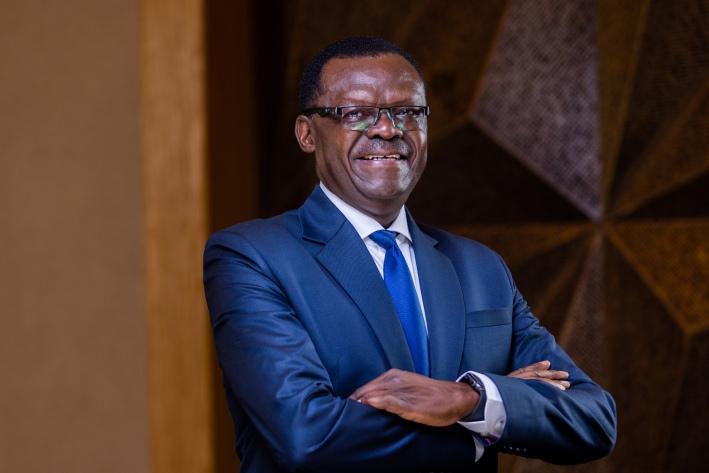
Mr PatrickAyota
Managing Director
Appointed July 2011 CFO
November 2017 Deputy MD
December 2022Acting
Managing Director August 2023 Managing Director Tenure 13 years
Qualifications
• CPA(U) - Certified Public Accountant of Uganda
• MBA - University of South Carolina, USA
• Bachelor of Science Degree in Finance - Liberty University, Virginia, USA
• CPA - Georgia USA
Expertise
• Strategy formation and execution
• Innovation
• Financial reporting and accounting
• Taxation
• Leadership
• Project management
• Financial Analytics
Board memberships
• Chairman of the Board of New Vision Group
• Non-Executive Director Housing Finance Bank
• Board Member ICPAU (Quality Assurance)
Other memberships
• League of East African Directors (LEAD)
• President ISSA focal liaison office East and Central Africa

Mr. Gerald Paul Kasaato Chief Investment Officer
Appointed April 2014 Tenure 10 years
Qualifications
• LLB(Hons) Nottingham Trent University
• CFA, USA - Charter Holder
• Chartered Accountant of the UK - a Fellow
• FCMI - Chartered Management Institute of the UKa Fellow
• CPA(U) Certified Public Accountant of Uganda
• Alumnus of the Harvard Business School (USA)
• Aresty scholar of Wharton Executive Programme, University of Pennsylvania, USA
• MBA in Finance University of Exeter, UK
• Master of Science (MSC) in International Finance and Investments - London Southbank University, UK
• Bachelor of Science (Hons) Degree in AccountingOxford Brookes University UK
Expertise
• Investment and portfolio management - of Multi Asset Class Portfolios
• Corporate and international finance
• Risk management
• Financial reporting and accounting
• Taxation and audit
• Strategy formation and execution
• Leadership
• Operations management
• Financial economics
• Project management
• Banking and trade finance
• Corporate governance
• Coaching
• Research

Ms.Agnes Tibayeita Isharaza, Chief Legal Officer/Corporation Secretary
Appointed April 2019
Tenure 5 years
Qualifications
• Executive MBA - Eastern and Southern African Management Institute (ESAMI)
• Post Graduate Diploma in Legal Practice - Law Development Centre (Awarded the Attorney General's Prize)
• Bachelor of Law Degree (Hons) - Makerere University
• Chartered Governance Graduate ( GradCG)
Other training
• Master Trustee Certification- Johannesburg School of Finance/ Jomo Investment
• Graduate - Female Future Programme - FUE/ Arbeidsforkininings Fond (AFF) Scandinavia, Retorisk Institut in Norway and Confederation of Norwegian Enterprises (NHO) Business School
• Board Masterclass Financial Times Non-Executive Directors Club, UK
• Being a Director - Institute of Directors, South Africa
• Several corporate governance, banking, and other technical trainings
Expertise
• Legal and compliance
• Governance
• Corporate and Board Affairs
• Banking, finance, pension, and capital markets

Mr. Stevens Mwanje Chief Financial Officer
Appointed November 2017 Tenure
Qualifications
• CPA - Institute of Certified Public Accountants of Uganda (ICPAU)
• Fellow of the Association of Chartered Certified Accountants (ACCA), UK
• MBA in Business Management - Heriot-Watt University (Edinburgh Business School)
• Post Graduate Diploma in Business ManagementUniversity of Leicester
• Bachelor of Arts Degree - Makerere University
Other training
Alumni of the Executive Programmes of:
• The Wharton School (University of Pennsylvania)
• The Gordon Institute of Business Science (University of Pretoria)
• Strathmore Business School (Strathmore University)
• Balanced Scorecard Professional - George Washington University College of Professional Studies
Expertise
• Strategy formulation and execution
• Coaching and mentoring
• Financial reporting and accounting
• Sales and marketing
• Taxation
• Operations management
• Leadership
• Change management
• Project management


Mr. Geoffrey Waiswa Sajjabi Chief Commercial Officer
Appointed January 2010
Tenure 14 years
Qualifications
• FCCA - Fellow of the Chartered Association of Certified Accountants (ACCA), UK Certified Public
• Accountant (CPA), Uganda
• MBA - Makerere University, Kampala
• Bachelor of Commerce Degree in AccountingMakerere University Kampala Diploma in
• Business Studies - Makerere University Business School, Kampala
Other training
• Alumnus of the Strathmore Business SchoolExecutive Leadership Programme, Nairobi Kenya
• Corporate Governance
Expertise
• Auditing
• Accounting
• Finance
• Leadership and management
• Governance
• Risk management
• Coaching and mentoring
Appointed November 2017
Tenure 7 years
Qualifications
• Diploma for Social Security Managers-International Training Centre - ITCILO Turin Italy (Ongoing)
• MBA - Heriot Watt University UK
• General Management Programme - Gordon Institute of Business Science - University of Pretoria
• Executive Leadership Programme - Strathmore Business School Nairobi Kenya
• Administrative Officers Law Certificate - Law Development Centre Kampala
• Bachelor of Arts - Makerere University Kampala
Other Trainings
• CEO Apprenticeship Executive ProgrammeStrathmore Business School Nairobi
• Balanced Scorecard Professional - George Washington University College of Professional Studies and Balanced Scorecard Institute Expertise • Leadership
Strategy formulation and execution
Project management
Customer service • Operations management • Procurement, disposal, and contract management • Process re-engineering • Job evaluation
Business development • Sales
Compliance

Ms. Rhona Kyomuhendo
Ag. Head Procurement & Disposal Unit
Appointed September 2023
Tenure 10 Months Qualifications
• MSc. Procurement & Supply Chain Management Makerere University
• Graduate Diploma in Procurement and Logistics Chartered Institute of Purchasing and Supply UKMCIPS
• Bachelor's degree in Procurement & Logistics Management - Kyambogo University
Trainings
• Certificate in Senior Leadership ProgrammeStrathmore University
• Leadership development Certificate Female Future Programme nominated by ILO as one of the best practices of Gender Equality - Federation of Uganda Employers

Mr. Edward Senyonjo Chief Risk Officer
Appointed

Arimi Barbra
Appointed December 2014
Tenure 9 years
Qualifications
• Member of the Chartered Institute of Marketing (CIM)
• Member of the Chartered Institute of Public Relations (CIPR)
• MBA - East and Southern Africa Management Institute
• Bachelor of Commerce - Makerere University
Certified Risk Manager (CERM) • ISO 22301: 2019 BCMS Lead Implementer
GMP Gordon Institute of Business Science, South Africa
BCOM, Makerere University, Uganda Expertise • Enterprise Risk Management (ERM) strategy
ERM implementation
Corporate governance
Business continuity management
Crisis management and disaster recovery
• Risk modelling, scenario analysis and stress testing
Board Roles
• Board Member DFCU Group
• Board Member for CEO apprenticeship
Other Training
• Global Executive Development Programme - Gordon Institute of Business Studies CEO
• Apprenticeship Programme - Strathmore Business School and CEO Summit Uganda
• International Module for the CEO apprenticeship programmeGordon Institute of Business Studies
• Executive Leadership Programme Strathmore Business School
• Leadership Development Future Female Programme Federation of Uganda Employers
• Balanced Scorecard professional Certification - Balanced Scorecard Institute
• Reputation and Crisis Management
• Strategic Brand Marketing - University of Cape Town
• Training of Trainers UMI
• Entrepreneurial Branch Operations World Savings Bank Foundation for International Cooperation
• Corporate Governance - ICGU
• Branch managers training - World Savings Bank Institute and Belgium Technical Cooperation
Expertise
• Marketing strategy
• Public relations
• Brand Management
• Corporate Social responsibility
• Product development
• Research
• Sales force Management
• Crisis Management
• Events Management

Mr Alex Rumanyika Kalimugogo Head of Strategy & Performance
Appointed August 2022
Tenure 2 years
Qualifications
• Masters, Business Administration, USIU-Africa
• Bachelor of Commerce Degree; Makerere University
• Balanced Scorecard Certified Specialist
• Public Private Partnership Certified Specialist
• Strategic Management and Performance Management Systems Certified Practitioner
• Performance Measurement Process Certified Practitioner
• Venture Development and Digital Transformation Certificate - University of Virgina
• Leading Transformations, Managing ChangeMacquarie University
Expertise
• Strategy Development & Performance Management
• Innovation Management
• Programme Management
• Intrapreneurship
• Venture Building
• Corporate Finance
• Microfinance
• Strategic Leadership & Change
• Public Sector Reform
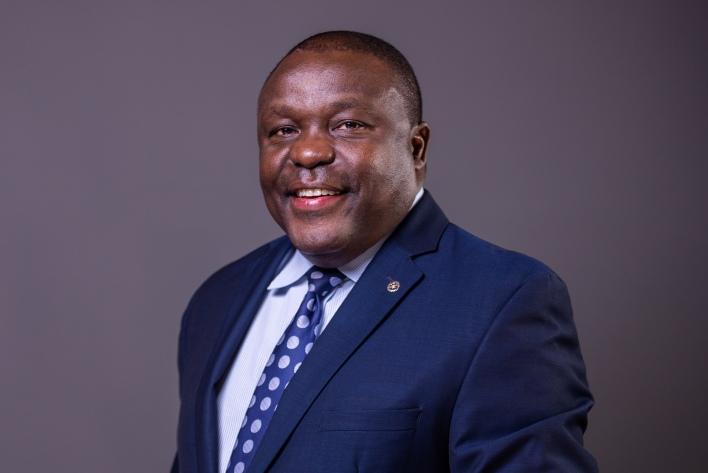
Mr. Milton Steven Owor
Chief People and Culture Officer
Appointed February 2017
Tenure 7 years
Qualifications
• Professional Executive Coach, Coach Masters Academy, Singapore
• MBA - University of Leicester, UK
• Bachelor of Social Sciences degree (Hons)Makerere University
Other Training
• Global Business Leadership Certification, INSEAD, France
Expertise
• People leadership
• Strategic talent management
• Change management
• Executive leadership development
• Reward and compensation
• Executive coaching

Appointed
Qualifications
• Masters in data science - Eastern University United States
• BSc Mech Eng. Makerere University
• MBA - Makerere University
• Six Sigma Black Belt-American Society of Quality
• Certificate in digital financial services - Tuft University
• Certificate in data science - Analytics Vidya • Project management by numbers - Shell Academy
Emergent change leadership - Shell Academy
ACCA (Partial)
• Strategy
Cyber security
Account management
Financial product and channel design
Business intelligence • Coaching
Failure mode and effect criticality assessment
Project management Mr.
Effective
The Board of the Fund embodies the principles of accountability, ethics, and integrity, ensuring all actions are in the best interests of stakeholders. Upholding the Fund's values, we have committed to ethical and honest practices, which are crucial in fostering trust in our business dealings.Aformal ethics policy and code of conduct are in place, alongside resources to reinforce our ethical standards and investigate any reported concerns, supported by a robust Whistleblowing Policy
To preempt conflicts of interest, Directors are provided the opportunity to declare any potential conflicts at the start of each Board meeting. Our governance framework mandates clear disclosures and regular Board evaluations to maintain ethical decision-making.An external law firm, SIGNUMAdvocates, manages the whistleblowing process, allowing for independent review.
Sustainability is a strategic priority, with initiatives reflective of selected UN SDGs and informed by our environmental management policies.
We regularly review Committee terms of reference and formalise plans for improvement based on audit findings. InternalAudit plays an important role in the enforcement of our ethical culture, monitoring, and investigating reports of unethical behaviour

We believe in having a diverse leadership team regarding experience, skills, tenure, geographical expertise, professional background and gender as illustrated here
Annually, we undertake environmental risk assessments and are dedicated to reducing the consumption of energy, paper, and water and adhering to local waste management regulations. OurAudit and Risk Committee oversees policy and code compliance, and our HR manual embodies our ethics to inform and guide staff behaviour, all part of our commitment to governance that is both responsible and sustainable.
Sustainability is an integral part of our DNA, reflected in our leadership approach that emphasises creating value for stakeholders and society at large.
We are intent on enriching our communities and advancing education, health, financial literacy, and environmental wellbeing through our Corporate Social Investment (CSI) initiatives.These efforts align with our commitment to the Sustainable Development Goals (SDGs), particularly those focusing on ending poverty, , achieving gender equality, promoting decent work and economic growth, reducing inequalities, supporting sustainable cities, promoting peace justice and strong institutions and partnerships for the goals.

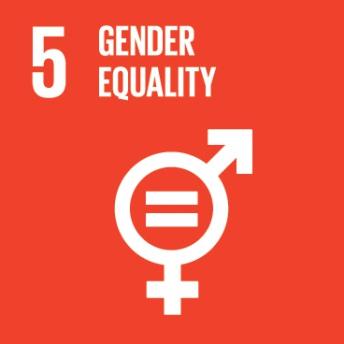

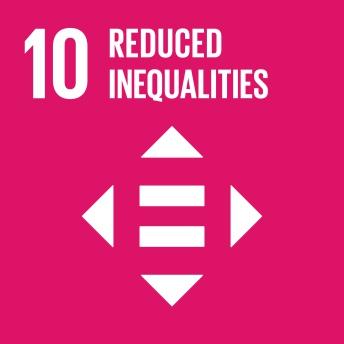

The Fund operates with accountability and integrity, upholding sustainable business practices and fostering development that benefits the environment, our employees, and the community At the NSSF, we apply our expertise in business, policy, and data, as well as our financial resources, to foster an inclusive recovery from economic setbacks, enhance access to opportunities for economic advancement, and spearhead solutions for sustainability and climate action.
Sustainability governance is embedded in our organisational structure, managed by the Board StaffAdministration and CorporateAffairs Committee to ensure rigorous oversight and strategic direction of our sustainability endeavours. In addition, the Investments and Project Monitoring Committee (IPM) takes the lead in the Fund's responsible investing approach, ensuring our investment policy and strategy requirements are executed and that we continually support ESGcompliant companies.
SACAreport
ARC report
Responsible investments (KIV P17)
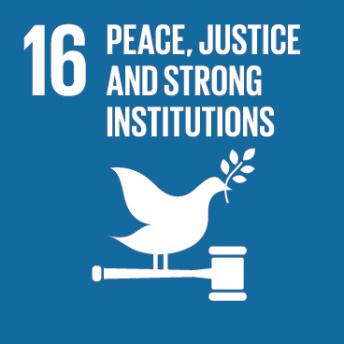


16
17
As a prudent institutional investor, we are committed to ensuring that responsible investment standards guide our decision-making, thereby promoting sound governance and fostering value creation by the companies in which we invest.
InvestmentApproval Process
The investment of member funds is authoritative and deliberate, requiring Board approval in alignment with the Minister of Finance, Planning and Economic Development, as stipulated by Section 30 of the NSSFAct. Our focus is on mature markets known for their predictable returns, aligning with prudent investment philosophies.
Growth andAssetAllocation
The pursuit of growth is managed through a strategicAllocation ofAssets policy, formulated under our comprehensive investment policy to balance prudent decision-making with the desire for consistent member returns.
Investment Oversight
The Investments and Project Monitoring Committee (IPM) takes the lead in the Fund's responsible investing approach, ensuring our investment policy and strategy are executed as intended and that we continually support ESG-compliant companies.
Responsible Investment Policy
Our responsible investing philosophy is encapsulated in a Board-approved investment policy, which institutionalises a formalised investment strategy and underscores our commitment to responsible investment practices.
Monitoring and Review
The Board actively monitors responsible investments through:
• In-depth consideration of investment proposals in consultation with the relevant Minister
• Aquarterly review of real estate, equities, and fixed income performance against established targets
• Biannual performance evaluations of Fund Managers, focusing on their adherence to our investment standards and targets
• Incorporating ESG considerations in investment decision-making, reflecting our commitment to responsible and sustainable investment practices
• Regularly updating the Fund's strategic asset allocation, ensuring it remains responsive to market dynamics and aligns with our long-term investment horizon
By implementing these measures, we ensure our investments not only contribute to the financial growth of the Fund but are also aligned with the broader principles of sustainability and corporate responsibility
Read more in the Chief Investment Officer's Business Review on page 106 of the Integrated Report
Report

Stakeholder relationships
Recognising the significance of incorporating stakeholder perspectives, we emphasise a stakeholder-inclusive approach that harmonises their needs, interests, and expectations with the long-term well-being of the organisation.
Continuous Stakeholder Engagement
We engage persistently with a diverse array of stakeholders - including government entities, the public, members, and service providers like bankers, custodians, administrators, and Fund Managers - to truly grasp and address their specific needs and expectations.
Strategic Partnerships and Relationships
Building and nurturing strategic relationships is a key focus for us, as it assists in managing societal expectations, mitigating reputational risks, and forming robust partnerships, crucial pillars for our business's sustainability
International Outreach and Innovation
Our dedication to global stakeholder engagement is exemplified by the establishment of a Liaison Office, which coordinates International Social SecurityAssociation (ISSA) activities across EastAfrica, liaises with theAfrica Social SecurityAssociation (ASSA) and the International Labour Organisation (ILO), and explores initiatives like a locally tailored Social ProtectionTraining Centre.
Ongoing Engagement and Value Evaluation
Evaluating the impact and quality we deliver to stakeholders is critical for addressing sustainability issues and informing our strategic direction.
Communication and Transparency
We maintain open and transparent communication channels founded on trust and a clear understanding of our stakeholders' expectations. By doing so, we foster sound relations that reinforce business sustainability, ethics, and organisational integrity aligned with the social, legal, and economic framework of the country
Stakeholder Engagement Governance
The StaffAdministration and CorporateAffairs Committee (SACA) is responsible for supervising the Fund's stakeholder engagement strategy, ensuring all engagement activities align with our policy and values.
Stakeholder Engagement Practices
• Periodic reporting of engagement activities to SACA
• Conducting stakeholder engagement surveys
• Adhering to a Board-approved Stakeholder Engagement Policy
• Keeping a detailed register of stakeholder interactions
Feedback and Improvement
We closely review feedback obtained through stakeholder engagement surveys and develop targeted action plans to address identified areas needing improvement, demonstrating our commitment to continually enhance stakeholder relations.
Read more about stakeholder engagement
The Board is responsible for guiding the strategic direction of the Fund and has established a robust governance framework to empower management to meet its objectives, in line with the strategic plan set for completion by 2035.
The Fund's strategy is clearly articulated and includes a suite of Key Performance Indicators (KPIs) focused on long-term value creation.
To demonstrate our strong commitment to sustainability and responsible investment, we have formally integrated sustainability drivers into our strategy, highlighting our dedication to achieving our selected Sustainable Development Goals (SDGs) and making a significant environmental, social, and governance (ESG) impact.
Key elements of our strategic approach include:
• Acomprehensive ten-year strategic outlook informed by detailed strategic planning sessions conducted by the Board.
• Aholistic strategy that seamlessly integrates risk management, opportunity identification, and performance management processes.
• Sufficient budgeting and resource allocation to ensure strategic objectives are met effectively
The Board regularly evaluates the Fund's progress against the established strategic targets and the overarching strategic vision, ensuring ongoing alignment and responsiveness to emerging challenges and opportunities.
Read more on strategy and performance in the Integrated Report on page 37

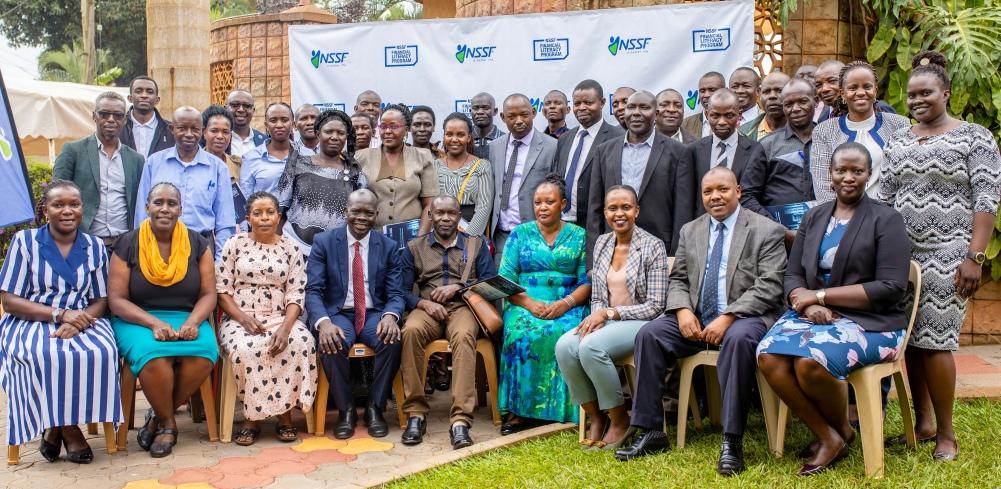




Key performance measures are aligned to the strategic objectives which translate into an organisational scorecard, cascading into individual scorecards.
The Fund continues to deliver excellent results in all metrics we measure ourselves against to ensure achievement of milestones and execution of strategy.
Board activities FY2023/2024 in support of strategy
The Board ensures that it provides transparency to key stakeholders, both in good and tough times, by providing timely and balanced information, and in so doing, promotes stakeholders' confidence in the business.The NSSF reports the material results of its performance internally and to stakeholders.The Board is responsible for providing reporting guidelines regarding quality and depth of reports, meaningfulness and relevancy to meet internal and external needs.
We strive to give effect to the reporting requirements of the various leading practice codes/guidance/frameworks and good practice in our industry, etc.
•
• Inadequate engagement with customers across the life cycle
•
• Improve options for financial
• Manual interventions in key customer processes
• Inadequate data quality for agile business decisions and deeper customer insights
• Progress maturity as a highperforming organisation
• Become a talent magnet and nurture top talent
• Improve staff

The Board and its Committees are supplied with complete and timely information from Management to enable the Directors to discharge their responsibilities.
The NSSF publishes an annual integrated report, sustainability report (ESG) and audited financial statements (see link) to ensure all stakeholders remain informed.The integrity of the information included in the reports is overseen by the Board, with specific areas of reporting reviewed and challenged for appropriateness by the relevant Board Committees, as well as our internal audit and combined assurance functions.The annual financial statements are audited by KPMG.

The Board ensures reporting of accurate, complete and balanced information in the Integrated Report.
Information related to the required disclosures appears in our Integrated Report.This includes matters relating to our strategy and detailed sections about our long-term goals, medium- to long-term targets, stakeholder engagement, governance approach and outlook.Additionally, our governance principles, including the King IV application are included in this chapter
Board training includes integrated reporting to deepen Directors' understanding of the requirements of the Integrated Reporting Framework.
IR training is available to new Board members.
The Board is tasked with ensuring the implementation of good corporate governance and the execution of effective risk management practices within the Fund.This is facilitated through the structured roles of various committees such as the Investments and Project Monitoring Committee, Finance Committee, StaffAdministration and CorporateAffairs Committee, and critically, theAudit and Risk Committee (ARC), which specifically oversees risk management and financial reporting integrity
Specific roles, responsibilities and accountabilities for risk management are defined.
See page 28 of the Integrated Report
Through a comprehensive materiality determination process material matters and emerging risks are identified which could influence the Fund's business model and its ability to create value in the short, medium, and long term.
This process is detailed further on page 28 of the Integrated Report
Risk management is an integral part of the Fund's operational activities, acting as both a safeguard and a tool for identifying opportunities for value creation. Given the importance of technology and data security, Cyber Security and Information Security risks form a core focus of the Fund's risk management strategy.
The implementation of the three lines of defence model divides responsibilities clearly between risktaking and risk-control functions, bolstering the overall risk governance structure of the organisation.TheARC plays a central role in risk and opportunity management and compliance, providing guidance on handling risks according to the Board's direction.

Key elements of the Fund's risk management approach include:
• Arisk appetite dashboard that considers both risks and opportunities in support of strategic and financial objectives
• An enterprise-wide Risk Management Framework and accompanying policy
• ACombinedAssurance Model to provide a holistic overview of risk control measures
The Board independently assesses top risks regularly, maintains oversight of the Strategic Risk Register, ensures the implementation of strategic projects, and reviews summary reports from both theARC and Finance Committee.This multi-faceted oversight ensures that risk management remains a cornerstone of the Fund's governance and strategic decision-making processes.
The governance of technology and information at the Fund is rooted in the Board Charter, where the Board has the key role of overseeing the Information andTechnology Policy, systems, and overall strategy.
The Finance Committee is mandated to assist the Board in fulfilling its oversight responsibility for technology governance, ensuring alignment with our strategic goals.
For governance, the Finance Committee takes the lead on IToversight, supported by a formal ITgovernance strategy and framework. Regular ITgovernance audits further solidify this commitment to secure and responsible technology management.
Aligned with its strategy for digitalisation, the Fund is heavily investing in information security to enhance the efficiency of its operations and communication, capitalising on automation and digital platforms.
At the heart of this technological advancement is theTechnology and Enterprise Solutions Department at NSSF Tasked with utilising technology to extend services, improve customer interactions, and bolster operational efficiency, the department's initiatives include digital expansion for social security, user-friendly digital interfaces, data analytics for customised services,AI integration for better efficiency and decision-making, and forming strategic partnerships for service innovation.
Detailed insights from the Chief Technology and Enterprise Solutions Officer can be found on page 54 of the Integrated Report.
We make use of the OctoPAS PensionAdministration System for efficient pension administration. Our commitment to upholding secure and stable ITservices is evidenced by comprehensive controls and regular security assessments, including penetration tests and vulnerability scans, to safeguard our systems and data.

The Fund is committed to legal and regulatory compliance, with a particular emphasis on adhering to prudential regulation.The Board oversees compliance governance through theAudit, Risk andAssurance Committee, which monitors adherence to laws, regulations, and best practices within the retirement benefits sector
To govern compliance and service delivery effectively, the Board has instituted comprehensive policies and processes.There is a continuous effort to monitor and proactively engage with regulatory changes and focal areas, ensuring that the Fund remains ahead of developments.
Acornerstone of the Fund's governance is the maintenance of the highest standards, including transparency, accountability, and fairness, to its members, regulators, and all stakeholders. Management plays an ongoing role in tracking the Fund's regulatory compliance, with quarterly reports provided to the Board for review.

The Board has endorsed a Compliance Management Policy and Manual to underpin the compliance infrastructure.This includes regular compliance monitoring to ensure that the Fund not only meets but also anticipates its critical legislative and regulatory obligations.

InternalAudit (IA) supports the Board and Management to execute their mandate by providing independent and objective assurance, thereby protecting and creating value for a better life.
InternalAudit provides an independent, objective, and continuous evaluation of the Fund's operations and system of internal controls.The function reviews, appraises and reports on.
a) The effectiveness and adequacy of internal controls, risk management and governance processes, and b) The reliability of financial and other management information.
The InternalAudit Charter approved by the Board of Directors, provides the framework that guides activities, purpose, authority and responsibility of the InternalAudit function.
IAreports functionally to the Board and administratively to the Managing Director
The annual risk-based IAaudit plan and budget are developed in consultation with Management and approved by theAudit and RiskAssurance Committee of the Board (ARC).

Issues raised in various audit assignments, are reported to both Management for remediation and to the BoardAudit Committee (ARC) for oversight.
InternalAudit makes value adding recommendations to Management and all remedial actions are followed up to completion and independently validated.
It is the Fund's commitment to extend social security coverage to more working Ugandans, while aiming to deliver sustainable value to the members and key stakeholders.The Fund has therefore developed strategies to enhance members' lives throughout their life journey and beyond retirement, while driving long-term profitability for the Fund.
The internal audit function performs work across the organisation, providing independent assurance, advice and insight to help the Fund accomplish its objectives by bringing a systematic, disciplined approach to evaluating and improving the effectiveness of risk management, control and governance processes.
InternalAudit in the Fund is well-structured and aligned to enterprise value creation.Achieving the Fund's objectives is the ultimate goal of everything internal audit does, particularly as a governance role independent of management, which ultimately affects all stakeholders.
Value creation initiatives and reporting, as with the creation and protection of enterprise value overall, require the Board, Management to support InternalAudit and work collectively to align with each other and the prioritised interests of stakeholders.
Our InternalAudit framework and InternalAudit strategic plan offer key features that we believe can greatly enhance internal audit's impact and value for the Fund.

By aligning internal audit's objectives with the Fund's purpose, accelerating organisational change and learning, and fully embracing digital technologies, internal audit is staying ahead of the curve and we continue to evolve the function to meet stakeholder needs. But, without a deep understanding of the key risks that matter, functional improvement alone cannot maximise the impact that InternalAudit can create.
In today's business environment, internal audit is keeping pace with the hastening speed, volume, and complexity of risks. The IAteam is currently implementing the internalAudit strategic plan that focuses on cross-team collaboration, data centralisation and documentation, workflow automation and leveraging on modern technology
As boards and management continue to grapple with dynamic risks, the need for audit to provide assurance and timely insights is more pressing than ever before. Resilience and agility have become our key attributes not only to survive but also thrive in the current dynamic environment.
Internal audit is playing a critical role in supporting the Fund to strengthen and maintain strong internal control and accountability systems by providing objective advice and supporting management to accelerate improvement in the governance, risks and controls landscape.
The implementation of a QAIPis to ensure conformance with the definition of InternalAudit, the Code of Ethics for internal auditors and theAuditing Standards.
Internal assessments include a comprehensive ongoing and periodic monitoring.The programme incorporates quality assurance processes in the stages of planning, engagement, and reporting.
On an annual basis, the function conducts and reports the results of the internal assessment toARC.
Independent and objective external quality assessment evaluates conformance of the internal audit with the InternalAudit Charter, Code of Ethics, and auditing standards.The procurement process for a service provider to conduct an external assessment is being concluded before the exercise can be undertaken within the quarter one of FinancialYear 2024/25.
The powers to appoint external auditors for Public Institutions (like NSSF) is vested in the Office of theAuditor General of Uganda (OAG). In line with Section 23 of the NationalAuditAct (2008), theAuditor General may appoint private auditors to assist him or her in the performance of his or her functions under thisAct.
Section 32(2) of the NSSFAct gives theAuditor General the mandate to audit its financial statements or by anAuditor appointed by theAuditor General.
Accordingly, theAuditor General appointed KPMG Uganda to conduct an annual audit of NSSF for the year ending 30 June 2024.The length of service of external auditors is determined by the appointing authority and the general practice has been for a duration of three years.
TheARC reviews the external audit plan and oversees the relationship between the internal and external auditors to ensure efforts are coordinated.
The Board ensures that assurance services and functions contribute to a robust control environment, reinforcing the integrity of information used for internal decision-making and external reporting.
The Fund employs a "three lines of defence" model, enabling Enterprise Risk Management, Legal and Internal Auditing teams to collaboratively provide a comprehensive view of risk, compliance, and internal controls.This model ensures the reliability of governance structures and thorough coverage of all assurance activities for both financial and non-financial information. Integral elements relevant to governance, risk management, and controls within the integrated report receive focused assurance, with all assurance providers working cohesively yet, importantly, without affecting the independence of InternalAudit.This avoids duplication of efforts and ensures complete coverage.
TheARC plays a vital role in overseeing the assurance processes, including internal and external audit planning, evaluating the results, and supervising the implementation of corrective actions. Quarterly reporting to theARC helps maintain transparent oversight.
The Board and Management review outputs from both internal and external assurance providers, ensuring that all necessary remedial actions are implemented to bolster the internal control environment.The link between these actions and their corresponding assurances are reflected in the Integrated Report for 2023/4 and theAuditors' report within theAnnual Financial Statements, thereby ensuring accountability and continuous improvement in the Fund's operations.
See page 28 for our combined assurance model in our Integrated Report

14
The Board upholds remuneration practices that are equitable, responsible, and transparent, aligning with strategic objectives to foster success in the short, medium, and long term.
The StaffAdministration and CorporateAffairs Committee, operating under the Board, oversees human resource policies that govern employment terms, remuneration, training, promotions, discipline, and other benefits.These policies are designed to be equitable and competitive, attracting and retaining top talent, encouraging a motivated workforce, while enabling a high-performance culture.
The remuneration framework is aligned with strategic KPIs to ensure performance is commensurate with individual and business success.The reward system acknowledges the need for sustainability and adaptability in a changing business landscape.
The governance of remuneration includes:
• Adherence to the Remuneration and Employment Policy
• Observance of the Non-Executive Director Remuneration Policy
• SACA's role in ensuring fairness and transparency in remuneration
• Routine remuneration reporting to SACA
• Benchmark assessments of remuneration standards
• Reporting to the Board by SACAon remuneration matters
The Board approves the business targets at the commencement of every fiscal year and conducts a thorough review of outcomes at the year-end.This review is crucial before making informed decisions on the awarding of incentives, ensuring that any rewards issued align with the organisation's and individuals' achievements.
Remuneration Report
SACAReport

The Fund conducts annual remuneration surveys to stay aligned with market compensation trends.This ensures our compensation practices are both equitable and compliant with market and regulatory standards.
Beyond remuneration, the Fund is committed to employee development. We offer tailored benefits to enhance skills and potential, which boosts earning capacity and career growth. Our extensive development opportunities include diverse training platforms, support for degree programs, and professional qualifications that benefit both the organization and personal growth.

Remuneration structure
Our compensation framework aligns with the Fund's strategic objectives, linking remuneration to individual and business performance.This approach fosters a culture of excellence, driving the realization of our strategic goals.
To attract and retain top talent, we conduct annual remuneration surveys to ensure competitiveness.This includes assessing performance against set goals, ensuring we attract and retain the best talent necessary for achieving the Fund's objectives.
The Fund's Remuneration Policy at a glance
Compensation components
The Fund's pay structure may include any or all the following: fixed pay, performance-based increments, and variable pay
Fixed pay
The Fund's fixed pay range is linked to an approved grading system, ensuring fairness, competitiveness, and internal equity
Performance based increments
Performance-Based Increments (PBI) link pay progression to individual performance assessments. Increments are consolidated into basic pay and vary based on appraisal results, grade positioning, and the pay increment budget.The PBI increases with performance and decreases as one's pay moves towards the maximum of the grade, as shown below.
administered responsibly

Variable pay
The Fund offers annual bonuses to qualifying staff, recognising contributions, retaining exceptional performers, and motivating staff. Bonus amounts are based on performance and overall contributions to the Fund's results.
Benefits
The Fund provides benefits in line with market and regulatory standards, including medical insurance, death benefits, a retirement scheme ("Staff Provident Fund"), an "Annual ServiceAward" for temporary staff, and a "Gratuity Scheme" for the Executive Committee (EXCO).
Recognition policy
The Fund acknowledges exceptional contributions through financial and non-financial awards to individuals or groups, promoting the Fund's objectives and addressing operational challenges.
Long service incentive
Long service awards recognise commitment and loyalty in 5-year bands, starting from 10 years of service.
Remuneration of statutory appointees
The remuneration for the Managing Director and Deputy Managing Director is based on the same criteria as other employees, with an annual performance review These packages are approved by the Minister of Gender, Labour, and Social Development.

All Non-Executive Directors are provided with a letter of appointment setting out their remuneration. Directors are appointed by the Minister of Gender, Labour, and Social Development for a three-year term, renewable once.
Non-Executive Directors receive a retainer for their service on the Board and a meeting attendance fee for Board and Board Committee meetings. Fees are paid monthly in arrears.There are no contractual arrangements for compensation for loss of office. Executive Director(s) do not receive any retainer or meeting attendance fee. In determining the remuneration of Non-Executive Directors, the Board considers the extent and nature of their responsibilities, and comparative remuneration offered by other major entities of a similar nature.
NSSF has achieved significant growth, reinforcing its role as a pillar of financial security for millions of Ugandans.As we chart our path forward, we recognise that our continued success depends on ensuring a sustainable future for our members, communities, and the environment.
Our commitment to sustainability is driven by a deepseated belief in creating shared value. By integrating ESG principles into our operations, we aim to enhance the well-being of our members, contribute positively to society, and achieve long-term financial stability
This section highlights our progress, challenges, and future aspirations as we work towards becoming a more responsible and sustainable organisation. Through sharing our experiences and insights, we seek to promote transparency, accountability, and collaboration with our stakeholders.
Our materiality assessment




As NSSF advances in its sustainability journey, setting clear, measurable goals is essential for driving progress and accountability These goals will guide our actions, ensuring they align with our commitment to creating shared value for our members, communities, and the environment. Building on insights from our materiality assessment, our goals will chart a course for becoming a more responsible and sustainable organisation.
Our goal-setting process is guided by the following principles:
• Materiality: Focusing on ESG issues with the greatest impact on our business and stakeholders, as identified in our materiality assessment.
• Measurability: Setting clear, quantifiable targets to track progress. For example, increasing female representation in leadership roles by 20% over the next five years.
• Time-bound objectives: Establishing specific deadlines for achieving goals, both short-term and long-term, to maintain momentum and sustain progress.
• Alignment with strategy: Ensuring that all goals contribute to our overall business strategy and sustainability vision.
• Stakeholder engagement: Involving relevant stakeholders in the goal-setting process to ensure our objectives are comprehensive and inclusive.
In the short term, we will focus on addressing immediate gaps identified in the materiality assessment, such as enhancing ESG knowledge across the Fund and improving stakeholder engagement. Long-term goals will concentrate on embedding ESG principles throughout our operations.
Our recent sustainability materiality assessment, conducted between March andApril 2024, serves as the foundation for our sustainability strategy.This assessment focused on the ESG issues most pertinent to the Fund, utilising an "inward impacts" approach. Input was gathered from team members and management, though limited responses and a low level of ESG knowledge among Board members revealed a significant knowledge gap within the Fund.
Key ESG topics identified include carbon emissions, diversity and inclusion, governance, and regulatory compliance, with an initial emphasis on governance-related issues such as ethics, compliance, and diversity There is also an increasing recognition of the Fund's role in social impact and community development.The assessment highlighted the need for improved training, stakeholder engagement, and enhanced governance frameworks to align our operations with our sustainability vision.
To address these challenges, we aim to:
• Conduct a comprehensive materiality assessment involving all relevant stakeholders to identify critical ESG issues
• Invest in ESG training and capacity building for employees at all levels
• Implement robust data collection systems to track ESG performance metrics
• Establish regular engagement channels with stakeholders to gather feedback and insights
• Integrate ESG considerations into core business operations and decision-making processes
These steps will strengthen NSSF's sustainability strategy and position the Fund as a leader in sustainable growth, enhancing our impact on stakeholders.
We acknowledge that achieving these goals requires collaboration across departments and with external partners. We will foster a culture of innovation, encouraging our teams to develop creative solutions to ESG challenges. By working together, we can accelerate progress and achieve our sustainability objectives.
Our goal-setting process will remain dynamic, evolving as we gather more insights and feedback. By setting ambitious yet attainable goals, NSSF reaffirms its commitment to leading in sustainable growth and ensuring a prosperous future for all our stakeholders.

Calculate the electricity efficiency improvements against the baseline year (FY22/23)
Calculate the reduction in water use comparing it against previous fiscal years
Calculate the percentage of waste disposal diverted to KCCApipelines
Keep track of paper consumption and calculate the percentage reduction against previous fiscal years
NSSF's vision of being the "Social Security Provider of Choice" is deeply intertwined with our commitment to sustainability. We believe that financial stability, environmental stewardship, and social responsibility are essential components of a thriving society.
By adopting environmentally responsible practices, we contribute to the long-term health of our planet and address risks associated with climate change. Our initiatives in water and energy efficiency, waste reduction, and promoting a paperless office reflect our commitment to reducing our environmental footprint.
Moreover, we understand the critical role of innovation and financial literacy in empowering our members and fostering economic growth. By investing in these areas, we enhance our members' financial well-being and support the broader development of our communities.

Our commitment to sustainability is evident in our focus on:
• Expanding social security coverage: Our Vision 2035 sets an ambitious goal of expanding our reach to a broader segment of the population, ensuring enhanced financial security for all
• Delivering sustainable value: Providing long-term benefits to our members while generating competitive returns
• Environmental stewardship: Reducing our environmental impact and supporting green initiatives
• Social impact: Contributing to community development and fostering an inclusive workplace
• Governance excellence: Upholding the highest ethical standards and promoting transparency, accountability, and integrity in all our operations Performance metrics


• Environmental
- Energy consumption: Reduce energy consumption by 20% over the next three years, using the previous fiscal year as a baseline
- Water consumption: Set a target to reduce water consumption by 15% within the next two years
- Waste management: Commit to diverting all waste from buildings to city pipelines in alignment with local waste management ordinances
- Paper usage:Achieve a 30% reduction in paper usage within the next year by advancing digital documentation and paperless practices
• Social
- Financial literacy: Increase financial literacy among members by providing educational workshops to 75% of members annually
- Member satisfaction:Aim to maintain an average satisfaction score of at least 95% in annual surveys
- Community impact: Establish and document the impact of community outreach programmes within the community
- Employee diversity and inclusion: Achieve a balanced workforce with a 50% distribution of male and female employees
- Occupational safety and health (OSH):Attain a 95% employee satisfaction rate regarding OSH measures, complete safety training sessions, and ensure prompt reporting of any incidents
• Governance
- Board diversity: Strive for at least 40% gender diversity in Board composition within the next two years
- ESG reporting:Achieve compliance with GRI Standards and provide updates on ESG performance data every six months
- Internal controls: Attain an average rating of 85% in internal audit and risk assessments over the next three years



To effectively integrate sustainability into our operations, NSSF will adopt a cross-functional approach, leveraging existing expertise and fostering collaboration across departments. Key initiatives include:
• ESG team formation: Establishing a dedicated ESG team to coordinate and drive sustainability initiatives
• Knowledge building: Investing in ESG training and capacity building for employees and the Board
• Stakeholder engagement: Fostering strong relationships with stakeholders to gather feedback and insights
• Data-driven approach: Implementing robust data collection systems to track ESG performance metrics
• Investment alignment: Integrating ESG factors into investment decisions and investee companies to promote sustainable investments
• Operational efficiency: Implementing energy-efficient practices, reducing waste, and optimising resource utilisation
• Social impact: Supporting community development initiatives, promoting diversity and inclusion, and enhancing employee well-being
• Governance enhancement: Strengthening ethical practices, improving transparency, and enhancing board oversight
Ongoing engagement with stakeholders is crucial for aligning NSSF's ESG goals with their expectations.Through surveys, focus groups, and online platforms, the Fund ensures active participation in decision-making processes related to ESG initiatives.This approach fosters transparency, builds trust, and ensures our strategies reflect the priorities and concerns of those we serve. By maintaining continuous dialogue, we can adapt to evolving stakeholder needs, ensuring that our ESG efforts remain relevant and impactful.
NSSF is committed to transparent and accountable ESG reporting, adhering to globally recognised frameworks such as the Global Reporting Initiative (GRI) and the SustainabilityAccounting Standards Board (SASB). Materiality assessments help us identify key ESG topics relevant to our operations, shaping our reporting practices and guiding our sustainability strategies.This alignment ensures that our efforts meet organizational goals and stakeholder expectations.
NSSF is dedicated to enhancing its ESG performance through regular audits, stakeholder feedback, and the adoption of emerging best practices. We foster a culture of innovation and sustainability across all levels of the organisation, encouraging employees to actively participate in ESG initiatives.This commitment to continuous improvement allows us to adapt to the evolving ESG landscape and maintain leadership in sustainable business practices.
